
Legal Market Talk: ESG is on the Rise
Some of Hungary’s leading legal minds give us their take on the country’s evolving market, including significant growth areas (with ESG to the fore), the level of business-friendly legislation, and the law-making process itself. 17
Central Bank Remains Cautious and Patient
It’s been a year since the MNB started its current rate-cutting cycle, lowering the base rate from 18%. Now it seems the trend might slow markedly, as the central bank is “in no rush.” 3
Hungarian Snappers in the United States
“Hungarian Photographers in America (1914-1989)” at the Museum of Fine Arts features the work of more than 30 pioneers. 37
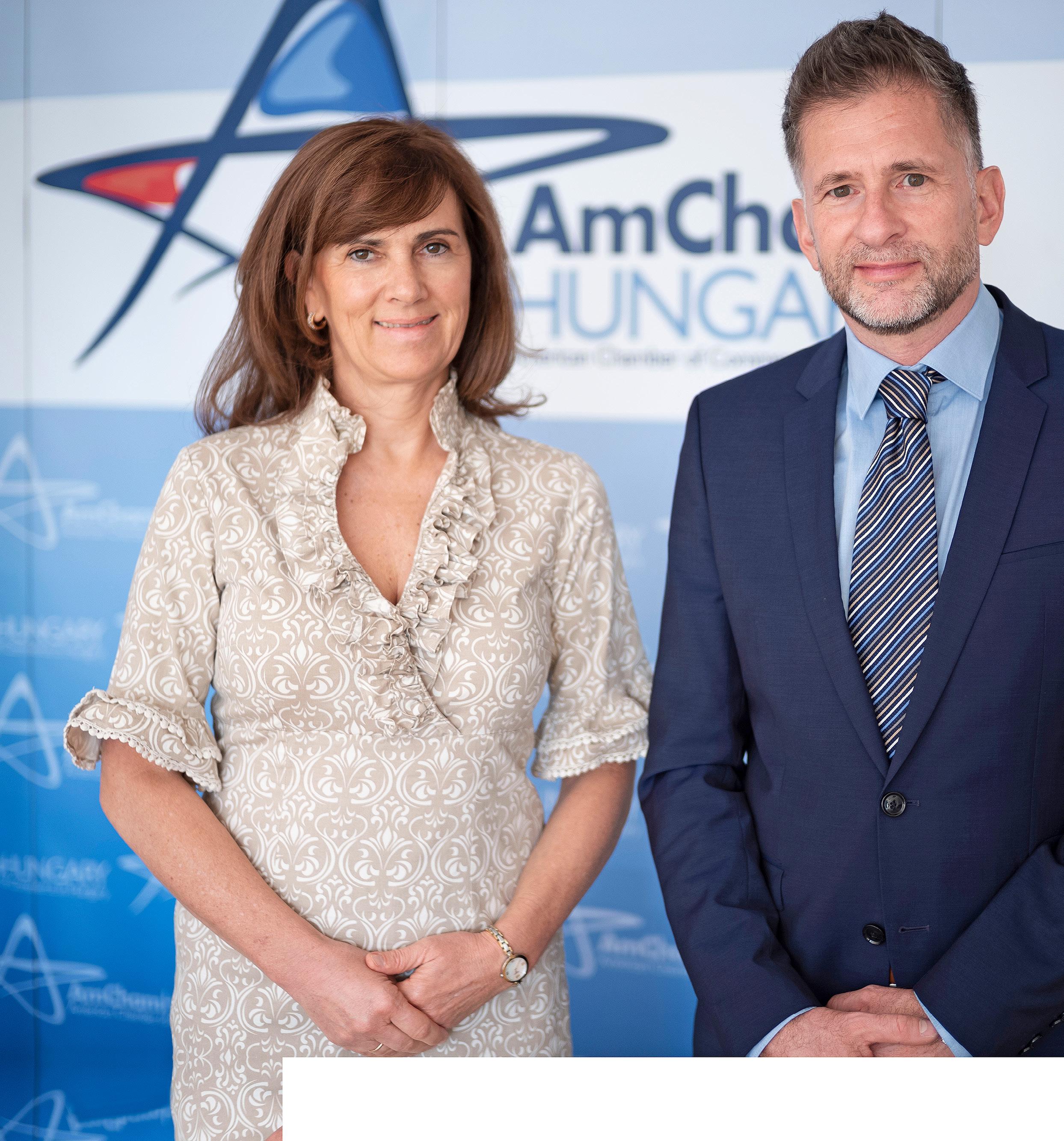
Taking the Long View
AmCham has released the 2024-25 edition of its 'Cooperation for a More Competitive and Sustainable Hungary.' Írisz Lippai-Nagy and Zoltán Szabó say it addresses factors vital for the long-term development of the economy and offers insights for strategic planning and decision-making. 13

Happy anniversary, DLA Piper Hungary! 35 years of local expertise with 20 years of global impact
Legal Services SPECIAL REPORT INSIDE THIS ISSUE YOUR INDISPENSABLE EVERYDAY COMPANION FOR BUDAPEST BUSINESS NEWS AND VIEWS SINCE 1992 | WWW.BUDAPESTBUSINESSJOURNAL.COM VOL. 32. NUMBER 11 | MAY 31 – JUNE 13, 2024 HUF 2,100 | EUR 5 | USD 6 | GBP 4
SOCIALITE BUSINESS NEWS SPECIAL REPORT
EDITOR-IN-CHIEF: Robin Marshall
EDITORIAL CONTRIBUTORS: Luca Albert, Balázs Barabás, Zsófia Czifra, Kester Eddy, Bence Gaál, Gergely Herpai, David Holzer, Gary J. Morrell, Nicholas Pongratz, Gergő Rácz.
LISTS: BBJ Research (research@bbj.hu)
NEWS AND PRESS RELEASES: Should be submitted in English to news@bbj.hu
LAYOUT: Zsolt Pataki
PUBLISHER: Business Publishing Services Kft.
CEO: Tamás Botka
ADVERTISING: AMS Services Kft.
CEO: Balázs Román
SALES: sales@bbj.hu
CIRCULATION AND SUBSCRIPTIONS: circulation@bbj.hu
Address: Madách Trade Center
1075 Budapest, Madách Imre út 13-14, Building B, 7th floor. Telephone +36 (1) 398-0344, Fax +36 (1) 398-0345, www.bbj.hu
THE EDITOR SAYS
IN PRAISE OF OPEN INNOVATION
If, as the cliché has it, no man is an island, it is equally valid that no man is all-knowing, which is why we generally hold omniscience is the sole reserve of Godlike beings, if all. Or, as the American business theorist Henry Chesbrough rather more eloquently said, “No one has a monopoly on knowledge the way that, say, IBM had in the 1960s in computing, or that Bell Labs had through the 1970s in communications. When useful knowledge exists in companies of all sizes and also in universities, non-profits and individual minds, it makes sense to orient your innovation efforts to accessing, building upon and integrating that external knowledge into useful products and services.”
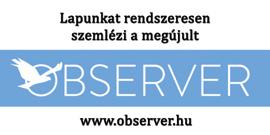
BBJ-PARTNERS





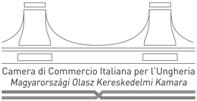
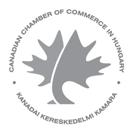
Why Support the BBJ?
• Independence. The BBJ’s journalism is dedicated to reporting fact, not politics, and isn’t reliant on advertising from the government of the day, whoever that might be.
• Community Building. Whether it is the Budapest Business Journal itself, the Expat CEO award, the Expat CEO gala, the Top Expat CEOs in Hungary publication, or the new Expat CEO Boardroom meeting, we are serious about doing our part to bind this community together.
• Value Creation. We have a nearly 30-year history of supporting the development of diversity and sustainability in Hungary’s economy. The fact that we have been a trusted business voice for so long, indeed we were the first English-language publication when we launched back on November 9, 1992, itself has value.
• Crisis Management. We have all lived through a once-in-a-century pandemic. But we also face an existential threat through climate change and operate in a period where disruptive technologies offer threats and opportunities. Now, more than ever, factual business reporting is vital to good decision-making.
For more information visit budapestbusinessjournal.com
Chesbrough lives by what he says. He coined the phrase “open innovation.” He is the educational director of the Garwood Center for Corporate Innovation at Berkeley Haas. In a nutshell, he argues that you do better by looking outside your organization, even by sharing your IP. Think open source software rather than proprietary coding.
I have long felt that this isn’t a concept that governments are naturally prone to embrace. They generally seem more keen on telling citizens what to do rather than assuming others might have something valid to contribute. Even Winston Churchill is supposed to have said, “The best argument against Democracy is a five-minute conversation with the average voter.” There’s something oddly pleasing about the curmudgeonliness of that quote, but sadly, it probably isn’t true. The International Churchill Society lists it in its “Finest Hour” section among “A Concise List of Attributed Churchill Quotes which Winston Never Uttered.” Ah, well.
But I digress. Like many other political parties, Fidesz has rarely given the impression of wanting, needing, or seeking outside help. But look around at the companies that comprise the membership of the various international chambers of commerce. Think of the quality of CEOs they can bring together. Indeed, simply scroll through the roll call of all those nominated for Budapest Business Journal’s annual Expat CEO Award. With all these brilliant business minds on tap, why wouldn’t you go to the well and drink deep?
As featured on our cover page, the American Chamber of Commerce in Hungary (other chambers are available) has recently published the 2024-25 edition of its “Cooperation for a More Competitive and Sustainable Hungary,” its annual recommendation package of steps to be taken to help improve the economy. These are serious suggestions to put Hungary in a better place. I’m not suggesting for a moment that AmCham complains it is not listened to. I am very much saying that I hope its advice is welcomed, read, internalized, and acted upon. Elsewhere in this paper, you’ll find our annual Legal Services Market Talk. It’s a deep dive that I will leave you to enjoy at your leisure. Still, one emerging thread is a suggestion that new laws should be given a longer lead time and that more comprehensive consultations should be made, especially among those affected by the changes or who may have relevant experience. That doesn’t sound like a particularly radical idea, now, does it?
Robin Marshall Editor-in-chief
THEN & NOW


In the black-and-white photograph from the Fortepan public archive, the first Hungarian cosmonaut, Bertalan Farkas, is seen waving to the crowd during a visit to his hometown of Gyulaháza (278 km northeast of Budapest by road) in 1980, the same year he went to space via the then-Soviet space program. In the color photograph, taken on May 28, 2024, Tibor Kapu, picked to embark on a mission to the ISS, receives a plaque from Orsolya Ferencz, Ministerial Commissioner for Space Research and Péter Sztáray, Minister of State for Security Policy and Energy Security at the press conference announcing the Hunor Hungarian Astronaut Program selection. For more on this, see page 8.
2 | 1 News www.bbj.hu Budapest Business Journal | May 31 – June 13, 2024
The Budapest Business Journal, HU ISSN 1216-7304, is published bi-weekly on Friday, registration No. 0109069462. It is distributed by HungaroPress. Reproduction or use without permission of editorial or graphic content in any manner is prohibited. ©2017 BUSINESS MEDIA SERVICES LLC with all rights reserved. What We Stand For: The Budapest Business Journal aspires to be the most trusted newspaper in Hungary. We believe that managers should work on behalf of their shareholders. We believe that among the most important contributions a government can make to society is improving the business and investment climate so that its citizens may realize their full potential. VISIT US ONLINE: WWW.BBJ.HU
IMPRESSUM
Photo by Béla Szalay / Fortepan
Photo by Róbert Hegedüs / MTI
1News •
macroscope
Central Bank Remains Cautious and Patient
It’s been a year since the central bank started its current rate-cutting cycle, lowering the base rate from 18%. Now, it seems the trend might enter a serious slow-down, as its deputy governor noted that the MNB is “in no rush.”
Investment in Hungary’s National Economy (2002-Q1 2024)
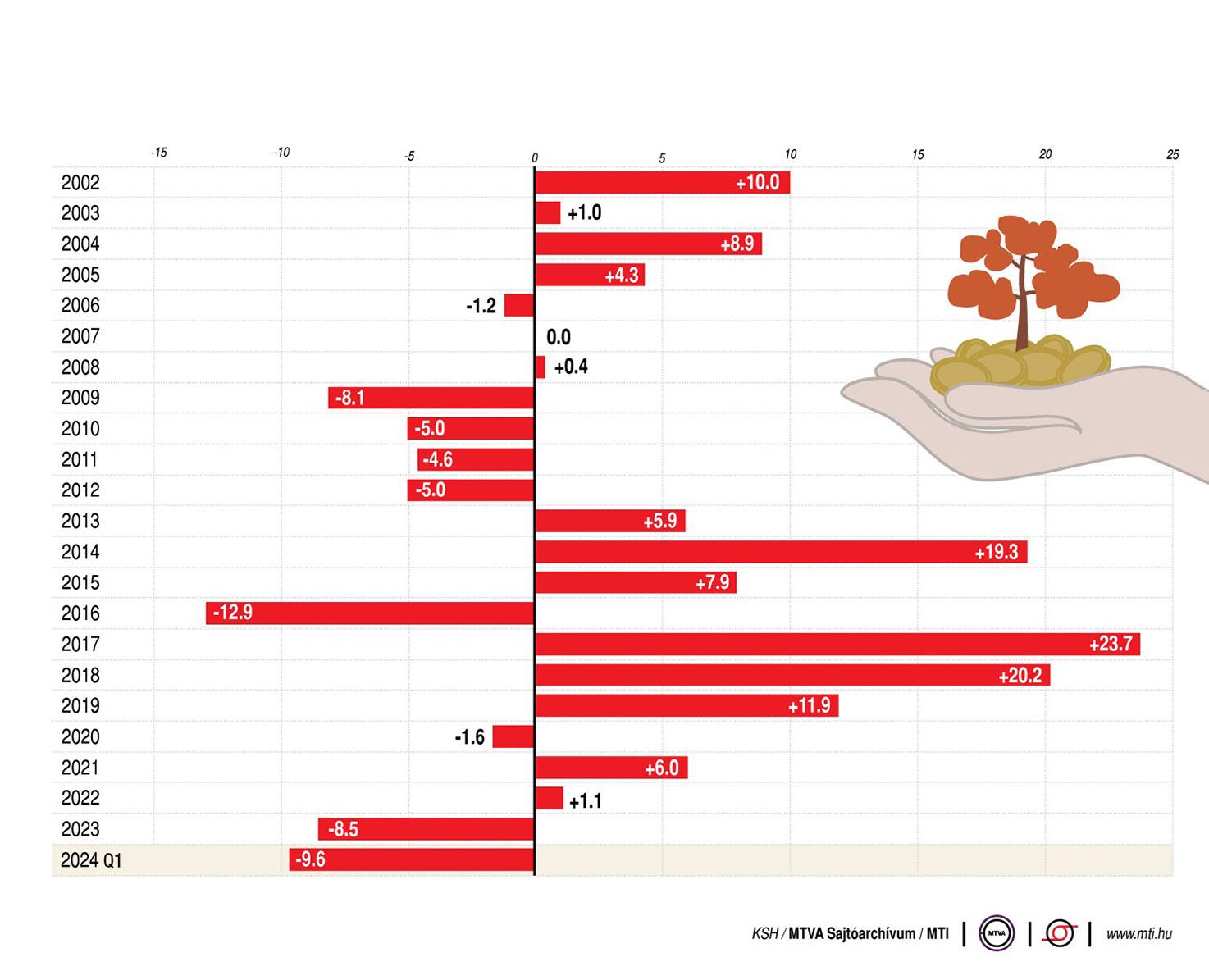
Source:
The Monetary Council of the National Bank of Hungary (MNB) cut its base interest rate by 50 basis points to 7.25% on May 21. In addition, it lowered the overnight deposit interest rate by 50 basis points to 6.25% and reduced the O/N secured loan interest rate to 8.25%.
At the press conference following the decision, MNB deputy governor Barnabás Virág spoke very cautiously about the second semester, emphasizing that “we are in no rush,” meaning that the second half of the year is expected to bring much smaller relaxation measures.
By the end of next month, the base interest rate will be 6.75-7% (that is, a cut of between 25 and 50 basis points may come in June), but Virág did not want to make any reference to the likely interest rate at the end of the year. He noted that the MNB will address this issue once the June inflation report has been published.
The cautious and patient easing of monetary conditions in Hungary continued in May; the size of the move was similar to that of April, ING Bank analysts noted in commenting on the move. Besides the base rate, the central bank maintained the symmetry of the interest rate corridor with 50 bp cuts at both ends.
“Given that market expectations of the upcoming decision were virtually unanimous this time around, the actual outcome did not contain any surprises.
The Monetary Council decided to recycle the messages from the previous rate-setting meeting. The ‘rinse and repeat’ process implies a hawkish stance across the board,” they wrote.
New Emphasis
While the press release and the background discussion following the decision did not contain any unexpected, eye-opening messages, ING analysts found two new elements of emphasis in the communication.
The first relates to the Federal Reserve’s monetary policy. Previously, the central bank focused on the timing of the expected easing cycle, but now the message is more about the expected divergence between the Fed and European Central Bank policy, which may lead to a persistently higher U.S. interest rate environment and possibly increased volatility in emerging markets, ING says.
“With this kind of change, the Monetary Council has made itself independent of the decisions of the Fed and the ECB while acknowledging that possible money market instability created by this divergence could cause headaches in the future,” they noted.
The second focus was on local (and global) services inflation and the risks to the inflation outlook, according to ING Bank. It notes that, while these issues had been highlighted in previous months, the Monetary Council put more emphasis on the sticky nature
of services inflation and the bad habit of backward-looking repricing patterns that limit the disinflation process.
Moreover, this pricing decision goes against the central bank’s desire to anchor inflation expectations at a lower level. The latest survey showed that the decline in inflation expectations has come to a halt, and it remains high at around 8%,
according to the MNB’s calculations, twice the upper limit of the inflation target tolerance band).
“All in all, the focus on services inflation risks and the divergence of key monetary policymakers now serve as risks that warrant the MNB remain on the side of caution and patience,” ING analysts assume.
‘Neutral’ Communication
“In our opinion, the press conference following the decision can be said to have had a neutral tone; the guidelines indicated in April have not changed substantially,” Márta Balog-Béki, senior macroeconomic analyst at MBH Bank, said in a press release. She believes that the central bank can reduce interest rates by another 50 basis points in June, and then in the second half of the year, it will only ease interest conditions to a minimal extent.
“Thus, we expect a basic interest rate of 6.25% by the end of the year. In the following months, the annual rate of inflation will gradually increase
again, and geopolitical tensions and the volatility of international investor sentiment also justify a prudent and cautious monetary policy.
In addition, market expectations regarding the Fed’s key rate also limit the MNB’s room for maneuver.
The markets are pricing in two interest rate cuts overseas, but compared to the Fed, a significant interest rate premium may be necessary in Hungary,” Balog-Béki opined.
Equilor analysts explained the elements the MNB will monitor in the coming period. Among international factors, disinflation is strong, but at the same time, inflation in services remains high. Geopolitical conflicts could increase energy market volatility and cause disruptions in global value chains.
“The Monetary Council has made itself independent of the decisions of the Fed and the ECB while acknowledging that possible money market instability created by this divergence could cause headaches in the future.”
The willingness to take international risks has improved, but, at the same time, the expected divergence between the monetary policy of the ECB and the Fed may result in an increase in volatility in emerging markets through the global interest rate environment.
Among the domestic processes, deputy governor Virág highlighted that, since the beginning of the year, inflation has been within the central bank’s 2-4% tolerance band, but domestic service inflation is also high, and the central bank will pay special attention to this in the coming months, Equilor thinks.
The improvement in the country’s risk perception was based on the revival of economic growth, the high current account surplus, and the historically high foreign exchange reserves. In the next period, the MNB will likely continue to focus on inflation, the international monetary policy environment, country risk assessment, and financial market stability, Equilor wrote.
www.bbj.hu Budapest Business Journal | May 31 – June 13, 2024
ZSÓFIA CZIFRA
EU and Hungarian Tensions Grow Over Ukraine Aid Roundup Crisis
Hungary will continue to maintain its current position of advocating for peace while avoiding any escalation of the war despite “enormous pressure,” Minister of Foreign Affairs and Trade Péter Szijjártó told reporters after meeting his European Union peers in Brussels on May 27.
Szijjártó made the comments after blocking the provision of an additional EUR 6.5 billion in support for Ukraine, comprising EUR 1.5 bln from the European Peace Facility for arms deliveries to Ukraine and a further EUR 5 bln from the Ukraine Assistance Fund. The move drew audible complaints from his colleagues.
Acknowledging the tense atmosphere at the meeting, Szijjártó said, “There is no reason to shout at us; we are on the side of peace.” While Budapest continually leans on its appeal for peace in blocking support for Ukraine, diplomats told international news wire Reuters that Hungary’s stance is often in line with Russia’s interests.
Indeed, Szijjártó noted that Hungary would not back another round of sanctions against Russia, arguing that it went against Hungary’s economic interests and could threaten the country’s steady supply of energy.
Hungary’s persistent obstruction of support for Ukraine and its reluctance to distance itself from Russia has become a running theme at meetings of Western allies, raising tensions that boiled over at the latest gathering.
“We always have [issues] with Hungary,” Estonian Foreign Minister Margus Tsahkna told German press
Ukraine

Vigorous Warrior 24, the world’s largest multi-national military medical exercise, took place in Hungary from April 28 to May 9. In the photo, a “wounded” man is transported to the Hungarian Defense Forces Role2 field hospital at the Bakonykút training area on May 7. The NATO drill involved 33 nations, deploying medical units and field hospitals, but also involved in planning and analysis. Vigorous Warrior is held every two years and will next be staged in Estonia in 2026. However, while happy to host the exercise, PM Viktor Orbán says he will not agree to any changes to NATO’s founding treaty.
agency DPA. According to Lithuanian Minister of Foreign Affairs Gabrielius Landsbergis, roughly 41% of resolutions by the EU on Ukraine have been blocked by Hungary. Before the meeting, he called out Hungary for effectively neutralizing any efficacy on the part of the European Union toward resolving the conflict.
Systemic Approach
“Almost all of our discussions and needed solutions and decisions by the EU are being blocked by just one country,” Landsbergis told reporters upon arriving at the meeting. “We have to start seeing this as a systematic approach towards any efforts by the EU to have any meaningful role in foreign affairs.”
The EU’s top diplomat, Josep Borrell, asserted that the bloc could not let its military support for Ukraine become dependent on “other decisions which have nothing to do with the specific issue,” suggesting that Hungary could be effectively using its veto as leverage to gain concessions from the EU over its own funding dispute of its own.
Since 2022, the EU has been withholding tens of billions of euros slated for Hungary in the 2021-27 budget cycle over concerns of democratic backsliding by the government of Prime Minister Viktor Orbán, who has been in power since 2010.
After continually insisting that he would withhold his approval for further
funding for Ukraine at an EU summit last year, Orbán changed his tune on Dec. 14-15 when the EU decided to release more than EUR 10 bln to Hungary on Dec. 13.
“I’m ready to make a financial deal on financial issues,” Orbán told the Mandiner weekly podcast the same day. Although he ultimately blocked the funding, he tacitly allowed the EU to start membership negotiations with Ukraine by leaving the room when the vote was taken.
Overstepping?
While EU officials accuse Hungary of impropriety, the Hungarian premier believes that the North Atlantic Treaty Organization is overstepping its bounds with a recent proposal. At a two-day meeting of NATO foreign ministers on April 3-4, General Secretary Jens Stoltenberg proposed a EUR 100 bln five-year package of military aid to Ukraine, which would involve assuming control over some of the coordination work of the Ramstein Group, a U.S.led ad-hoc coalition providing military equipment for Ukraine.
During an interview with Kossuth Rádió on May 24,
Orbán said that Hungary adhered to the founding treaty of NATO as a defense alliance, emphasizing that there is no mention of the organization performing military actions outside of NATO territory.
Orbán reiterated that Hungary does not wish to contribute arms or financing to the conflict. During the same interview, he also said that fears of an attack on NATO by Russia were unfounded, given the difficulty it has been experiencing in Ukraine.
“I do not consider it logical that Russia, which cannot even defeat Ukraine, would all of a sudden come and swallow the Western world whole,” said Orbán. “The chances of this are extremely slim.”
“The Russian military is fighting a serious and difficult war with the Ukrainians,” Orbán said. “If the Russians were strong enough to wrestle down the Ukrainians in one go, they would have done so already.” He also pointed out its relative weakness compared to the Western alliance.
“I do not consider it logical that Russia, which cannot even defeat Ukraine, would all of a sudden come and swallow the Western world whole,” said Orbán. “The chances of this are extremely slim.”
4 | 1 News www.bbj.hu Budapest Business Journal | May 31 – June 13, 2024
NICHOLAS PONGRATZ
Photo by Tamás Vasvári / MTI
Atenor Receives BakerStreet Occupancy Permit
The first 16,600 sqm phase of BakerStreet has successfully obtained its occupancy permit. The project, in South Buda, has been leased to E.ON Hungária Zrt., with the tenants scheduled to move in this June, according to the developer, Atenor.
projects could be delayed given the current market climate.
Office vacancy in Hungary has risen to 13.8%, according to Cushman & Wakefield. The pipeline for 2024 is 178,000 sqm, although
Atenor purchased the 5,700 sqm brownfield BakerStreet plot in 2019. After the demolition of the ex-bakery for which it is named, the construction of the office
Real Estate Matters
A biweekly look at real estate issues in Hungary and the region
building, with eight levels, terraces, a ground-floor restaurant, four floors of underground parking and an internal garden, started in 2021.
Simultaneously with the commencement of the construction works, Atenor signed an agreement to purchase an adjacent 8,300 sqm plot on Hengermalom út, on which the 24,500 sqm second phase of the project will be developed. Both phases are ESG-compliant, EU Taxonomyaligned, and have Breeam “Excellent” and Access4You “Gold” certifications, according to Atenor.
“The fact that BakerStreet I is 100% occupied before its handover obviously proves that there is still serious demand for modern, highly technical and aesthetic workspaces,” said Norbert Schőmer, the country director of Atenor Hungary.
Challenges in Creating the Right Work Environment
Employees demand more freedom and flexibility from the companies that employ them but also want more “experiences” in the office. This poses a double challenge for professionals involved in creating and maintaining the right working environment and for HR departments.
A new approach is needed to ensure employees do not feel compelled to work and perform at their best in the office. That was the conclusion of a joint meeting of the Workplace Environment and Facilities Management and HR committees of the American
Chamber of Commerce in Hungary, which reviewed the latest trends, best practices and solutions related to office use.
“Location is key, the office should be easily accessible, and its design should be tailored to the needs of the people working there, providing the right conditions for efficient working,” Valter Kalaus, managing partner of Newark VLK, told the AmCham event.
“Today, it is also a natural expectation that you should not have to travel long distances to reach services such as restaurants, cafés and shopping
Liget Center Vitrum Structurally Complete
Liget Center Vitrum by Wing will be handed over in its shell and core stage this fall. Vitrum is a near-zero energy building that will offer 2,200 sqm of office space over six floors. The boutique office development is located opposite the Városliget (City Park) and features a combination of Hungarian modernist art and architecture, according to the developer.
“With the completion of the Liget Center Vitrum building, the development of the Liget Center office complex has reached yet another milestone,” says Gábor Angel, deputy CEO of Wing responsible for offices.
“This is a truly unique development, including both
the construction of a completely new office building and the renovation of two office buildings listed as historic monuments. In line with our objectives, we have paid particular attention to aesthetics, quality and sustainability: Liget Center Vitrum is a nearly-zero energy building with extensive vertical green spaces. The building offers state-of-the-art technical features for tenants looking for exclusive office space downtown or even a suitable location for their entire headquarters,” Angel adds.
Liget Center Vitrum was designed by Tiba Architects Studio, while the general construction is being carried out by Workup.
facilities during a break or after work. Proximity to a gym or beauty or barber shop can be an added advantage,” he added.
Following his presentation, Kalaus answered questions from participants. The exchange clearly demonstrated that meeting the requirements for an ideal office is a complex task that needs to be tackled jointly by managers and HR staff if they want to ensure that employees see going in to a central office as an experience rather than a constraint and to avoid offices sitting empty. This is the most expensive solution from every point of view.
Sky bar Opens at Budapest Stadium Hotel
The panoramic Cloud IX sky bar of the Ibis & Tribe Budapest Stadium Hotel, developed by Wing, was inaugurated at a ceremonial event; the hotel now offers its guests a full range of services after its soft opening, according to the operator.
As part of Wing’s mixeduse Liberty development in District IX, the co-branded hotel occupies the top floors adjacent to office space. The Budapest Stadium Hotel has 332 rooms that are equally shared between the two brands, with the threestar Ibis offering complementing the four-star Tribe brand.
“As one of the leading real estate firms in Hungary and the region, we are committed to projects that represent high architectural quality and create long-term value. The Liberty reflects our ambition to create a dual-branded hotel with a wide range of services and an outstanding guest experience as part of an internationally acclaimed mixed-use development,” says Noah Steinberg, chairman and CEO of Wing.
OTP Bank has financed liberty, although the energyefficient, green property also received public funding through the Real Estate Fund sub-program of the Gábor Baross Capital Program. As a co-investor, the Hungarian Development Bank (MFB) also provided funds.

1 News | 5 www.bbj.hu Budapest Business Journal | May 31 – June 13, 2024
GARY J. MORRELL
The Liget Center Vitrum office development by Wing.
Hungarians Gear up for European and Local Elections on June 9
Hungarians and citizens of EU member countries resident in Hungary go to the ballot box next month amid a level of excitement usually reserved for parliamentary elections.
Popular Support of EP Party Lists (%)
Fidesz-KDNP's list, led by Tamás Deutsch
Jobbik's list, led by Péter Róna
LMP's list, led by Péter Ungár
DK-MSZP-Párbeszéd's list, led by Klára Dobrev
Momentum's list, led by Anna Donáth
MKKP's list, led by Marietta Le
Mi Hazánk's list, led by László Toroczkai
TISZA Party's list, led by Péter Magyar
MMN's list, led by Péter Márki-Zay
2RK's list, led by Gábor Vona
Other lists
No preference
When the history books on contemporary Hungarian politics are written, there will surely be one entire chapter on 2024 focusing on the meteoric rise of Péter Magyar and the previously almost unknown Tisza (Respect and Freedom) Party, of which he is vice-president.
Magyar, then aged 42, burst onto the Hungarian political stage in February after his ex-wife, Minister of Justice Judit Varga, resigned in the wake of the “pedophile clemency” scandal, which also ended the term of former President Katalin Novak.
In the subsequent four months, Magyar, who until that point had seemingly been a loyal, high-flying Fidesz-functionary with no public political profile, has transformed Hungarian politics.
Through a string of Facebook posts alleging government corruption, interviews with internet influencers, and non-stop campaigning around the country, Magyar has propelled Tisza (with himself heading the party’s EP list
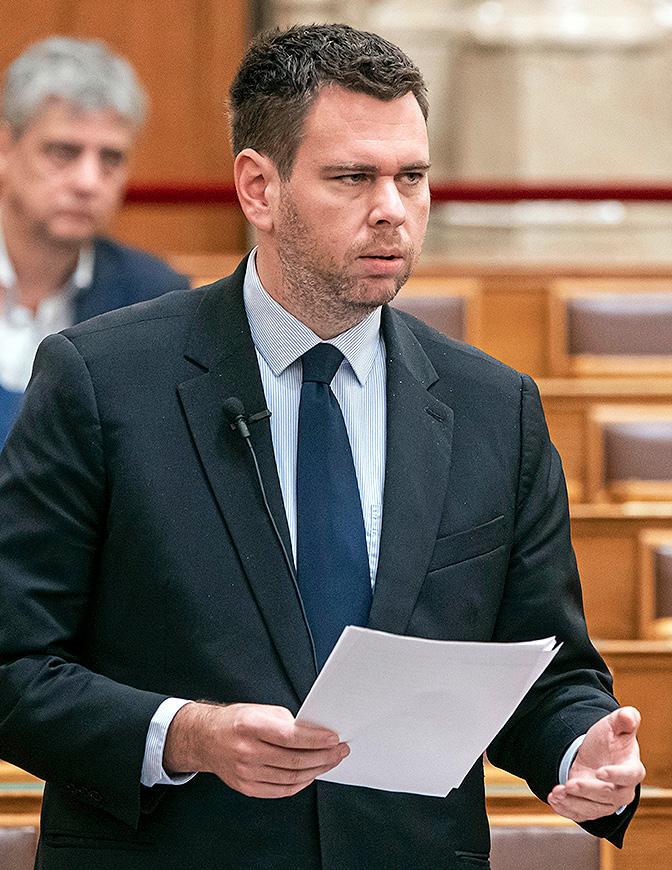
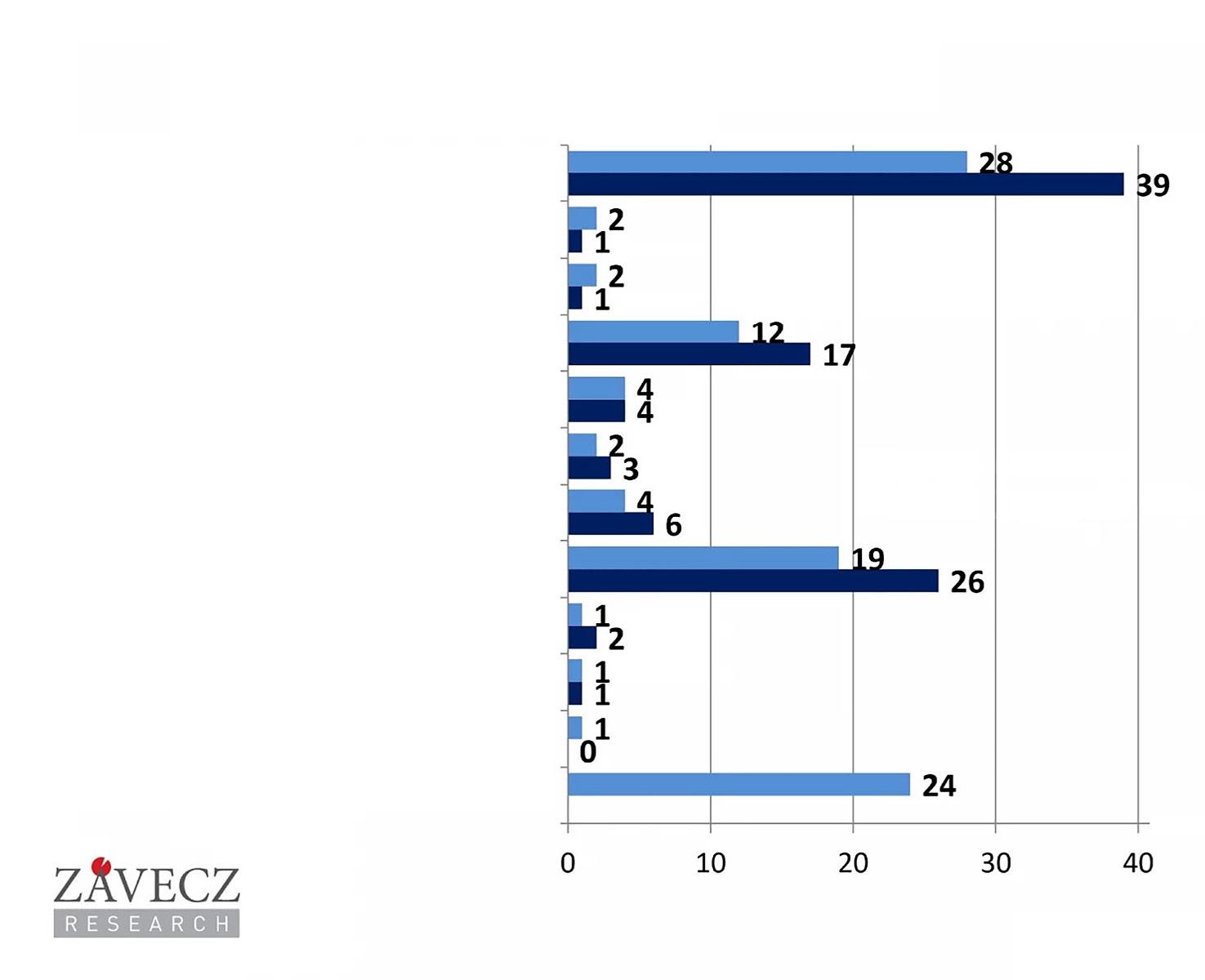
Voting-age
of candidates) into the country’s second most popular political grouping.
According to a survey in early May by Závecz Research, a respected Hungarian pollster, Magyar and Tisza had the support of
26%
of those committed in the EP elections, trailing only Fidesz, with its EP list headed by founding-party stalwart Tamás Deutsch, on 39%.
This rapid growth in support for Magyar is a “symptom of the deep crisis in Hungarian politics, as it not only reflects disappointment with the Orbán regime but also a complete disillusionment with the established opposition,” political scientist András Bíró-Nagy, director of Hungarian think-tank Policy Solutions, told the Budapest Business Journal
Swept Past
Indeed, en route to these political heights, Magyar has swept past the Democratic Coalition-led opposition grouping, headed by the DK’s Klára Dobrev (with 17% of decided voters) and also pushed the radical right Our Homeland down to 6%, perilously close to the 5% threshold needed for entry into the European Parliament. Somewhat counterintuitively, Magyar, who early in his campaign declared himself to be largely in tune with the Fidesz nationalistright philosophy (except for the corruption he alleges to have witnessed), has found the majority of his active supporters originate mainly from the liberal-left opposition camp. According to Závecz, this is particularly true for Momentum, the Two-Tailed Dog Party, and a grouping of minor and micro right-wing parties.
If the Závecz poll becomes a reality on June 9, it will likely result in Fidesz winning 10-11 MEP seats (down from 13 in the outgoing parliament), Tisza with four or five (all new), the DK-led alliance with four (against five previously), and Our Homeland with one.
Ágoston Mráz, founder and CEO of Nézőpont Institute, a rightleaning think-tank, predicts Fidesz support will achieve 45-47% of the vote (and 11 seats), with Tisza at around 5-7 seats. Going against most other pollsters, which put the jokecum-protest Two-Tailed Dog Party below the threshold vote, Mráz’ has them on 8%, potentially set to win two seats. In contrast, he sees the leftist Democratic Coalition alliance garnering “a maximum” of 15%
of the vote and winning just two MEP seats.
But both analysts agree that Momentum, with two MEPs in the outgoing parliament, and Jobbik, with one, are set to lose all representation.
Crucially, both pollsters have Fidesz still winning roughly 50% of the 21-strong Hungarian allocation

Incumbent Karácsony Favorite in Budapest City Mayor Race
After four and a half years at the helm in the Hungarian capital, Gergely Karácsony appears set to keep his position as Mayor of Budapest despite a formidable competitor in the person of Dávid Vitézy (an independent backed by LMP) and massive campaign support for the Fidesz candidate Alexandra Szentkirályi.
A study by pollster Publicus published on May 21 put Karácsony, a Párbeszéd (Dialogue)-Green member supported by the united opposition in 2019, with a morethan-comfortable lead of 46% voter support. This was twice that of
nearest rival Vitézy, at 23%, with Szentkirályi at 19%.
The Our Homeland candidate, András Grundtner, brought up the rear with just 3%, while 9% of respondents were undecided. However, from the start of this contest, speculation has been rife that Szentkirályi, who would inevitably face a tough battle in the liberal capital, would likely pull out of the race, leaving the contest open for Vitézy as a quasi-Fidesz combatant for the mayor’s position. (Vitézy served as head of the Budapest Transport Company (BKK) under Fidesz Mayor István Tarlós and, for
a short period, was a state secretary under a Fidesz minister in 2018.)
However, speaking to foreign journalists in late April, Vitézy denied being any kind of Fidesz “mole” or any collusion between himself and Szentkirályi. Stressing his track record as an expert in urban planning and transport, he said his program is based on “social housing and housing for public employees in the national education, health and police systems,” adding that there “has been no investment at all in the rental market or in public housing” in either the current or previous mayoral terms.
6 | 1 News www.bbj.hu Budapest Business Journal | May 31 – June 13, 2024
KESTER EDDY
© European Union 2022 –Source: EP
Photo by:
CC-BY-4.0:
Photo by: MTI/Zsolt Szigetváry
population Committed voters certain to pick a party list
Tamás Deutsch
Dávid Vitézy
Who can Vote for What?
EU Elections
The elections on June 9 consist of two entirely separate contests. First, eligible Hungarian citizens and resident EU citizens who have registered their intention of voting with their home country may vote in the European Parliamentary election for the 21 MEPs representing Hungary.
Voters can choose from parties that field “party lists” of candidates (see box). However, if the latest opinion polls prove accurate, only a handful of parties (or party alliances) will garner
of MEPs, a position that would be the envy of many EU governing parties.
However, for the Fidesz party leadership, such have been their expectations since 2010 that any voter support below 45% of the total would be viewed as a poor result, says Policy Solutions’ Bíró-Nagy.
Lacking Direct Power
Equally, whatever the Tisza success in the EP elections, it will have no direct
more than the 5% threshold of total votes cast needed to qualify for seats in Brussels.
Municipal Elections
Eligible Hungarians, legally resident EU citizens and U.K. citizens with residency in Hungary before Brexit may also vote in municipal elections to elect mayors and local councilors. The main focus of these elections is the race for the mayor of Budapest, one of the highest-profile public offices outside parliament and the presidency. (See separate box for details of candidates.) Budapest residents will also cast ballots for their district mayor and local ward councilors.
meaning in exerting power at home: Tisza has no presence in the Hungarian Parliament, where Fidesz still controls a constitutional majority in excess of 67% of MP votes.
In essence, Magyar can speak all he wants about improving the Hungarian education and health systems (two of his campaign promises) if he succeeds in winning a seat in Brussels, but it will make
little real difference to legislation tabled and passed in Budapest.
Nonetheless, Fidesz takes the EP elections very seriously, one reason being that the more powerful its cohort in Brussels is, the more attractive it is to right-wing “family groups” in the new cycle. After leaving the center-right European Peoples Party some years ago, Orbán has realized his influence has declined in the European Parliament and will, therefore, be actively seeking a haven in another grouping.
The governing party also senses danger from the growth of any new political threat and has launched a massive campaign to discredit Magyar, labeling him variously as a wife beater, a left-wing puppet of financier philanthropist George Soros (a favorite Fidesz hate figure) and a warmonger.
For Orbán, the choice is simple: a Fidesz vote guarantees peace; any vote otherwise is for war.
These campaigns have successfully kept core Fidesz voters within the fold and further encouraged opposition voters to jump into the Tisza camp in the hope that this newcomer can effect change, notably the defeat of Fidesz in the 2026 parliamentary elections.
However, at Magyar’s current level of support, any such victory remains a distant goal. Nonetheless, politicians and political scientists of all persuasions will be studying the results of the contests held on June 9 for pointers as to the possible future trajectories of politics in Hungary.

Parties Registered for the European Parliamentary Elections
The following parties or party alliances will compete for Hungary’s 21 seats in the European Parliamentary election via the list system. In the local elections, many of the parties listed here form alliances on a case-by-case basis to win mayoral seats or municipal wards.
Fidesz-Christian Democratic Peoples’ Party (Fidesz-KDNP) Officially, the government is a coalition of the right-wing Fidesz and KDNP. In practice, even government-side politicians privately admit that the KDNP is merely a satellite grouping, subservient to the parent.
Hence, in most cases, most articles refer to the “Fidesz” government of Prime Minister Viktor Orbán. Under his leadership, Fidesz has dominated both domestic and EP elections since 2010. In 2019, it won 13 MEP seats (including one for the KDNP) in Brussels.
Tisza, the Respect and Freedom Party (Tisztelet és Szabadság Párt or Tisza)
Although founded in 2021, this tiny, virtually unknown party has shot into the limelight after being adopted by former Fidesz insider Péter Magyar to allow him to fight in this year’s EP elections. Vehemently denouncing Fidesz and its oligarchs for corruption, Magyar has seen support for Tisza leap to around 13-17% of the total electorate and some 26% of committed voters.
Democratic Coalition (Demokratikus Koalíció or DK)
A social democratic party created out of the Socialist Party by former Prime
Minister Ferenc Gyurcsány. Currently holds four MEP seats in Brussels, including Klára Dobrev, Gyurcány’s wife, who heads the DK-led alliance list in this June’s elections.
Hungarian Socialist Party (Magyar Szocialista Párt or MSzP)
A social democratic party formed from the former communist party in 1989. Now a shadow of its former self, the MSzP won a single seat in the 2019 EP elections as part of the opposition alliance.
Dialogue-Greens
(Párbeszéd-A Zöldek Pártja)
A left-leaning green party that formed out of LMP (Politics can be Different) in 2013. Commonly referred to as just Dialogue. The above three opposition parties are fighting the EP elections as a single coalition alliance.
Our Homeland Movement (Mi Hazánk Mozgalom)
Our Homeland is a far-right, nationalist party composed principally of former Jobbik members opposed to that party’s swing to the center in 2018. Our Homeland failed to win any EP seats in 2019 but secured six in the 2022 Hungarian parliamentary election. Current opinion polls put the party on the cusp of the 5% threshold needed to win an MEP seat.
The Hungarian Two-Tailed Dog Party (Magyar Kétfarkú Kutya Párt or MKKP)
MKKP, commonly referred to as “the Dogs,” is a spoof party, parodying
the traditional party groupings, founded by student artists in 2006, though not officially registered as a party until 2014. Its party promises include free beer and eternal life. While it has won several municipal seats in local elections, it is yet to win seats in either the national parliament or in Brussels.
The following parties have seen support in most polls fall away with the growth of Tisza, meaning none is likely to win any EP seats.
LMP-Green Party of Hungary (LMP-Magyarország Zöld Pártja)
Founded in 2009 as the liberal alternative Lehet Más a Politika, or Politics can be Different, the party has had a tumultuous history, including a split with Dialogue (see above). LMP is cooperating in some seats with other parties in the municipal elections, but its decision to nominate former Fidesz state secretary for transport David Vitezy for Mayor of Budapest has led many opposition figures to denounce the party as a stooge for Fidesz.
Momentum Movement (Momentum Mozgalom)
Founded in 2017 as a liberal grouping and usually referred to merely as Momentum, the party won two MEP seats in the 2019 elections. However, recent opinion polls indicate the party will not achieve the 5% threshold in the EP election. However, Momentum
is cooperating on a local level with other opposition parties in many of the municipal elections.
Jobbik-Conservatives (Jobbik-Konzervatívok)
Commonly known simply as Jobbik, the party has transformed itself over the past decade from a radical rightwing grouping to claim the centerright ground. In 2022, it won eight seats in the domestic parliament as part of a six-party opposition coalition and a single seat in the 2019 EP elections. However, this time, it is fighting the EU elections alone and is unlikely to win any seats despite its list being headed by Péter Róna, an experienced economistlegal professor at Oxford University.
Solution Movement
(Megoldás Mozgalom or Memo)
Founded in 2021 by wealthy entrepreneur György Gattyán, Memo has a minimal voter base and is highly unlikely to win any EP seats this year.
Everybody’s Hungary People’s Party (Mindenki Magyarországa Néppárt or MMM)
Led by Péter Márki-Zay, the opposition alliance’s nominee for prime minister in the 2022 general election. His star has waned in the two years since then.
Second Reform Era Party (Második Reformkor Párt, abbreviated to 2RK.)
Led by former Jobbik president Gábor Vona, 2RK barely registers in most opinion polls
1 News | 7 www.bbj.hu Budapest Business Journal | May 31 – June 13, 2024
Péter Magyar
by csikiphoto / Shutterstock.com
Photo
in Brief News
Bulgarian Cultural, Educational Center
Unveiled in Hungary
After two years of construction, a Bulgarian Cultural and Educational Center was officially opened in Hungary on May 25 by Bulgaria’s President Rumen Radev and his Hungarian counterpart Tamás Sulyok. Radev was in Hungary on a two-day state visit. According to the Bulgarian News Agency BTA, the building houses a bilingual kindergarten, a Bulgarian school, the Bulgarian Cultural, Documentation and Information Center, a research institute, a Bulgarian Theater (Malko Teatro),
a gallery, and the Administration of the Bulgarian Republican Self-Government. It is next to the Bulgarian Orthodox Church. The construction of the building, which is heated by geothermal energy, was supported by the Hungarian Government and the Bulgarian State.
More Early School Leavers Than EU Average
The share of those aged 18-24 leaving education and training early in Hungary was 11.6% in 2023, above the 9.5% average in the European Union, according to data from the EU’s statistical agency Eurostat. The lowest
Hungary Selects Astronaut, Backup for ISS Mission

Minister of Foreign Affairs and Trade Péter Szijjártó announced on May 27 the selection of a Hungarian astronaut and a backup for participation in a research mission on the International Space Station, according to origo.hu.
Tibor Kapu, a 32-year-old mechanical engineer with a background in battery development in the automotive industry, is the number one pick to become the next Hungarian astronaut, Szijjártó said. The backup for the mission is 35-year-old electrical engineer Gyula Cserényi.
share of early school leavers was recorded in Croatia at 2%, and the share was highest in Romania at 16.6%. The EU has set a target of reducing the rate to 9% by 2030. Compared with Hungary’s Visegrád Four peers, the share of early school leavers last year was 6.4% in the Czech Republic and Slovakia and 3.7% in Poland. In Hungary, the rate has edged down from 11.9% in 2013.
Hungary Focusing on ‘Farmer-friendly Agricultural Policy’
Hungary will focus on the need for a “farmer-friendly agricultural policy” that addresses competitiveness, crisis management, sustainability and the knowledge-based economy when it takes over the revolving presidency of the Council of the European Union in the second half of the year, Minister of Agriculture István Nagy said after a meeting of his EU peers in Brussels on May 27. According to agroinform. hu, Nagy said the EU wasn’t protecting European farmers and called for action on the dumping of Ukrainian farm products on local markets. He added that European farmers couldn’t be made a “scapegoat” for climate change and urged support for adopting environmentally friendly technologies.
HUF 23 bln Tender Supports Vocational Training for Disadvantaged
Vocational training centers will be able to tap a HUF 23 billion tender to promote training for disadvantaged people and create flexible learning paths, State Secretary for Innovation, Higher Education, Vocational Training and Adult Education Balázs Hankó said, according to profitline.hu. Speaking at a press conference held at the Tatabánya Vocational Training Center (64 km northwest of Budapest by road), Hankó said that the vocational training must simultaneously ensure the acquisition of traditional trades in the three-year school system and represent the trades necessary for high-tech production during the five-year technical school training. “The application of high-tech production technologies is important for Hungary, which is why we need specialists in the technical, engineering, industrial and chemical fields,” he added.
over the weekend of May 20-21. The government supports the survival of protected native and endangered livestock breeds, including the Kisbér half-breed, Minister of Agriculture István Nagy said at the ceremony.
Hungary, Japan Sign Agreement on Nuclear Cooperation
Hungary and Japan have signed an agreement on nuclear energy cooperation, including the joint development of small modular reactors, Minister of Foreign Affairs and Trade Péter Szijjártó said in Tokyo on May 21, according to a post on his Facebook page. Hungary and Japan will assign an increasing role to nuclear energy and expand capacities, the minister said after his talks with the Japanese ministers for foreign affairs, economy, and infrastructure. He said the two countries would work together to extend the life of their existing nuclear power plant blocks, for which preparations are already underway at the Paks nuclear power plant.
3 mln Using EgészségAblak
Some three million Hungarians now use the state's EgészségAblak healthcare mobile application, State Secretary Bence Rétvári said at a conference organized by business news portal Figyelő on May 28. Initially launched as a digital COVID immunity certificate, the mobile app was renamed "Health Window" in Hungarian and expanded with a range of functions, including access to users' test results and other medical documents. The rollout of a function that allows scheduling of appointments for outpatient procedures will start on July 1, Rétvári said. Around 2.5 million people log into the app monthly, downloading nine million documents.
Hungary Proposing EU-wide Incentive Program for EV Purchases
The two men were among four Hungarian to Orbit (Hunor) program candidates. Hungary will send an astronaut to the International Space Station, with the cooperation of U.S.based Axiom Space, for a 30-day research mission at the end of 2024 or early in 2025.
Cosmonaut Bertalan Farkas was the first Hungarian in space on a nearly eight-day mission in the summer of 1980. Hungarianborn American software engineer Charles Simonyi traveled into orbit twice as a space tourist in 2007 and 2009.
Puskás Arena to Host 2026 Champions League Final
The Puskás Arena in Budapest, home to the Hungarian national soccer team, will host the 2026 Champions League final, European soccer governing body UEFA said in a press release on May 22 after its executive committee met in Dublin.
Hungarian Royal Stud Farm Inaugurates
HUF 850 mln
Stable
The Hungarian Royal Stud Farm of Kisbér (90 km west of Budapest) inaugurated a HUF 850 million stable completed with government funding
To speed up the transition to electric vehicles, the Hungarian Government will propose and present to European Union member states in July an EU-wide incentive program for purchases, which will cover both new and used vehicles, Minister of National Economy Márton Nagy said in a release on his ministry’s website. A strong and competitive European automobile industry is in Hungary’s interest. The minister said it is, therefore, necessary to increase performance and accelerate the shift towards EVs in Europe. Protectionism and punitive tariffs are foolish and are a step against cooperation and the free market economy, he added. Nagy was speaking at the signing of a memorandum of understanding on research cooperation between the European unit of Chinese EV maker NIO, Széchenyi István University and the Hungarian Mobility Development Agency, which operates under the school’s aegis.
8 | 1 News www.bbj.hu Budapest Business Journal | May 31 – June 13, 2024
Hungarian astronaut in training Tibor Kapu
Photo by MTI / Ministry of Foreign Affairs and Trade
Biggeorge Adds 2 Directors
With the addition of János Gárdai in April and Ildikó Rézműves in May, Biggeorge Property Plc. has expanded its top management with two new directors responsible for asset management and communications, according to a press release sent to the Budapest Business Journal
János Gárdai also serves on the board of directors. The company says the organizational transformation is driven by ambitious expansion goals and the objective of optimizing current operations.
With 25 years of experience in the real estate sector, Gárdai comes from the position of COO of GTC S. A., a Warsaw Stock Exchangelisted company. There, he was singlehandedly responsible for managing an international real estate portfolio totaling EUR 2.5 billion, 44 projects spanning six countries, 800,000 sqm of floor space, and the overall management of an operation with 150 employees.
In addition to leasing, asset, property, and project management, he was also responsible for property development and ESG compliance.
Before that, as finance, development, and managing director and Hungarian partner of White Star Real Estate (AIG/ Lincoln), he managed the 60-person Budapest office for nearly two and a half decades and oversaw the areas of real estate development, property and asset management, business development, bank financing, acquisitions and divestment transactions; as well as the planning, permitting, construction management and leasing processes.
Before the acquisition of White Star Real Estate, he managed an investment
portfolio of EUR 400 million and the implementation of several major domestic real estate development projects.
Ildikó Rézműves brings nearly 20 years of international real estate experience to Biggeorge Property. In 2011, she joined the Hungarian real estate development team of Swedish Skanska, listed on the Stockholm Stock Exchange, where she oversaw the communication of sustainable Budapest office projects while also playing an essential role in building the company’s global brand.
From 2014 to 2023, as communications and marketing director at DVM group/ Horizon Development, she was responsible for the branding, leasing and sales/ divestment support of both companies and their real estate development projects on a strategic and operational level, as well as for national and international press coverages, professional events and award-winning tenders.
In addition to Horizon Development’s own developments, she managed the communication of numerous design, project and construction management (building and fit-out) mandates. She also delivered premium marketing services for the Hungarian portfolios of international real estate funds for several years.
In her position as communications director at Realis Development between 2023 and 2024, she engaged in creating the corporate image of the newly established Hungarian property development company and the preparation of commercial real estate projects.
Commenting on the appointments, Tibor Nagygyörgy, Biggeorge’s founder and CEO, welcomed the newcomers.
“Biggeorge Property and its subsidiaries have reached a milestone in their corporate evolution, where we wanted to further strengthen our excellent team by attracting the best

professionals in the market. I am delighted to welcome Dr. Ildikó Rézműves and János Gárdai to our top management, who will work with the existing teams and contribute to the success of Biggeorge Property not only with their remarkable international professional backgrounds but also with their outstanding human qualities.”
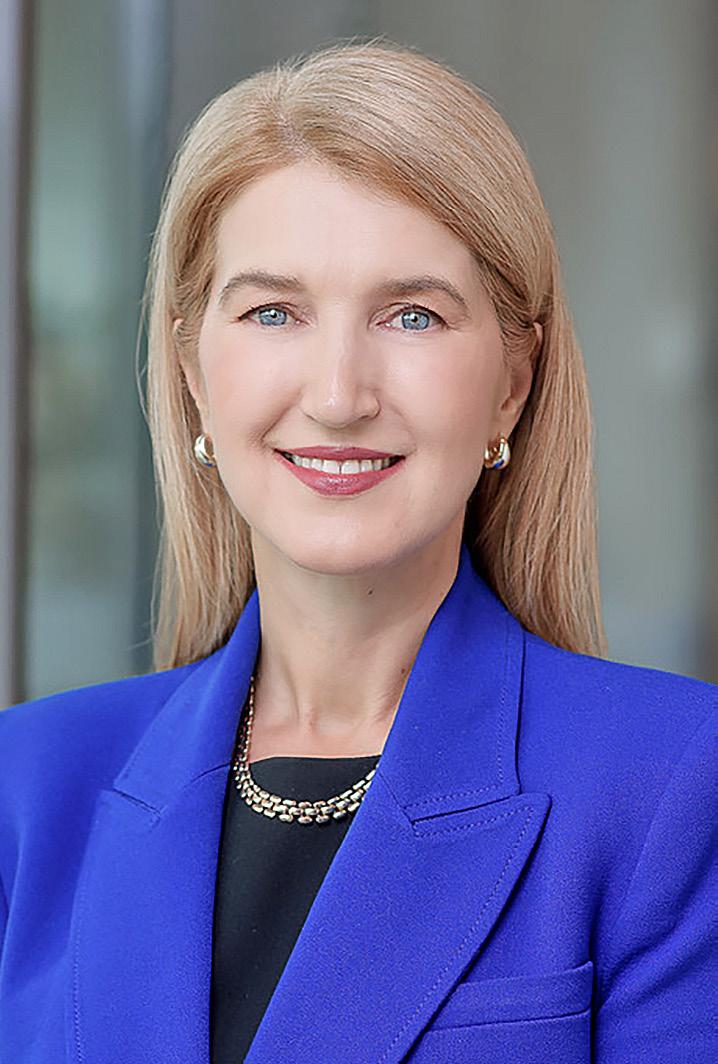
Marriott Hungary MultiProperty GM Named
Angela Saliba has been appointed the new multi-property general manager of the Budapest Marriott Hotel and Millennium Court, Marriott Executive Apartments.
Saliba started her career, which now spans 30 years, in Malta, honing her skills in various positions before making significant contributions to the pre-opening team of the Westin Dragonara Resort in 1997.
During her tenure at the Westin in Malta, she assumed pivotal roles, including executive housekeeper and director of Six Sigma. She also served as a board member for Malta’s Tourism Authority.
In June 2007, she assumed leadership of the Le Meridien St. Julians Hotel & Spa, helping establish it as one of Malta’s premier spa hotels. Her achievements led to her appointment as complex hotel manager for the acclaimed luxury resort of Costa Navarino in Greece in 2011, overseeing The Westin Costa Navarino and The Romanos, a Luxury Collection Resort.
In October 2013, Saliba spearheaded the Sheraton Krakow in Poland. Under her guidance, the hotel completed a guestroom renovation project that led to the hotel receiving the Sheraton Grand designation in 2016, becoming the first Sheraton hotel in Poland to achieve this status. In 2017, she was recognized as Marriott GM of the Year for Europe, Core Brands.
As of 2019, she led the Sheraton Grand Warsaw, where she was
responsible for successfully repositioning the property after renovating guestrooms and public spaces. Additionally, Saliba was actively involved in leading the Poland, Czech, Slovak and Baltics Marriott Business Council, comprising 29 managed and franchised hotels. In this role, she championed the Marriott culture amongst all hotels while supporting joint initiatives around company culture, sustainability, and talent development.
CEO Change at Metro Hungary
As of April 1, Vladimir Gnjidić was appointed CEO of Metro Hungary, replacing Thierry Guillon-Verne, who became CEO of Metro Austria in February. Gnjidic joined the retailer in November 2011 at Metro Croatia, gaining experience as the board member responsible for offer management, followed by a commercial director role. In 2019, he moved to Makro Czech Republic, holding various board positions within the commercial area, most recently having responsibility for sales and operations.
Metro Hungary’s five-member board of directors now includes two international executives: Marijana Racic took over the duties of chief finance officer as of March 1, moving from Metro Serbia, where she held the same role. The board of Metro Hungary also includes Beáta Kápolna, director of procurement; Helga Kaszás, director of people and culture; and Péter TóthKorom, director of sales and operations.

With the arrival of the new executive managers, Metro Hungary is entering the next implementation phase of its wholesale strategy. Store transformations focusing on gaining efficiency will soon be successfully completed, Metro says. Building on these fundamentals, the company will focus on further acceleration in meeting the needs of professional customers using the strength of its multi-channel services.
Editor’s note: For Legal Services Who’s News, check out page 28.
1 News | 9 www.bbj.hu Budapest Business Journal | May 31 – June 13, 2024
WHO’S NEWS Do you know someone on the move? Send information to news@bbj.hu
János Gárdai and Ildikó Rézműves
Angela Saliba
Vladimir Gnjidić
2 Business
Waberer’s Reports Record Revenue but Declining Profits in Q1
Waberer’s has released its firstquarter earnings, highlighting record revenue in the first three months of the year. Despite this, profitability notably declined, with the international transport and freight forwarding segment reporting a loss at the EBIT level.

at the beginning of the year. Additionally, retail also performed weakly on both international and Hungarian levels. Significant increases in road tolls in several countries relevant to transportation also contributed to the EBIT decline.
GERGELY HERPAI
In its first quarterly report of the year, Waberer’s detailed a significant increase in revenue but faced a nearly 90% decline in taxed earnings. The company’s management insisted that the quarterly performance was in line with expectations, and no adjustments to the annual forecast are planned.
Waberer’s latest numbers show that revenue rose by 11.3% in the first quarter to EUR 196.7 million compared to the same period in 2023, setting a new quarterly record for the company. However, EBIT fell significantly, with a 24.1% decrease compared to the same quarter last year. While the contract logistics and insurance segment saw an improved performance, the international transport and freight forwarding segment’s EUR 2 mln loss
significantly worsened the results. The decline in EBIT can partly be attributed to decreased industrial production volumes in key markets such as Germany, Italy, and Hungary
However, the company expects significant improvements in the international transport and freight forwarding segment in the second half of the year, which could positively influence the group’s results.
“The Waberer’s Group has been through a significant quarter in terms of strategy execution. We closed acquisitions aligned with our defined growth directions [PSP Group and MDI], started developing a new logistics center in Debrecen, and are in the final stages of constructing our warehouse in Ecser,” commented Zsolt Barna, president and CEO of Waberer’s.
“We initiated an ESO [Employee Stock Ownership] program; thus, the company group’s upper and middle management became directly interested in the stock price changes. Based on approval at the general meeting, our company will pay a dividend of HUF 120 per share, 20% higher than last year, and now three analysts (Concorde, Equilor, MBH) are also following Waberer’s stock, thus providing credible and independent information to current and potential investors,” he added.
Big Drop
Waberer’s net quarterly result was EUR 1.1 mln, representing a decrease of EUR 9.3 mln, or 89.5%. The decline was blamed on the lower EBIT and the
in the RCL and insurance segments could not offset the EUR 2.4 mln EBITDA fall in the ITS segment.
Core Activity
A similar situation is apparent at the EBIT level; RCL improved 14.8% to EUR 4.6 mln. The core activity maintained its profitability despite stagnant domestic consumer demand. The acquisition of the Serbian MD International was closed at the end of the quarter, and its results will appear in the group figures from Q2 on.
The EBIT result was minus EUR 2 mln, a y.o.y. weakening of EUR 3.8 mln. At the beginning of the first quarter of 2024, Waberer’s closed the acquisition of the rail logistics firm PSP Group. The proportionate EBIT consolidation of the ownership stake (51%) improved the segment’s EBIT performance by EUR 0.3 mln.
The insurance segment’s EBIT increased by EUR 0.5 mln, reaching EUR 5.9 mln with an EBIT margin of 25.8%. This is primarily due to high investment results, and the insurance client portfolio also grew by 15% over the past year. This is expected to expand further thanks to recent strategic sales agreements that have been concluded.
The company’s consolidated revenue is expected to approach
EUR 800 mln
this year, compared to EUR 711 mln in 2023. EBIT is expected to exceed EUR 40 mln, similar to last year.
unrealized non-cash foreign exchange effects resulting from the weakening of the forint against the euro, which resulted in a EUR 3.9 mln decrease compared to the first quarter of 2023.
Additionally, there was higher latent tax and lower interest income available on a lower cash balance due to investments and acquisitions, which together resulted in a EUR 2.7 mln decrease.
Q1 revenues in the contract logistics segment (RCL) increased by 16.9% to EUR 58.5 mln, transport and freight forwarding rose by 6.4% to EUR 118.4 mln, and the insurance sector was up by 21.4% to EUR 23 mln, year-on-year.
The revenue growth in the RCL line was due to the impact of price increases and the effect of new projects that started at the end of last year and the beginning of
2024,
affecting transportation, warehousing, and manufacturing support logistics activities.
The growth in transport and freight forwarding was attributed to the expansion of subcontracted services, representing a lower business risk, while revenue from own fleet transportation activities did not change. Revenue in the insurance segment, calculated in forints, increased by 21.3% and is primarily due to the growth of the contractual portfolio.
The company group’s EBITDA reached EUR 22.1 mln in Q1, a decrease of EUR 1.5 mln, or 6.4%. The growth
Szabolcs Tóth, Waberer’s deputy CEO for economics and strategy, stated that profitability is likely to remain lower compared to the base period in the second quarter, but growth is expected in Q3 and Q4. He said that the drastic increases in road tolls (which burdened the ITS segment in the first quarter) could be incorporated into annual contracts later; additionally, European industrial production and Hungarian consumption may stabilize in the second half of the year.
“While Waberer’s has been through a volatile period characterized by market pressure, I am pleased to report that this was followed by a very active negotiation period. In the last quarter of last year and the first months of this year, Waberer’s participated in tenders that closed in March-April, and the company group performed well. We can ensure in terms of price and volumes for the second half of the year that our international segment will again generate results. In the segments with higher added value, which play a key role in our strategy, we achieved further victories,” said Tóth. He also mentioned that operations can begin in the new Ecser warehouse complex this summer, so the impact on results will be visible from August to September. Preparation for a Debrecen warehouse development is also underway, with the site next to the BMW factory paid for in the first quarter. The warehouse could be handed over in the second half of next year, Tóth said.
www.bbj.hu Budapest Business Journal | May 31 – June 13, 2024
HCEMM: Making an Aging Society Work
Technological developments over the past two centuries have fundamentally transformed our relationship to health, disease and death. It is imperative that we integrate these changes as we plan for the future if we are to keep healthcare sustainable and effective.
DR. CHRISTOPH W. SENSEN

middle-income countries. The average of 25 extra years of life that science has won us is a mind-boggling increase. The trend is not stopping, either; since 2000, life expectancy has risen five years, mostly fueled by greater numbers of people living into more advanced ages.
Learn, we Must
For much of recorded history, life expectancy at birth hovered around 30 years. It would be tempting to compare that number to the modern global life expectancy of 72 years, but it is also quite deceiving. Historically, infant mortality had a profound impact on life expectancy since a significant number of children, nearly half of all live births, did not survive to adulthood.
In recent times, medical discoveries and inventions have slashed infant mortality rates to a tenth of their former value globally and by yet another order of magnitude in developed countries specifically. Modern infant mortality has little impact on life expectancy.
Looking at early adulthood rather than birth (how many years one has to live after having navigated the perils of childhood) is much more informative, and its perspective is not any less impressive. From classical Rome to medieval Europe, life expectancy at 25
seems to have been around 25 years. In other words, someone who survived into adulthood could look forward to a total lifespan of around 50 years, give or take, of course.
That is a number we can put next to current life expectancy values, which are 72 globally and 75 years in upper-
There is a catch, though. Living longer and being in good health longer are not necessarily connected. In the same time life expectancy took to rise five years, healthy life expectancy, the span of time we spend mostly free of disease, rose by only one, mainly because we are still learning to tackle age-related disease. There should be no surprise there: in terms of disease burden, these only took the lead in the late 1990s. But learn, we must: age-related disease puts an enormous strain on society.
When the first comprehensive social security program was launched in 1883 in Germany, there were roughly 10 working-age people for every elderly person, and the retirement age (initially 70, later 65 years) was well above the approximately
years
an adult was expected to reach. Back then, people would consider themselves lucky if they survived until retirement. Today, they plan the things they will do after they retire, and with every passing year, Europe inches closer to each elderly person having only three working-age adults to rely on.
With the average lifespan moving farther ahead of healthy life expectancy, there comes an increase in per capita medical expenditure, which has,
for the past few decades, increased by an average of more than USD 4,500 in the EU (at 2017 prices).
Clearly, the combined effect of these trends is highly problematic: experts of the Stanford Institute for Economics Policy Research have predicted that a 10% percent increase in the fraction of the population aged 60 or older will decrease per capita GDP by 5.7%.
Until recently, it looked like a head-on collision of economy and the realities of human biology was inevitable. Fortunately, our understanding of aging has gradually transformed in the past few decades, and it appears that molecular biology has the potential to offer a muchneeded helping hand.
Leaps of Progress
In some of the most prevalent agerelated diseases, leaps of progress have been made: since the 1970s, the overall five-year cancer survival rate has increased from 49% to 68%, with several impressive success stories. A salient example would be Melanoma, where the five-year survival rate of metastatic disease (accounting for both regional and distant metastases) has increased tenfold since the 1970s to around 50%. But this is only the beginning.
Increasingly, medical research investigates aging as a complex medical issue underlying several superficially unrelated conditions such as cardiovascular disease, cancer or dementia. Institutes such as the Hungarian Centre of Excellence for Molecular Medicine (HCEMM) have been established to do away with the practice

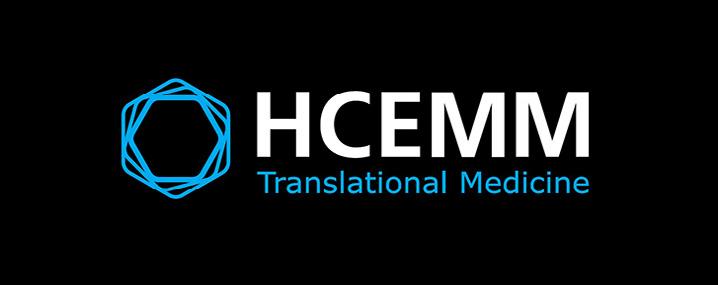
of handling these conditions as isolated problems and address them as the interconnected phenomena they are.
In Hungary, HCEMM has become a prominent player. Its development is part of a global trend; the yearly number of publications concerning age-related diseases increased about twofold between
1980
and 2000 but fivefold between 2000 and 2020.
Since new drug development is proverbially slow, it might seem like the fruits of this research are still years in the future, but that avenue is only one part of the effort. Since existing therapies are often very effective if age-related disease is diagnosed early and accurately, developing and refining diagnostic approaches is just as important as finding new therapies and is more readily commercialized.
Of course, society only profits from medical developments that are actually available for use, prompting a need for institutions that shepherd new inventions towards application, uniting cross-disciplinary basic research, support for clinical trials and a focus on bench-to-bedside tech transfer.
WHAT IS HCEMM?
The Hungarian Centre of Excellence for Molecular Medicine (HCEMM) is a distributed Institute whose scientists develop advanced diagnostics and treatment options to support healthy aging. Currently, the HCEMM Program is funded by an H2020 Teaming Grant, where Semmelweis University, the University of Szeged and the Biological Research Centre in Szeged cooperate with their advanced partner EMBL (with headquarters in Heidelberg) and a Thematic Excellence award, as well as a National Laboratory award, from the Hungarian Government. The various activities are coordinated by HCEMM Kft., with headquarters in Szeged. HCEMM works at the interface of academic and industrial research on topics related to translational medicine. The goal is to improve the quality of life for an aging Hungarian population while at the same time lowering the cost of healthcare provision through novel applications in molecular medicine.
The author is the director general and CEO of HCEMM Kft.
2 Business | 11 www.bbj.hu Budapest Business Journal | May 31 – June 13, 2024
60
PRESENTED CONTENT
Dr. Christoph W. Sensen
7% of Companies Worldwide Involved in Greenwashing
With the recognition of environmental crimes growing globally, Corvinus University’s researchers have looked at how prevalent greenwashing is among businesses. According to the research, it has already occurred in 7% of the studied companies.
“Misleading green corporate communication should be punished more; this would make sense not only from a legal point of view but also from an economic one,” commented Edina Berlinger, a professor at Corvinus University, researcher at the University of Luxembourg, and expert in sustainable finance.
“It [greenwashing] is tempting for companies, as it is easier and cheaper to communicate green than to innovate and act green, while the market rewards companies that look green,” she added.
She was speaking at a Hungarian Economic Association event, “Is it Really Green? Fresh Research on Greenwashing,” held in May, which focused on a specific case of environmental abuse.
Berlinger began by pointing out that there is currently no generally accepted legal definition for greenwashing, which makes it more challenging to fight. Typically, it is taken to mean a company that uses communication to create the false impression that its activities or products are green when they are not.
This harms consumers, investors and, ultimately, society as a whole. The more significant the difference between what a company actually does and what it says it does, the more it can be called greenwashing.
Berlinger presented her joint research with co-authors Zsolt Bihary, Barbara Dömötör, Judit Lilla Keresztúri, Ágnes Lublóy, Martin Márkus and Gábor Neszveda. In one of their studies, more than 1,200 companies from 23 developed countries were examined between 2008 and 2020.
The team found that, overall, 7% of firms have already been involved in greenwashing at least once. This ratio rises to 40% in the energy

sector, 28% among utilities and 10% in energy-intensive industries such as chemicals and construction materials.
Plenty of Attention
According to the researchers, the energy sector is so prominent because it is easier to find out if its players are polluting the environment; the companies are bigger and tend to have capital-heavy projects that require more investments, raising the level of scrutiny.
Another study highlights that companies that are larger, have higher profits and returns on their assets, fewer independent directors on their boards, less liquid trading in their shares and operate in a country where consumers are less environmentally conscious are more prone to greenwashing. However, the practice can be counteracted if a business has a robust internal control system, so monitoring plays a significant role. Why are companies even tempted to greenwash? Berlinger mentioned various motivations: because the regulations allow it, because it can help generate extra profits, and self-deception: “I’m only doing what everyone else is doing.”
In all cases, the cost of greenwashing communication is markedly lower than that of genuine
should a company present itself as greener than the reality, the penalty for causing damage should be heavier. Likewise, if we want to promote green investments, we should not only offer discounts to firms that launch environmentally beneficial projects but also proportionately increase the penalties if the promised greening is not achieved.
The ESG phenomenon can also be used for greenwashing, Berlinger warned. A good example is the case of Credit Suisse, where a series of scandals followed one another, but the bank tried to justify its actions to shareholders in its ESG reports.
“False green corporate communications should be punished more; this would make sense not only from a legal point of view but also from an economic one. Greenwashing is tempting for companies, as it is easier and cheaper to communicate green than to innovate and act green, while the market rewards companies that look green.”
green innovation. According to the professor, AI will be increasingly important in identifying cases.
The researcher says environmental crimes are the fourth most common globally. Worse, it is growing by 5-7% per year and trails only drug, arms, and human trafficking.
In 2024, a new EU directive was adopted. The related sanctions include significant maximum penalties: 10 years in prison, fines of 5% of turnover or EUR 40 million. Aggravating circumstances include death or severe injury due to an incident, misleading company documents, recurring pollution events, or a company profiting from environmental crimes.
The expert reminded the audience of the British Petrol (BP) oil spill in the Gulf of Mexico in 2010 and said that the company had been able to reduce a significant loss of revenue caused by a consumer boycott by using what she called greenwashing advertising.
The Polluter Pays
In Berlinger’s opinion, from both a legal and an administrative point of view, it would be logical that
Muddying the waters even more, because the methodologies used to assess ESG reports differ significantly, it has happened that the same bank has received both the highest ESG rating from one international organization and the riskiest rating from another.
While, according to research, a one standard deviation better ESG rating typically reduces the severity of damage caused by a company by 50-60%, there is some backlash against ESG overseas. Several bills have been introduced in different, mainly Republican-controlled, U.S. states that have sought to prohibit asset managers from using ESG criteria when investing taxpayer or state money.
Berlinger also explained how a spectrum of green, greenwashing, “brownwashing” (acting green but not communicating it) and so-called “honest brown” (causing environmental damage but not denying it) companies can coexist. This situation arises due to unequal knowledge between investors and companies, leading to adverse selection and moral hazard.
Adverse selection occurs because investors offering green loans at preferential rates often don’t know how committed the company is to its green project or how effective it will be. Moral hazard refers to the uncertainty about whether the company will actually use the loan for the intended green project, whether it will achieve positive environmental impacts, or if it will misuse the loan and falsely label it as an environmental investment.
12 | 2 Business www.bbj.hu Budapest Business Journal | May 31 – June 13, 2024
BENCE GAÁL
Edina Berlinger, a professor at Corvinus University, researcher at the University of Luxembourg, and expert in sustainable finance.
AmCham Offers Strategic View on Improving Hungary’s Competitiveness
The American Chamber of Commerce in Hungary has just released its latest recommendation package of suggested reforms in government economic policy. AmCham President Zoltán Szabó and CEO Írisz LippaiNagy lift the curtain to give Budapest Business Journal readers a greater understanding of the preparation, intent and reception of the “Cooperation for a More Competitive and Sustainable Hungary.”
BBJ: You make suggestions in four crucial areas: General Business and Investment Environment; Taxation and Competitiveness; Human Capital; and Smart Growth. What are your critical findings? What are the changes that need to be implemented?
ZSz: Regarding the General Business and Investment Environment, we find that due to heavy international competition, it is imperative for Hungary to develop its investment and industrial strategies with a regional perspective. Our chamber has consistently emphasized that maintaining Hungary’s long-term competitiveness requires a significant increase in productivity and a shift in economic policy from the quantitative to the qualitative. These changes can only be realized with a firm government intent and effective measures. Without urgent intervention, we risk falling behind our regional competitors in attracting and securing capital investments, possibly even in the medium term.
We also underline the need to simplify and stabilize the current regulatory and tax system. There are currently 61 different taxes, contributions, and special taxes, while 91% of the central budget’s tax revenue is generated by only seven tax types. Reducing the number of taxes is, therefore, indispensable. It is also an EU commitment we should comply with, and it could also lead to a more attractive investment environment. Quasi-retroactive legislation that is common in the imposition of special taxes is also identified as a country risk.
in the system’s digital infrastructure are also crucial to make processes more efficient and create a more welcoming environment for further research and investment.
The available human capital fundamentally determines the country’s future competitiveness; it is, therefore, critical that the two areas that are fundamental components of economic performance, education and healthcare, are given adequate strategic weight in stakeholders’ visions for Hungary’s future.
ZSz: Lastly, in the Smart Growth section, we focus on the key questions of innovation and sustainability. A vital element of the innovation ecosystem is the collaborative framework between companies and universities, which should be elaborated and enhanced. We address digitalization, as the development of a modern data economy has significant economic and R&D&I potential, which is essential to strengthening our position on the regional and global landscape. Additionally, we stress that a gradual green transition of the economy, and industry in particular, is necessary, although it is only possible if these changes do not impose a disproportionate burden on society and do not undermine the competitiveness of EU businesses.
ÍL-N: These findings are only a brief outline of our recommendations, which we set out in detail in nearly 50 pages.
developed at our regularly organized Business Forums with ministers and Policy Forums at State Secretary level. We are delighted and proud to have already received the opportunity to consult on the recommendation package with the Hungarian Investment Promotion Agency during our recent Business Forum, where he expressed Hipa and the government’s support in enhancing the investment environment and keeping an open dialogue with our business community.
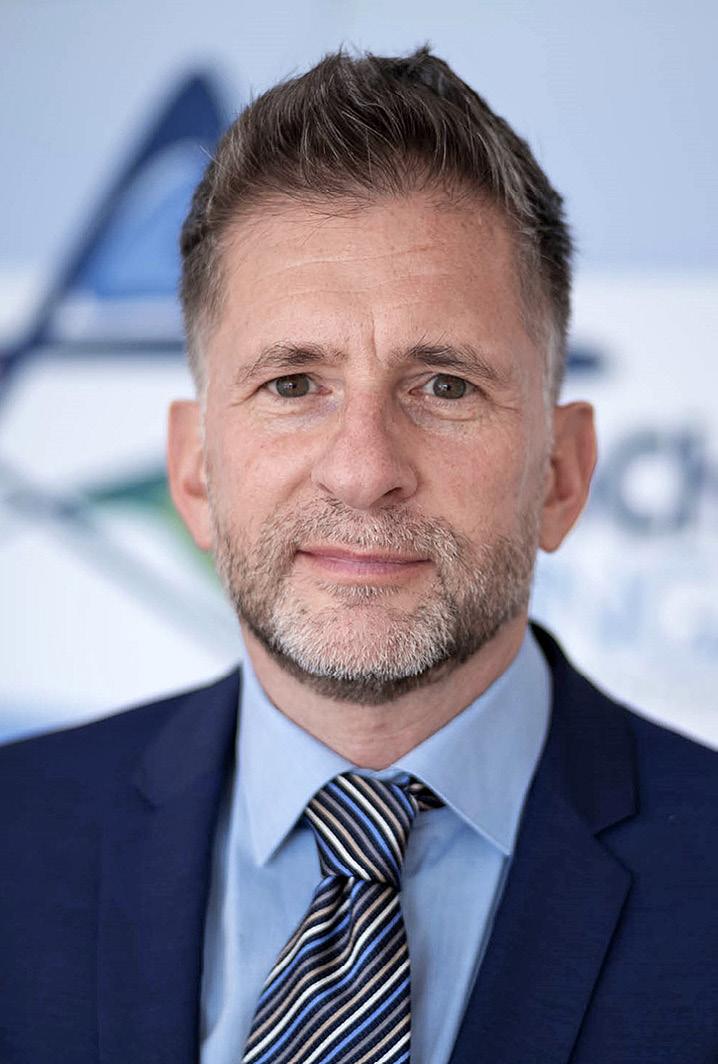
BBJ: Congratulations on publishing the 2024-25 recommendation package. What’s new this year?
Zoltán Szabó: In recent years, our recommendation packages have primarily focused on practical aspects across different sectors, while the new publication presents aspects and considerations that affect Hungary’s competitiveness and global economic integration at a strategic level. It addresses key factors that our members consider vital for the sustainability and longterm development of the Hungarian economy and provides insights crucial for strategic planning and decision-making.
Írisz Lippai-Nagy: Our concrete recommendations for practical implementation in each of the main areas outlined in the recommendation package will be presented to stakeholders in subsequent papers, depending on their relevance, and in cooperation with government policy officials.
ÍL-N: On Human Capital, we look at competitiveness through the lens of labor, education, and health. The Hungarian labor market is characterized by both persistent labor shortages and a certain degree of unemployment due to a mismatch between the needs of employers and the qualifications, skills and even intentions of jobseekers. In our recommendations, we highlight that meeting labor demand requires opening up the country’s internal reserves through targeted programs and budgetary resources and promoting the employment of foreign workers. Furthermore, we believe the government needs to support policy measures to prepare students and today’s employees for future challenges through appropriate education, retraining, and upskilling programs.
Health is another key contributing factor to competitiveness; more healthy citizens mean less burden on the healthcare system, and good public health indicators directly and positively impact productivity. Consequently, our view is that government spending on healthcare should not be regarded as a mandatory expenditure but rather as an investment into the country’s human capital, involving a valueadded-centric approach to the system’s financing and creating a stable and predictable regulatory environment for healthcare stakeholders. Improvements

BBJ: Perhaps the most significant word in the title is the first one: “Cooperation.” How willing a partner do you find the Hungarian Government?
ZSz: AmCham’s advocacy activity is based on an annual cycle of consultations, meetings and formulation of policy publications by our members, such as this recommendation package, which are discussed and further
In recent years, the most influential decision-makers in Hungary have all accepted our invitations to similar Business and Policy Forums, and we hope that this will be the case again this year, as it is in our common interest to increase Hungary’s competitiveness. Our joint Business Meets Government Summit with Hipa, a leading advocacy forum celebrating its 10th anniversary this year, will also provide an excellent opportunity for further consultations in the fall.
BBJ: When preparing the package, you rely on input from your member companies. How supportive of the process are they?
ÍL-N: They have been extremely supportive in preparing the document, primarily through their involvement in our committees. They have played a key role in identifying the critical questions we want to address collectively, even though we at the chamber are also closely monitoring the business landscape. Our members’ contributions are invaluable in developing recommendations, providing both expert and practical insights. Their close connection to the topic ensures a deep understanding, which enhances the document’s professionalism. In this respect, we would like to express our appreciation to our DEI&B (diversity, equity, inclusion and belonging), Healthcare, HR, Government & Transparency, Tax, Regulatory, and Sustainable Growth committees for their contributions. Furthermore, we would like to thank the members of our board of directors for their insights and support, which were also key in bringing the recommendation package to life.
2 Business | 13 www.bbj.hu Budapest Business Journal | May 31 – June 13, 2024
BBJ STAFF
Írisz Lippai-Nagy, AmCham Hungary’s CEO.
Zoltán Szabó, president of AmCham Hungary.
Inflation Still Lurking in the Shadows, Intrum Warns
In August last year, Prime Minister Viktor Orbán announced triumphantly that the government had “grabbed inflation by the hair,” which meant it had started to come down. Indeed, it had slowed from 17.6% in July to 16.4% in August but remained the highest in Europe. The government reached its target of single-digit inflation in October, and by December, it was at 5.5%.
HR Matters
A monthly look at human resource issues in Hungary and the region

acquired between July and September last year, with 20,000 respondents from 20 countries.
Only one-third of Hungarians said they live a financially stable, stress-free life, compared to a European average of 46%.
The trend continued this year, albeit slower: 3.8% in January, 3.7% in February and 3.6% in March. But in April, it went back up to 3.7%. The figures for May will be released around June 10.
There is no need to worry, the Central Statistical Office (KSH) figures indicated. As per the data released on May 23, the average gross wage in Hungary rose year-on-year by 13.9% to HUF 658,400 and the net wages by 13.7% to HUF 452,700. Real wages rose by 9.9%, according to KSH. A survey conducted by financial and tax consultancy Moore Hungary and Trenkwalder released in April confirmed the KSH data. The average hourly wage of physical workers was HUF 2,061 in Q1, 15.9% higher y.o.y. True, other categories saw lower growth rates. Middle management, earning monthly between HUF 800,000 and HUF 1.2 million gross, registered a wage growth of 10.3% compared to the same period in 2023. In this category, real wages grew by 6-7%, according to the survey. So, is all well among Hungarian employees? Not necessarily. In March, Intrum released its annual European Consumer Payment Report, the ECPR. The data had been
The majority of Hungarians said they felt they were progressing slowly financially, with three-quarters saying that, no matter how hard they worked or tried saving, they could hardly become wealthy. The most pessimistic groups in Hungary were women and Generation X, while Gen Z and the Baby Boomers felt they had sufficient monthly income to live a comfortable life.
Boomer Exclusion
On the other hand, Boomers feel excluded from the labor market, and only 21% think they can advance professionally, compared to 50% of Gen Z. Overall, almost half of Hungarians, 42%, believed they would not be able to afford one week of summer holiday this year.
Another survey released periodically by Intrum, this time in cooperation with the economic research institute GKI, is the IFI solvency index. This summarizes the financial security of households in a single figure, factoring in income, the volume of loan debt, the value of savings, as well as the cost of living.
According to the latest report, released in May, in the first quarter of 2024, the IFI continued a growth trend that started at the end of 2022, surpassing 10 points for the first time to 11.95. The growth is not steady, though: following significant growth in January and February, in March, it slipped back by 13%
compared to the previous month.
Explaining the data, Judit Üveges, sales director at Intrum, said that the
drop in March indicates that it is too early to celebrate by looking at January and February alone.
“This is especially so because we continue to be exposed to significant instability at the world economy level, and the tensions accumulating at the political level can have a negative impact on the solvency index this year,” Üveges said.
There are many instability factors. An endpoint to the war in Ukraine is unpredictable, and the same is true in the Palestinian territories, which also impacts Red Sea transports.
Should Donald Trump be re-elected as President of the United States in November, U.S.-EU relations would be shaken both on the military and economic levels, according to the Intrum press release.
Inflation Risk
In Hungary, inflation remains a significant risk, Intrum says. While the government hailed the drop from 25.7% in January 2023 to less than 5% in March 2024, it should be noted that the drop in purchasing power was a significant contribution to this trend. Food prices soared to more than 25%,
caused by weak crops last year and the windfall taxes for retail chains.
Considering these factors, it is too early to celebrate the inflation figures, which may prove only temporary, Intrum warns.
“If the main causes of high inflation are not addressed properly, an early declaration of victory over inflation could lead to economic instability, a decrease in solvency and an impact on GDP growth. Maintaining balance is crucial for economic stability and protecting the population’s income,” Üveges said.
A return to high inflation would increasingly erode income and savings. We already see growing service prices fueled by telecommunication and banking fees. Further, marked growth in waste management and water prices is expected this year.
Intrum noted that the government had abandoned its anti-inflation stance and adopted a more expansive economic policy, which will contribute to inflating prices. Solvency is expected to deteriorate again, albeit at a slower pace than after the start of the war in Ukraine, which will lead to lower standards of living, Intrum warned.
Gen Z Cares Less About Auto Brands
Recent research surveying the auto purchasing preferences of Generation Z in Hungary found that the main factor for them is price rather than brand. Also, young people in Budapest are more likely to opt for public transport, while those in the countryside prefer to use a car to get from A to B. The same is true for driving licenses: Gen Z-ers in the capital get their
driving license as soon as possible, but unlike their rural counterparts, they don’t get behind the wheel immediately. Some 60% of the young people interviewed own an auto. In most cases, they buy secondhand vehicles that are more than 15 years old. Due to the higher prices, Gen Z is less keen on electric vehicles, and 71% think it is important to test drive a car before buying it.
14 | 2 Business www.bbj.hu Budapest Business Journal | May 31 – June 13, 2024
BALÁZS BARABÁS
/ Shutterstock.com
Photo
by Pormezz
Many Hungarian employees are not yet feeling free of the cost of living crisis.
News Company
Hell Energy, Quality Pack
Inaugurate HUF 80 bln
Capacity Expansion
Hell Energy and Quality Pack
inaugurated an HUF 80 billion capacity expansion at the soft drink maker’s base in Szikszó (200 km northeast of Budapest) on May 24. The investment, which creates 240 jobs, has increased annual capacity at the base to four billion cans of energy drinks and six billion cans of soft drinks, Minister of Foreign Affairs and Trade Péter Szijjártó said. The minister said the investment would help Hell Energy strengthen its market-leading positions in Hungary as well as Bulgaria, Croatia, Cyprus, Greece and Romania and could enable expansion into other export markets.
Siemens Energy
Inaugurates Production Hall, Training Center
The local unit of German-owned Siemens Energy has inaugurated a production hall and training center and installed a 1.5 MW solar park in a HUF 26 billion investment
at its base in Budapest on May 23. A HUF 900 million government grant supported the investment, Minister of Foreign Affairs and Trade Péter Szijjártó said. The new unit will make gas turbine burner heads. Siemens Energy’s headcount has increased by 400, and the company has spent close to HUF 50 bln on capital investments since it signed a strategic partnership with the government, Szijjártó said.
Continental Dohanyipari Starts HUF 16.5 bln Expansion
Hungarian-owned tobacco company Continental Dohanyipari laid the cornerstone for a HUF 16.5 billion expansion at its base in Sátoraljaújhely (250 km northeast of Budapest) on May 24. The tobacco company has begun constructing a 1,200 sqm production hall that should be finished by November. It also plans another 7,200 sqm two-story production hall and a 3,500 sqm warehouse. The entire investment project is set to wind up in mid-2026. CEO Csaba Fűzi said the investment could create 60 jobs.
and is now
Chinese Mobile Phone Brand Enters Hungarian Market

Chinese telco Transsion will launch its Tecno mobile phone line in Hungary in June, starting with five Tecno Spark variants. The company says it is initially targeting younger customers, as reflected in the design and prices. These range from HUF 39,000 for the entry-level 64GB Spark Go 2024 to HUF 99,990 for the 256GB Spark 20 Pro+. Unlike many brands, the phone will come with a USB data cable,
Primark Opening 1st Store in Hungary
Irish multinational fast-fashion retailer Primark opened its first shop in Hungary on May 28. Maciej Podwojski, the company’s head
The Spark 20 Pro+ will top the Transsion range in Hungary for now.
charger and a headset. On the minus side, the less powerful Unisoc and MediaTek processors will power the Tecno Spark mobiles. Transsion’s higher-end Tecno Camon and Phantom models will arrive later in Hungary, although no firm date has been given yet. The Tecno Spark 20 mobiles will be available at the Alza, Auchan, eMag, Euronics, MediaMarkt and Pepita retail chains.
of sales for the region, said Primark has plowed around EUR 8 million into the 3,100 sqm retail space in Budapest’s Arena Mall. The Dublin-based retailer already operates a dozen stores in the Czech Republic, Poland, Romania, Slovakia and Slovenia.

HD Jobs and HR Direkt have merged under HD Direkt. We are enthusiastic about leveraging our combined expertise to further elevate our services and set new benchmarks in Hungary's HR supplier sector.
2 Business | 15 www.bbj.hu Budapest Business Journal | May 31 – June 13, 2024
ADVERTISEMENT
Hungary Continues to Count on U.S. FDI Inflow, Hipa Tells AmCham
Against a backdrop of global geopolitical tensions, a recovering economy, and multiple general elections, holding on to established relationships in politics and business is more important than ever. The Hungarian Investment Promotion Agency has said it will, therefore, do everything in its power to maintain a pro-investment environment, foster further economic growth by providing an attractive tax and investment atmosphere, and incentivize the creation of higher value-added jobs.
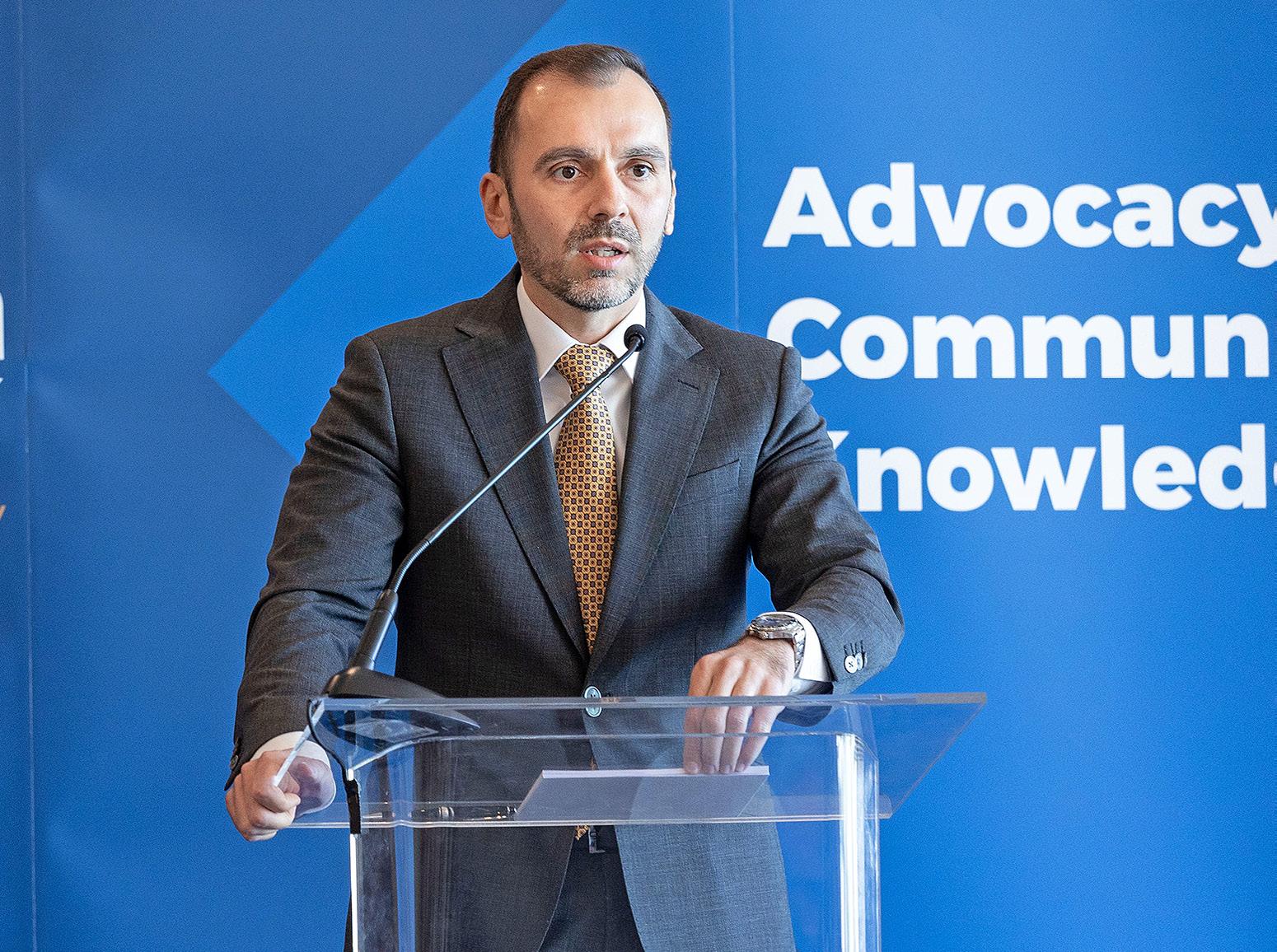
of competitiveness – is implemented to the highest possible degree
This year could trigger even more change than usual as it sees more general elections than ever before, with a potential of about two billion voters in more than 70
countries, including the United States, India, and Indonesia. Given the unpredictable outcome, foreign investors may study the progress and results of the elections before making decisions.
“This can, and probably will, slow down FDI flows, at least temporarily,” Joó said. “The most anticipated elections will take place in the United States, and we will do everything to ensure that American businesses [.…] continue to bring their investments here.”
for success include infrastructure upgrades, an attractive incentive and tax environment, productivity enhancement, and a skilled workforce. Of those, productivity probably takes the prize.
“The good news is that, according to the IMF’s definition, nearly 70%
of Hipa-supported projects have a focus on R&D or the high-tech sector,” Joó said. He explained that the government wants to create a supportive environment here so that factories will take it for granted to launch massive R&D efforts.
Developing Infrastructure
In terms of infrastructure, the government has provided more than HUF 1.2 trillion in funding for 14 priority industrial parks and economic zones, including the expansion of roads, network improvements to ensure secure electricity and gas supplies, investments in drinking water and industrial water supply, and the development of rail infrastructure.
Geographic distribution is achieved by shifting the focus to Hungary’s southern regions, also reflected in the incentive scheme. The first results of that strategy include the investments of BYD in Szeged, some 175 km southeast of Budapest by road, and CPMC in nearby Makó. In addition, introducing a so-called results-based VIP cash subsidy will help investors offset the effects of introducing the global minimum tax.
A promising sign is that the number of researchers in Hungary doubled between 2010 and 2021, making the country a regional power regarding these metrics. Companies are allocating ever more resources to R&D purposes, and partnerships with local universities further intensify their efforts. In the past two years alone, Hipa closed 18
R&D-focused deals to create nearly 1,400 new jobs.
Responding to criticism that Hungary focuses on re-industrialization instead of investing substantially in knowledgeintensive sectors, Joó drew attention to the long-term approach.
“A strong industry is the lifeblood of the economy. In the longer run, manufacturing activities are bound to trigger the need for research and development and productivity enhancement. It’s a natural process,” he concluded.
Consultations with AmCham bracketed Joó’s presentation.
As a long-term advocate for an attractive tax and investment climate and a shift to a higher value-added economy, the chamber welcomed Hipa’s approach.
The latest business forum hosted by the American Chamber of Commerce in Hungary at the Budapest Marriott Hotel on May 13 featured István Joó, the head of Hipa, who shared insights into Hungary’s investment promotion strategy and trends that are bound to impact the local business landscape.
Joó reflected on the close cooperation between the two organizations, highlighting the importance of the annual Business Meets Government Summit designed to discuss current challenges and solutions and compile proposals to improve Hungary’s competitiveness.
He also underlined that Hipa is dedicated to ensuring that AmCham’s most recently released recommendation package – focusing on the Business and Investment Environment, Human Capital and Smart Growth as critical pillars
The European Union elections of June 9 were also touched upon. Since Hungary will hold the sixmonth rotating presidency of the Council of the EU from July 1, the initial phase of the presidency will be linked to the transition while the new parliament and European Commission are formed.
Diversity Matters
“Although this narrows the time window to get things done, we will use this chance to advocate a strong agenda that possibly takes into consideration specific sectoral needs,” Joó stressed. He added that given political uncertainty and geopolitical tensions from Ukraine to the Gaza Strip, “diversifying the sources of inbound FDI is in Hungary’s best interest.”
Despite all-time highs delivered one year after another, or maybe because of them, Hipa is determined to aim higher. Critical ingredients
“The most anticipated elections will take place in the United States, and we will do everything to ensure that American businesses […] continue to bring their investments here.”
A good example is the recently announced Evosoft development, which was recognized with this year’s Hipa Innovative Product Investment of the Year Award. The German company has software development centers in several locations, yet it chose Hungary to carry out its latest project.
Although capital from Eastern countries has dominated recently, the example of Evosoft shows that traditional Western investor relations remain strong. According to a recent survey, four out of five German companies said they would again choose Hungary as an investment location, Joó noted.
During the meetings, AmCham says it focused on the critical points of its new recommendations package (see separate interview on page 13), including strategies to avoid the middle-income trap, the overarching goal of the recommendations.
The two parties consulted on potential government support for promoting employees to higher positions or retraining them to support higher value-added jobs. They also touched upon the law on the general rules for third-country nationals to enter and stay in the country, which the chamber believes is one way to fulfill labor needs in sectors lacking a skilled workforce.
AmCham thanked Hipa for its continuous and longstanding support in maintaining an open and productive dialogue with the business community and expressed its commitment to further cooperation to promote competitiveness.
The 10th Business Meets Government Summit this October, which the chamber organizes jointly with Hipa, is expected to provide an optimal platform for this. The conference will host more than 150 leaders from the private and public sectors, think tanks, and academia.
16 | 2 Business www.bbj.hu Budapest Business Journal | May 31 – June 13, 2024
BBJ STAFF
István Joó, Hipa CEO, addresses the AmCham Business Forum on May 13.
Photo by Hajnalka Hurta / AmCham
3 Special Report
Legal Services
ESG, Among Others,
an ‘Increasingly Important’ Field for International Law Firms
Some of Hungary’s leading legal minds give us their take on the country’s evolving market, including significant growth areas (with ESG to the fore), the level of businessfriendly legislation, and the law-making process itself.

BBJ: How would you describe Hungary’s legal market today? Is it stable? Might we see consolidation or new entrants?
Erika Papp: It is currently stable, with a strong presence of national and international firms. The recent merger of Noerr and Kinstellar indicates a trend toward consolidation and the need to leverage global networks. Like any major merger, its success will only be visible after a few years of operation.
András Posztl: We are celebrating our 35th anniversary in Hungary, including 20 years as DLA Piper. During these decades, we have seen a robust market consolidation, resulting in fewer large international firms staying here and the blossoming of smaller boutiques formed by talented lawyers with a global orientation. I expect this trend to continue, probably at a greater pace. Disruptive forces such as AI and the fiercer war for talents not going abroad to build their careers will put the business models of law firms under intense stress and could result in difficult questions on how to continue, mainly to mid-sized local and international law firms.
Ákos Fehérváry: The Hungarian legal market has been stable for a while, underpinned by a strong foundation of established law firms and a consistent demand for legal
services. The recently announced takeover by Kinstellar of Noerr’s CEE operations represents an interesting move on the market. Otherwise, we’re seeing a delightful blend of legal expertise and business acumen as some firms expand their services, but the essence of our market remains unchanged.
Eszter Kamocsay-Berta: Hungary’s legal market today seems to be in transition. This primarily reflects changes in the economic environment. For example, Noerr’s Bratislava,

Bucharest, and Prague offices are transferring to Kinstellar, while Noerr Budapest may take another route. We also observe quite a few moves from one law firm to another.
Péter Lakatos: A strange mix of stability and uncertainty. Changes in the nature of the work clearly affect the practice of firms in different ways. We’ve recently seen two interesting developments: the withdrawal of German firm Noerr and the move of several lawyers from Nagy & Trócsányi to LKT.
István Szatmáry: On the surface, the Hungarian legal market seems stable, but looking behind the curtain, we see changes. Firstly, it seems the consolidation of international law firms is still ongoing. Secondly, we are seeing some moves in the leadership teams of firms that will impact what the next generation of law firms will look like.
Dániel Gera: While, on a global level, law firm mergers seem to be on the rise, I believe that in Hungary, the market for international and regional law firms remains relatively stable and predictable. We may see some consolidation in the next few years and some boutique firms changing or leaving, but that will not influence our position in the market. Schoenherr is a regional firm committed to further development in CEE, including Hungary.

BBJ: What share of your workload today involves ESG compliance?
How do you think this might change?
EP: We already advise a number of clients on ESG compliance, but this is likely to increase rapidly in the future as the framework regulation set out in the ESG Act is complemented by new government and ministerial decrees to be adopted, as well as decrees to be issued by the President of the Supervisory Authority for Regulated Activities.
www.bbj.hu Budapest Business Journal | May 31 – June 13, 2024
András Posztl
Continued on page 18 ›››
r.classen / Shutterstock.com
Photo
by
ROBIN MARSHALL
István Szatmáry
Navigating RED III: Opportunities and Challenges in the EU’s Renewable Energy Transition
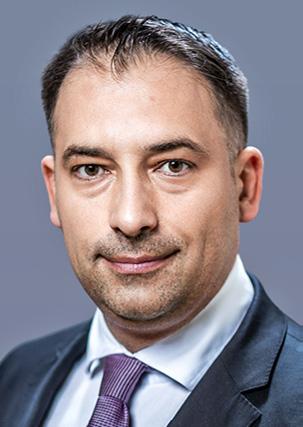 Dr. Róbert Szuchy Managing Partner
Dr. Róbert Szuchy Managing Partner
The Renewable Energy Directive III (RED III) is the EU’s third directive on renewable energy, continuing efforts to increase renewable energy consumption, reduce greenhouse gas emissions, and promote energy efficiency. A vital component of the EU’s strategy for climate neutrality by 2050, RED III targets 40% renewable energy consumption by 2030. Member states must set tailored national goals and meet interim milestones to ensure progress. Sector-specific targets include increasing renewable energy in electricity with wind, solar, and hydropower; boosting renewable sources in heating and cooling with heat pumps, biomass, and solar thermal energy; and achieving 14% renewable energy in transportation by 2030 with advanced biofuels and sustainable alternatives. The directive imposes strict sustainability criteria for bioenergy and promotes new technologies like green hydrogen. Energy efficiency and storage are emphasized, with technologies like batteries and pumped hydro crucial for grid reliability. Member states must develop National Energy and Climate Plans (NECPs) with regular reporting. Supporting frameworks include financial mechanisms and streamlined permitting processes. Socio-economic considerations focus on a just transition, green job creation, and reducing energy poverty. RED III also encourages international cooperation and allows for flexibility and updates to address evolving challenges.
Opportunities:
1. Advisory Roles: Lawyers have the opportunity to advise governments, companies, and organizations on compliance with RED III. This includes helping them understand and implement the directive’s requirements, develop NECPs, and navigate a complex regulatory landscape.
2. Contract Drafting and Negotiation: The increased focus on renewable energy projects will lead to numerous contracts and agreements. Legal professionals can play a crucial role in drafting and negotiating contracts for developing, financing, and operating renewable energy projects, ensuring that all parties meet their legal obligations.
3. Regulatory Compliance: Ensuring compliance with RED III’s stringent sustainability criteria and reporting requirements will be a significant task. Lawyers can assist companies in setting up compliance programs, conducting audits, and preparing necessary documentation to meet regulatory standards.
4. Litigation and Dispute Resolution: As the renewable energy sector grows, so does the potential for disputes related to project development, financing, and operation. Legal professionals can provide expertise in litigation and dispute resolution.
5. Intellectual Property: With the push for innovation in renewable energy technologies, there will be a surge in patent filings and intellectual property disputes. Lawyers can assist in protecting intellectual property rights, ensuring that innovations are adequately safeguarded.
Challenges:
1. Complex Regulatory Environment: RED III’s evolving and multifaceted nature is a challenge for legal professionals who must stay abreast of the latest developments and ensure their clients comply with all relevant regulations.
2. Cross-Border Issues: Renewable energy projects often involve multiple jurisdictions, leading to complex legal scenarios that require an understanding of international law and cooperation between different legal systems.
3. Balancing Interests: Lawyers must balance the interests of various stakeholders, including governments, businesses, and local communities. This can be challenging, especially when there are conflicting priorities and objectives.
4. Technical Knowledge: The increasing technical complexity of renewable energy projects necessitates that lawyers have a solid understanding of the technologies involved. This requires continuous learning and adaptation to new advancements.
5. Sustainability and Ethics: Legal professionals must navigate the ethical considerations associated with sustainability. This includes ensuring that projects meet not only legal requirements but also adhere to broader principles of environmental and social responsibility.
In conclusion, RED III is a comprehensive framework designed to significantly enhance the use of renewable energy within the European Union. It sets ambitious targets, establishes stringent sustainability criteria, promotes technological innovation, and supports energy efficiency and storage solutions. For lawyers and legal professionals, RED III presents opportunities and challenges, offering roles in advisory, contract negotiation, compliance, litigation, and intellectual property while also demanding a thorough understanding of complex regulations, cross-border issues, technical advancements, and ethical considerations.

Continued from page 17 ›››
The new sustainability reporting and due diligence obligations will likely further increase the demand for legal advice and services in this area.
AF: ESG compliance is increasingly becoming a focal point for our clients and, consequently, for our firm. As corporations intensify their commitment to sustainable and responsible business practices, our work in this area has seen a noticeable uptick. That means that ESG issues started playing a significant role not only in our ESG advising or reporting compliancerelated work but also in M&A, banking and finance relations, construction, and many other areas. We’re rolling up our sleeves, ready to meet the rising demand and help our clients flourish in this green revolution.
BS: Including environmental protection issues, ESG-related issues comprise a significant workload in compliance matters. ESG also plays an important role in financing transactions and real estate mandates. We believe ESG will be an increasingly important area of focus for companies in the future, and thus, we expect more ESG-related work flowing in as well. The constantly evolving nature of the Hungarian ESG regulation also points in this direction.
PL: Much of this ESG work arises during the normal course of business of an M&A transaction or a financing; therefore, it is hard to separate it out. We see it as a growth area of work for our international clients, although domestically, it may be less important than in some other countries. Another interesting development is that, while a few years ago, with an ESG focus, defense sector-related work would have been less important, it has now become increasingly significant and acceptable.
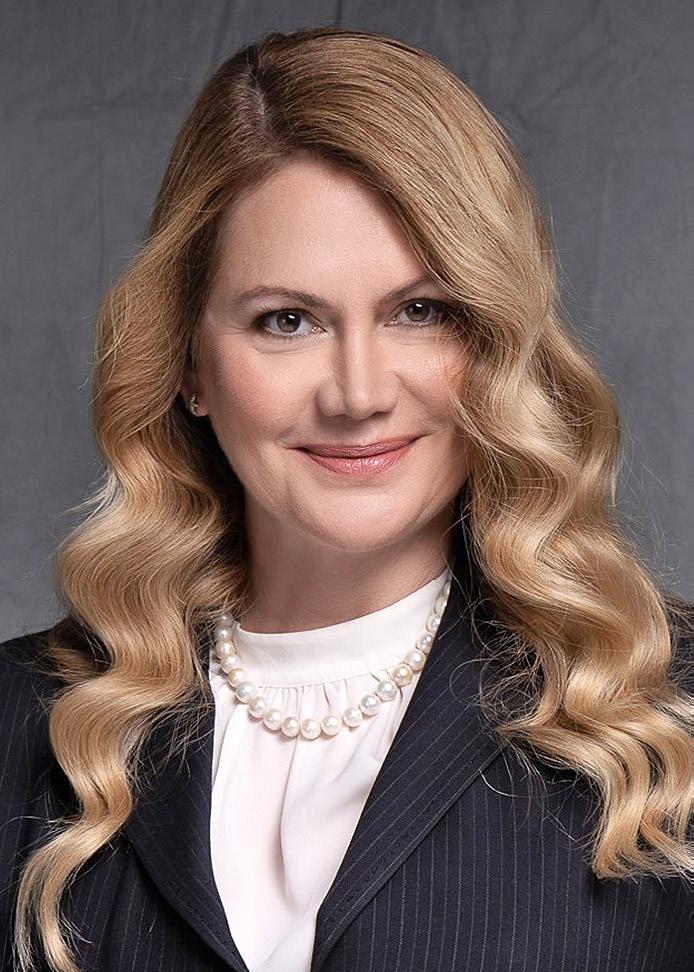
ASz: Companies, especially biggersized ones, are diligently preparing for sustainability and ESG reporting. With enterprises starting to understand that a no-compliance scenario may result in legal consequences, we expect that 20-30% of our work will be somehow ESG-related in the near future.
BBJ: ESG aside, what are significant growth areas for your firm?
EP: Our Managed Legal Services (MLS) hub, where CMS acts as an outsourced legal function, is becoming increasingly important as clients seek more cost-effective and scalable solutions to their legal needs. We’ve invested heavily in project management and legal tech to support in-house counsel in Europe and beyond, and it’s starting to pay off. We see more and more companies, including financial services firms, adopting these solutions as they free in-house legal teams from routine legal work and allow them to focus on more strategic issues.
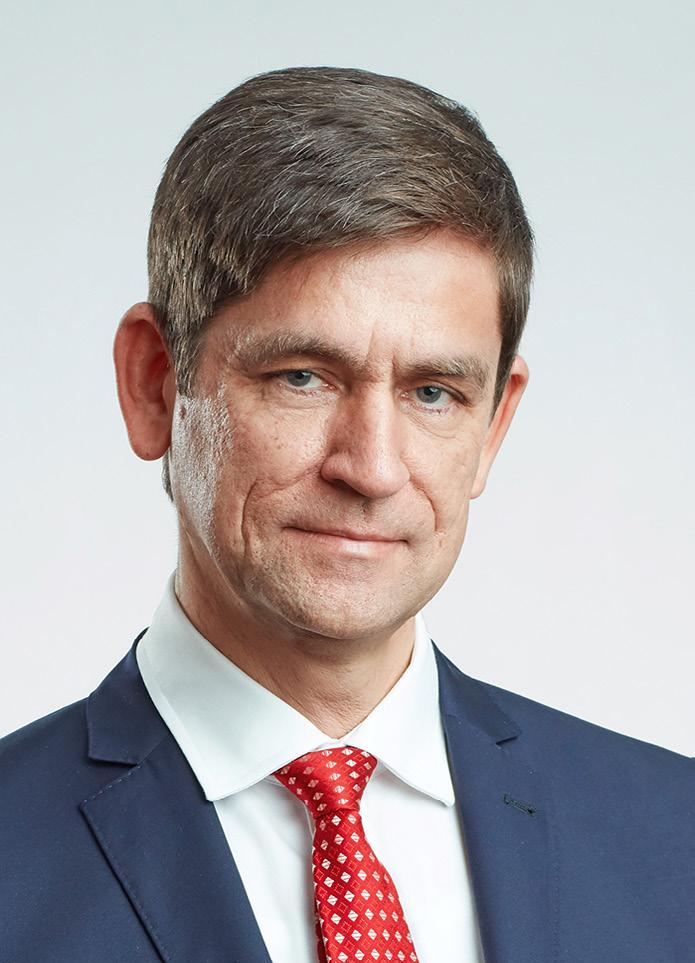
AF: AI is booming. Our firm is actively engaged in this space, providing legal guidance on AI-related matters in HR, IT/IP, financial and other sectors, but also exploring how AI can enhance our own operations. As AI continues to permeate various sectors, we are committed to staying ahead of the curve, offering informed and innovative solutions.
EK-B: An important practice for us focuses on employee stock ownership plans, which are popular due to their financial benefits, constituting a competitive advantage. Banks and corporations turn to us as few law firms have the technical expertise to successfully navigate them through the complex process of introducing an ESOP system.
BS: We see significant growth potential in almost all of our core practice areas: Greenfield projects, financial regulatory, employment, environmental compliance and regulatory work relating to AI are notable examples.
PL: Renewable energy, regulatory/ compliance, and litigation.
DG: We see a growing demand in Hungary for legal support in renewable energy projects, M&A transactions in the power and utilities sector and greenfield real estate developments.
Continued on page 20 ›››
18 | 3 Special Report www.bbj.hu Budapest Business Journal | May 31 – June 13, 2024
www.bslaw.hu
NOTE: ALL ARTICLES MARKED INSIDE VIEW ARE PAID PROMOTIONAL CONTENT FOR WHICH THE BUDAPEST BUSINESS JOURNAL DOES NOT TAKE RESPONSIBILITY INSIDE VIEW
BSLAW BUDAPEST
Péter Lakatos
Eszter Kamocsay-Berta

Do not Delay in Registering the Amount of Your Pledges
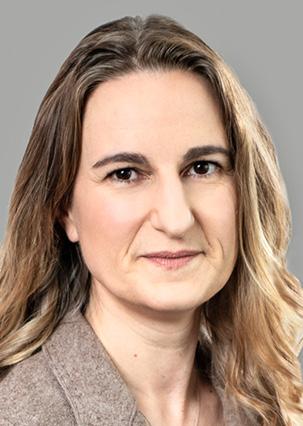 Dr. Edina Nagy Lawyer, Director
Ügyvédi Iroda
Dr. Edina Nagy Lawyer, Director
Ügyvédi Iroda
To ensure the safety and smoothness of lending practices, it was deemed necessary to make information on company pledges more transparent. Therefore, according to the new rules of the Company Act, firms with credits have to register the amount of their pledges.
The deadline for the registration of pledges created before Jan. 1, 2024, is the first amendment of information recorded in the company register, but not later than Dec. 31, 2024. It is worth respecting this deadline, both because companies can make their notification free of charge before it expires and because failure to do so would constitute an infringement. The application concerning a pledge may be submitted via a legal representative.
Before June 24, 2023, the Hungarian Civil Code did not demand that the parties to a contract specify the exact extent of the pledgor’s liability when the contract was signed. This meant that third parties could find out that certain assets had been pledged but they could not determine the amount of the liability. This regulation created problems for the economically crucial lifeline of loan financing. For this reason, the relevant rules were modified as of June 24 last year.
Under the new rules, generally, all pledge contracts must now state the amount of the secured claim or the maximum amount up to which the pledgee may seek satisfaction from the pledged assets.
In line with the modification of the Civil Code, the rules governing the registration of pledges over shares in the company register also changed. Since Jan. 1, the company register has to state the amount of claims secured with a pledge or the maximum amount up to which the pledgee may seek satisfaction from the pledged shares, and the prohibition of sale and encumbrance created on the shares (if any) and,
finally, information on any sub-pledge created by pledging the pledge over the shares. The new rules of the Companies Act apply to existing and new pledges equally.
However, the new rules are not entirely logical because the shareholder acting as the pledgor and the pledgee are responsible for having changes associated with a pledge recorded, whereas other changes in corporate information must be reported to the competent court of registration by the company itself (or more precisely, its management).
A pledgee will almost surely not be aware when the relevant company first applies for the registration of corporate changes after Jan. 1, 2024, and a shareholder acting as pledgor will not necessarily be aware of this either, unless it cooperates closely with the company’s management. The requirement to align the reporting of information on a pledge with the first application for registration of corporate changes is also curious because two separate submissions will have to be made anyway: one by the pledgor or the pledgee and the other by the company itself.
An application concerning a pledge may be submitted via a legal representative, and no fees are payable if the submission is made within the deadline. Failure to perform this obligation will not affect the existence of the pledge or the pledgee’s rights, but the relevant fees will be payable if the deadline is missed.
Many Hungarian banks have already reminded their debtors to provide for the additional information to be recorded in the company register. However, in the case of foreign financing banks, it will instead be the Hungarian debtors and their shareholders who will have to keep track of the relevant amendments to be made in time.
LeitnerLaw Szabó & Partners works closely with the 30-year-old LeitnerLeitner, a tax, accounting consultancy and audit firm. Due to this, LeitnerLeitner and LeitnerLaw clients have access to all the services related to economic and business matters in-house. LeitnerLaw Szabó & Partners Law Office supports its clients with advice in various areas of international business: for example, family businesses, corporate transactions, banking and finance, restructuring and insolvency, commercial matters, labor law and tax.
Continued from page 18 ›››
ASz: Dispute resolution is booming. We are working on significant cases with excellent and prestigious clients. Our civil law work is increasing, as is our IP-related litigation. We have substantially increased mandates in competition, antitrust and consumer

protection matters. Our corporate, restructuring and employment law teams are constantly busy.
Zoltán Faludi: We have been especially active advising on multiple cross-border M&A deals in the financial services and TMT sectors; creating the country’s largest joint venture in the waste management sector; assisting lenders financing the capital’s airport; representing clients in litigations covering various sectors (manufacturing, transportation, FMCG); running sensitive internal investigations and compliance matters; as well as supporting the decarbonization of Hungary through renewable energy projects and battery storage solutions; all in combination with first-class tax advice.
BBJ: 2023 was another record year for FDI inflows. This implies the Hungarian legal environment supports foreign businesses, but are there any bottlenecks or restrictions you would like to see removed?
special rules are often accompanied by a pronounced political overtone, which can be particularly damaging in cases where maintaining a healthy competitive market structure would otherwise best serve Hungarian interests. This applies not only to Western investors but also to Eastern (especially Chinese) investors, who have recently become increasingly active in Hungary. They will equally seek and value certainty and predictability.
BS: In our experience, more predictability and a slower pace in changing the rules would be appreciated and decrease the country risk profile.
ISz: At first glance, this conclusion may seem correct, but the rapidly changing legal environment is not something with which the business community is satisfied. Although there is a trend worldwide to introduce more protectionist FDI rules, the control of incoming investment should be regulated more clearly and predictably. This would lead to more transparency and more activity in direct investment.
BBJ: What impact, if any, do you expect for the legal market from Hungary holding the rotating presidency of the Council of the EU from July 1?
BS: The presidency is a significant opportunity that comes only once in almost 14 years. Should it be successful, then it can contribute to raising the profile of Hungary, including the Hungarian legal profession, within the EU.
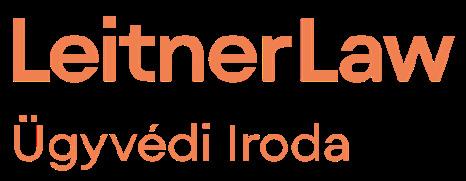
ZF: Indeed, 2023 was another record year for foreign investment, with several industries (automotive, renewables, IT, life sciences) seeing outstanding deal activity. This trend does not look set to change drastically in 2024. What is essential for investors in a business environment with such intense dynamics is the predictability of the regulatory and legal framework, reliable and efficient administrative procedures and legal certainty. Newly introduced sector-specific regulatory special rules, labeled exceptions to existing procedures, or subjecting other recipients to more stringent and different regulations will not help to maintain investor comfort. Such

PL: Nothing major, except the country being in the spotlight: not necessarily positively.
ISz: The EU Presidency will undoubtedly attract attention in world and EU politics, but I do not expect any significant impact on the Hungarian legal market. The duration of the presidency and the nature of the tasks that lie ahead for the respective member state are not something that would typically directly impact the legal market.
20 | 3 Special Report www.bbj.hu Budapest Business Journal | May 31 – June 13, 2024
INSIDE VIEW
LeitnerLaw
www.leitnerlaw.hu NOTE: ALL ARTICLES MARKED INSIDE VIEW ARE PAID PROMOTIONAL CONTENT FOR WHICH THE BUDAPEST BUSINESS JOURNAL DOES NOT TAKE RESPONSIBILITY
Erika Papp
Balázs Sepsey
DG: Government officials confirmed that intensifying cooperation with Southeast Asia to attract more investments will be one of the key agenda points of the upcoming European Union presidency. Hungary also intends to restart free trade talks with the region’s countries during its presidency. This might result in more investments from the Far East, meaning an increased need for legal advice.
BBJ: Judges and lawyers sit at the end of the legal process. You have to work with the laws the lawmakers give you. Are you happy with the current process for drafting new laws? What would you change?
EK-B: Drafting new laws has accelerated immensely as life gave us many unforeseen situations. This is challenging, as the lawmaking process is complex, and you have to know precisely how a change to one law might trigger others. Speeding up this process leads to a need for continuous reviews. AI technologies may help to make this process more resilient.
PL: More process, review and engagement with the market and the legal profession.
ISz: We all know how to improve the legislative process: more time for preparation, less influence of
politics, and more involvement of the experts affected by the legislation would certainly lead to higher quality work. I would like to see a shift towards this approach.

ASz: No, I’m not happy. We have been complaining for many years. Although the draft legislation is offered for review, the time for review is often unacceptably short (two or three days, including weekends). Also, comments and proposals are rarely taken into consideration. Another recurring
10 YEARS IN YOUR SERVICE
complaint is that important changes in existing laws are hidden in a so-called “salad” (saláta törvény). At the end of an otherwise insignificant law there are important changes hidden that affect something else. Lawyers must pay close attention to this fractioned legislation since it influences existing laws.
I would like more open discussions on legislation and reasonable deadlines to submit comments and proposals. We need opportunities for discussion if comments are not accepted. The legislative process should be much more transparent.
BBJ: Can you attract the quantity and quality of legal talent you require? How would you change the university law faculty curriculum?
EP: We operate several recruitment programs and have paralegal contracts with universities. Nevertheless, it is not easy to find dedicated English-speaking lawyers because international law firms are demanding workplaces. If you think about how fast the AI landscape has moved in a year, it is crucial that universities constantly update their curriculum to reflect these changes.
AP: We have been successful in finding the right talents. This is, I believe, very much due to our strategic decision to focus on longterm talent development. As part of our Talent Pool Program, we welcome interns in their second and third

year of law school studies, believing that, during early career development, the right mindset and relevant skillset can be more critical than actual technical knowledge.
Contrary to the mainstream approach to legal learning, we do not believe that the university should be less theoretical. We remind our interns that their law school years offer the best chance to understand the entire legal system before starting to specialize.
Continued on page 22 ›››


3 Special Report | 21 www.bbj.hu Budapest Business Journal | May 31 – June 13, 2024 1052 Budapest, Türr István utca 9. 2nd floor +36 1 30 131 30 kcgpartners.com info@kcgpartners.com
Dániel Gera
Ákos Fehérváry
Continued from page 21 ›››
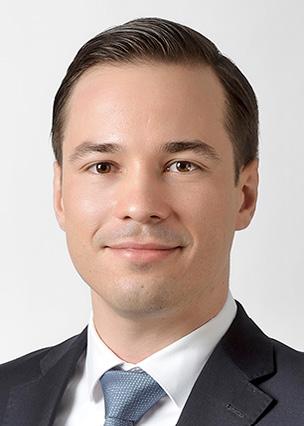 Ádám Lukonits
Virág Lőcsei Senior Associate Associate
Ádám Lukonits
Virág Lőcsei Senior Associate Associate
In the so-called second publication procedure, total public connection demand exceeded 10 GW, whereas the current average demand in Hungary is 5-6 GW.
As a result, the Hungarian Government issued a new decree[1], marking a significant step toward managing the increased grid capacity demand efficiently and fairly. But what do these fundamental changes (and the even stricter limitations) mean for stakeholders?
On the one hand, during the second publication procedure, network operators rejected applications for grid connections that could not be guaranteed before 2030, ensuring the predictability of developments. On the other hand, an order of preference has been implemented for those seeking to connect to the public grid before 2030. The list below reflects the order of preference for connection to the grid:
a) developers who failed to maintain previous capacity requests under the call for applications published at the end of 2022 but have resubmitted their request with unchanged technical content in the second publication procedure for medium-voltage grid connections; b) wind farms capable of 400 kV transmission grid connections meeting specific project and site conditions; and c) developers who also, as in example a), failed to make a declaration or pay the financial securities on time but have submitted a new application for highvoltage grid connections with the same technical content.
Moreover, developers receiving MGTs in the second publication procedure must provide an additional financial security of 5% of the benchmark investment amount, similar to the extra financial security introduced in December 2022. While the government’s decree aims to manage grid capacity efficiently and promote green energy growth, it introduces significant hurdles for developers and creates a more challenging investment landscape. These changes are expected to decelerate new significant industrial developments while enhancing the attractiveness of new on-site investments. As Hungary’s energy market seems to be transitioning towards self-sufficiency and on-site energy production, the government is also seeking to support this shift with measures introduced earlier this year.
A new amendment to the Electricity Act [2] marks a significant shift in how property owners or tenants (i.e., users

or consumers) can establish power plants and sell electricity to on-site businesses. When it comes to establishing private grids, the principal novelty is that users and consumers can now sell electricity generated through their own power plants using these private grids. Moreover, two viable options have emerged for renewable power plants to link with a private grid, facilitating the supply of users or consumers.
Option one refers to cases where a power plant is located next to the site. In such an instance, the power plant can be connected to the private grid via an interconnector point using a producer cable line. Notably, such a connection is limited to one specific site; therefore, more than one site cannot be connected to the same power plant. In this scenario, the power plant can sell the electricity to the neighboring consumer or feed-in to the public grid via the shared grid connection point.
The second option is when a power plant is located further away from the site. In this instance, the power plant may also connect to the private grid via a producer cable line, provided that the power plant meets specific criteria. These criteria include a minimum installed capacity of 5 MW, ensuring that the electricity produced by the power plant does not result in any change in the feed-in capacity of the shared grid connection point and securing appropriate compensation agreements with the property owners affected.
These amendments are expected to unlock new business opportunities for decentralized energy systems and to make installing power plants near large industrial consumers more attractive. Considering that the construction of large industrial power plants appears to be slowing down due to changes in the regulatory environment, significant construction capacity is also expected to become available. This will likely incentivize large industrial users and malls to plan on-site projects, as the increased construction capacity may lead to lower construction prices. Legal guidance can ensure compliance and help adapt to this evolving market, ultimately contributing to clients’ success.
Therefore, we proudly take the responsibility of helping young talents sharpen their lawyering skills as well as finding the best practical angle for utilizing their legal knowledge. As this is the fifth year we have provided fully integrated one-stopshop services rendering legal, tax and business advisory support, we can offer young legal talents a “holistic” multidisciplinary approach to solve clients’ complex business issues.
AF: We believe in nurturing talent from the ground up, providing students with practical experiences that complement their academic learning. Our internship and paralegal programs are designed to offer a real-world perspective on the legal profession, which proves to be attractive for top talent.
EK-B: Fluctuation is an essential indicator of the agility of a law firm. We are proud to offer our colleagues an attractive career path from their student years until the top of the profession. Together with a college for advanced studies, we created a talent management program one and a half years ago for law students called Studia Pragmatica to attract talents from the beginning of their careers.
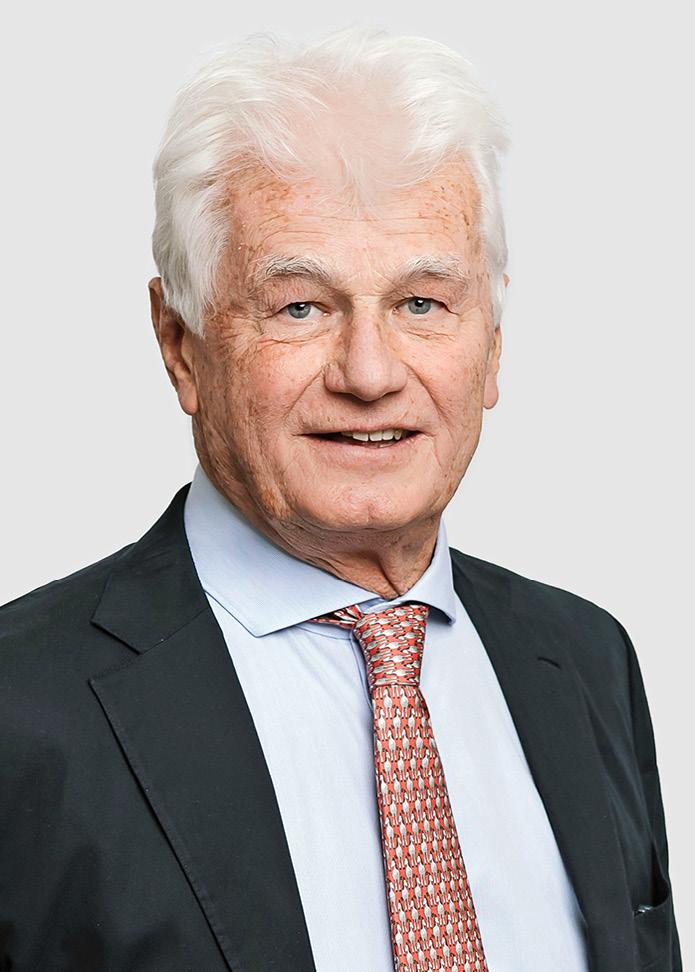
BS: While it takes more time and effort than previously, with our reputation and track record of success, we can
Our Market Talk Panel
• Erika Papp, managing partner, CMS Hungary
• András Posztl, country managing partner, DLA Piper Hungary
• Ákos Fehérváry, managing partner, Hegymegi-Barakonyi & Fehérváry Baker & McKenzie Attorneys-at-Law
• Eszter Kamocsay-Berta, managing partner, KCG Partners Law Firm
attract talented young lawyers. We also experience different expectations from the new generations, which we try to accommodate in our business model. A more practice-oriented curriculum and more emphasis on drafting skills in Hungarian and English would be appreciated.

PL: The quality of recent trainee intakes has been the best in a decade. Retention remains a problem, with many alternatives available to young lawyers at home and abroad. Due to our position as the leading independent firm on the market, we remain an attractive platform for lateral hires.
DG: Although finding and retaining talents has been an industry-wide challenge in recent years, we are not concerned. We still receive good CVs due to our internship and learning and development programs, which are integral to our employer branding activities. As for the university curriculum, I would be happy to see some more tailored/ pragmatic sessions for those who want to work in law firms. We see a growing interest from students in receiving this kind of training. That said, we put a big emphasis on teaching these skills during traineeship and junior associate tenures.
ASZ: I still believe that despite the high number of fresh law graduates, the number of quality graduates is below 10%.
• Balázs Sepsey, managing partner, Kinstellar Budapest
• Péter Lakatos, managing partner, Lakatos, Köves and Partners
• István Szatmáry, managing partner, Oppenheim Law Firm Budapest
• Dániel Gera, managing partner of Schoenherr Hungary
• András Szecskay, founder and named partner of Szecskay Attorneys at Law
• Zoltán Faludi, managing partner, Wolf Theiss
22 | 3 Special Report www.bbj.hu Budapest Business Journal | May 31 – June 13, 2024
András Szecskay
Zoltán Faludi
www.wolftheiss.com NOTE: ALL ARTICLES MARKED INSIDE VIEW ARE PAID PROMOTIONAL CONTENT FOR WHICH THE BUDAPEST BUSINESS JOURNAL DOES NOT TAKE RESPONSIBILITY
WOLF THEISS BUDAPEST
WOLF THEISS BUDAPEST
INSIDE VIEW Greening Your Strategy: Market Players’ Guide to Adapting to Changes in the
[1] Government Decree 54/2024. (III. 6.); [2] Act XCIX of 2023 of Hungary
Renewable Energy Sector
English Law, Business-as-usual, Film Financing, and the Future of AI
The CMS Budapest law firm recently named several new partners. The Budapest Business Journal sat down with all three. Excerpts.
ESZTER TÖRÖK
An English-qualified finance and corporate lawyer, Török works in the Finance and Corporate groups.
BBJ: How come you are dual-qualified in England and Hungary?
Eszter Török: I went to university in Oxford in the United Kingdom and was a trainee in what was then known as McKenna & Co in London. So, I qualified in the U.K. first, and years later, when Hungary joined the EU and the U.K. was still part of it, it was possible to qualify in other member states. I have been a dual qualified since 2007. Initially, I was a trainee in London in the late ’90s. I was then seconded to the Budapest office as part of my traineeship, and I sort of stayed here and never made it back to London. I was an associate in the corporate team for 10 years. Then I left and was general counsel at a pharma company for 10 years. I returned in 2015 and have worked in the banking and finance and corporate teams since.
BBJ: How useful is it to be able to offer English legal advice in CEE? Has Brexit changed this?
ET: It’s definitely useful. A lot of transactions in the region are under English law. Quite a few clients, mainly international financial institutions, have a policy of only contracting under English law, subject to certain exceptions like local security agreements. They don’t always want to go to large City firms in London, especially for their mid-sized transactions. There’s a strong argument for approaching us rather than a City law firm in terms of commercial viability. And we know the region and the players, and I speak the language. As to Brexit, it transpired quite early on that it’s not really an issue because a new piece of U.K. legislation provides that a contract will be governed by the law chosen by the parties, based on the principle of party autonomy.
ÁGNES SÓLYOM
As a partner, she is responsible for CMS’ Managed Legal Services Hub in Budapest. An IP and entertainment law specialist, Sólyom works in the Commercial, IP and TMT groups.
BBJ: What is the Managed Legal Services Hub?
Ágnes Sólyom: It’s a relatively new business line that we have been running

since 2019. We support repeated work streams that an in-house legal team would otherwise provide. CMS brings together not just lawyers but also innovation, technology, and project management teams, as well as deep sector expertise from our global network. We could see in-house legal teams struggling with an unprecedented change in the market. There has been this regulatory tsunami in the last five years, not just in the digital market but also in every industry. In-house lawyers could not follow the new laws, identify the changes needed in their internal processes, do the day-to-day job, and focus on strategic work. With the MLS team, we can take away some of the business-as-usual workstreams and basically give our clients their time back. We will have a team of lawyers dedicated to a specific client, trained for their specifics. We have multi-jurisdictional lawyers who are U.K.-, U.S.-, or Chinese-qualified and cover a lot of languages from the Budapest hub. As part of the MLS service, we focus also on what we call a “continuous improvement” stream. As we learn more data and gain more insight, we can advise the client on improving their template sets, prepare fallback positions, and so on.
BBJ: You are also involved with film production, a growing field for CMS. How does that come about?
AS: I’ve always been an intellectual property lawyer; that’s my specialization. We have been expanding our work for IP in film production as Hungary is the second largest shooting country in Europe after the United Kingdom (because Hungary has a very generous tax rebate system for film shooting, there are a lot of productions). It’s a fascinating
word, as you can imagine. The whole contractual structure of productions is quite different from what we’re used to in, say, businesses-as-usual IP contracts. Since time is of essence in productions, we are used to provide business friendly but legally accurate support within relatively short time periods
KATALIN HORVÁTH
As a technology law expert, she works in the Commercial, IP and TMT groups. Horváth’s areas of expertise are emerging technologies, banktech, fintech, software, IT and AI.
BBJ: Do you just cover Hungary, or do you work across the CMS network?
Katalin Horváth: We advise multinational companies across the whole EU on different cybersecurity, open finance, AI, or other banking technology issues that have an EU-level legislative background. Good examples are GDPR, the new cybersecurity regulation for the finance sector, the EU AI Act, the NIS2 directive, the new payment service regulation, new EU provisions on sharing financial data and the new EU crypto regulation. And there are jurisdictionally-agnostic issues, such as cyberattacks, or, for example, digital transformation and paperless projects where I can support my clients cross-border. On one side, I’m advising multinational big tech companies, banking and finance suppliers, IT companies and practically every type of businesses, because every company is a tech company with everyday technology related legal issues. And, on the other side, I am also advising the banks and other financial entities on technology law issues. It is good that we can connect banking and finance law with technology
law. I’m kind of a bridge here in Budapest between our technology team and the banking and finance team.
BBJ: What are the latest trends in bank tech?
KH: From the process side, the hottest trend is now the digital transformation of financial entities, meaning online onboarding and electronic contracting processes, online AML processes, electronic customer authentication, e-signature issues. From the technology side, the trend is still cloud computing; blockchain and AI also have a big impact on the banking and finance sector. It’s fascinating how software development changed from a code-heavy to a low-code or no-code development style. And we need to follow those trends in the contracts as well.
I need to learn new things every day in technology, for example, decentralized finance, or microservices and containerization, which together as containerized microservices are essential to cloud migration and digital transformation and will replace the monolithic legacy systems. If I don’t understand the essence of the technology, I can’t draft a good contract about it, and I can’t properly advise the client.
BBJ: Is there a dystopian future where AI replaces lawyers?
KH: Lawyers – and humans – will always be needed, even if AI will do the majority of the tasks. AI can’t assess and understand subjective things in law like good faith, bad faith, fairness or damage compensation law issues, such as who is responsible for what; and AI can’t decide whether a creative work, for example a novel, a painting, or a piece of software has individual, original characteristics which ensure copyright protection.
3 Special Report | 23 www.bbj.hu Budapest Business Journal | May 31 – June 13, 2024
ROBIN MARSHALL
PRESENTED CONTENT
A trio of partners: (from left) Katalin Horváth, technology law expert, Eszter Török, an Englishlaw qualified finance and corporate lawyer, and Ágnes Sólyom, IP and film financing specialist.
Top-ranked Law Firms
BELOW IS THE LIST OF LAW FIRMS WITH INTERNATIONAL AFFILIATIONS OPERATING IN HUNGARY THAT HAVE BEEN RECOMMENDED IN THE MOST AREAS OF LEGAL ACTIVITIES IN 2024 (IN TOP CATEGORIES OF VARIOUS RANKING BODIES, E.G. BAND 1 WITH CHAMBERS EUROPE AND CHAMBERS GLOBAL AND TIER 1 WITH LEGAL 500 ). THE CHARTS OF THE TOP - RANKED LAW FIRMS DO NOT INCLUDE IFLR DATA THIS YEAR, BECAUSE IT WILL BECOME AVAILABLE ONLY AFTER OUR PRINT DEADLINE. PLEASE LOOK FOR AN UPDATED VERSION OF THE SUMMARY OF THE CHARTS IN THE 2024 -2025 EDITION OF THE BOOK OF LISTS, DUE OUT THIS FALL.

24 | 3 Special Report www.bbj.hu Budapest Business Journal | May 31 – June 13, 2024
CHAMBERS GLOBAL 2024 BAND 1 CHAMBERS EUROPE 2024 BAND 1 LEGAL 500 2024 TIER 1 TOTAL NUMBER OF RECOMMENDATIONS CMS 3 7 10 20 DLA PIPER HUNGARY 3 5 8 16 HEGYMEGI-BARAKONYI AND FEHÉRVÁRY BAKER & MCKENZIE ATTORNEYS-AT-LAW – 3 8 11 DENTONS RÉCZICZA ÜGYVÉDI IRODA 1 3 6 10 LAKATOS, KÖVES ÉS TÁRSAI ÜGYVÉDI IRODA – 1 9 10 KINSTELLAR ANDRÉKÓ FERENCZI & TÁRSAI ÜGYVÉDI IRODA 1 2 4 7 SIEGLER BIRD & BIRD ÜGYVÉDI IRODA – – 6 6 SZECSKAY ATTORNEYS AT LAW 1 2 3 6
Top-ranked Law Firms
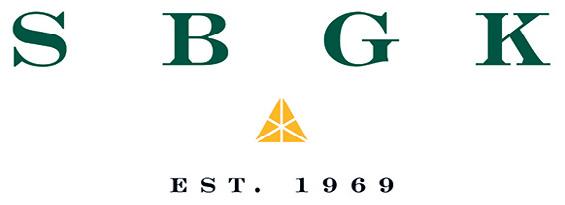

3 Special Report | 25 www.bbj.hu Budapest Business Journal | May 31 – June 13, 2024
CHAMBERS GLOBAL 2024 BAND 1 CHAMBERS EUROPE 2024 BAND 1 LEGAL 500 2024 TIER 1 TOTAL NUMBER OF RECOMMENDATIONS OPPENHEIM ÜGYVÉDI IRODA – – 3 3 WOLF THEISS FALUDI ÜGYVÉDI IRODA – 1 2 3 JALSOVSZKY – 1 1 2 SBGK ÜGYVÉDI IRODA – 1 1 2 A&O SHEARMAN KÁDÁR ÜGYVÉDI IRODA – – 1 1 KCG PARTNERS ÜGYVÉDI TÁRSULÁS – – 1 1 LFB – LÁSZLÓ FEKETE BAGAMÉRY – – 1 1 NAGY & TRÓCSÁNYI ÜGYVÉDI IRODA – – 1 1 SCHÖNHERR HETÉNYI ÜGYVÉDI IRODA – – 1 1 VÁMOSI-NAGY ERNST & YOUNG LAW OFFICE – – 1 1 VJT & PARTNERS – – 1 1
Banking & Finance
Corporate/M&A
Dispute resolution
CMS DLA Piper Hungary KINSTELLAR Andrékó Ferenczi & Társai Ügyvédi Iroda
CMS Dentons Réczicza Ügyvédi Iroda DLA Piper Hungary
CMS DLA Piper Hungary Szecskay Attorneys at Law
CHAMBERS GLOBAL 2024
Dentons Réczicza Ügyvédi Iroda
Lakatos, Köves és Társai
Ügyvédi Iroda
Siegler Bird & Bird Ügyvédi Iroda
KINSTELLAR Andrékó Ferenczi & Társai Ügyvédi Iroda
Lakatos, Köves és Társai
Ügyvédi Iroda
Siegler Bird & Bird Ügyvédi Iroda
Lakatos, Köves és Társai
Ügyvédi Iroda
Nagy és Trócsányi
Oppenheim Ügyvédi Iroda
Siegler Bird & Bird Ügyvédi Iroda
A&O Shearman Kádár Ügyvédi Iroda
Hegymegi-Barakonyi and Fehérváry Baker & McKenzie
Attorneys-at-Law
Szecskay Attorneys at Law
Wolf Theiss Faludi Ügyvédi Iroda
Hegymegi-Barakonyi and Fehérváry Baker & McKenzie
Attorneys-at-Law
Oppenheim Ügyvédi Iroda
Szecskay Attorneys at Law Wolf Theiss Faludi Ügyvédi Iroda
Bittera, Kohlrusz & Tóth LFB – László Fekete Bagaméry
CHAMBERS EUROPE 2024
Gárdos Mosonyi Tomori Ügyvédi Iroda
HP Legal | Hajdu & Partner Law Office
Jalsovszky
Schönherr Hetényi Ügyvédi Iroda Vámosi-Nagy Ernst & Young Law Office
Schönherr Hetényi Ügyvédi Iroda
A&O Shearman Kádár Ügyvédi Iroda
Banking & Finance
Competition / Antitrust
CMS DLA Piper Hungary
KINSTELLAR Andrékó Ferenczi & Társai Ügyvédi Iroda
CMS DLA Piper Hungary
Hegymegi-Barakonyi and Fehérváry Baker & McKenzie Attorneys-at-Law
Corporate / M&A
Dispute resolution
Employment
Intellectual property
Life sciences
Projects and energy
Real estate
CMS Dentons Réczicza Ügyvédi Iroda DLA Piper Hungary
CMS DLA Piper Hungary Szecskay Attorneys at Law
Hegymegi-Barakonyi and Fehérváry Baker & McKenzie Attorneys-at-Law
SBGK Ügyvédi Iroda Szecskay Attorneys at Law
CMS
Hegymegi-Barakonyi and Fehérváry Baker & McKenzie Attorneys-at-Law
KINSTELLAR Andrékó Ferenczi & Társai Ügyvédi Iroda
Wolf Theiss Faludi Ügyvédi Iroda
CMS Dentons Réczicza Ügyvédi Iroda
Tax DLA Piper Hungary Jalsovszky
TMT
CMS Dentons Réczicza Ügyvédi Iroda Lakatos, Köves és Társai Ügyvédi Iroda
Dentons Réczicza Ügyvédi Iroda Lakatos, Köves és Társai Ügyvédi Iroda Siegler Bird & Bird Ügyvédi Iroda
Dentons Réczicza Ügyvédi Iroda Lakatos, Köves és Társai Ügyvédi Iroda
KINSTELLAR Andrékó Ferenczi & Társai Ügyvédi Iroda
Lakatos, Köves és Társai Ügyvédi Iroda
Siegler Bird & Bird Ügyvédi Iroda
Lakatos, Köves és Társai Ügyvédi Iroda Nagy & Trócsányi Ügyvédi Iroda Oppenheim Ügyvédi Iroda Siegler Bird & Bird Ügyvédi Iroda
CMS DLA Piper Hungary Pál és Kozma Ügyvédi Iroda VJT & Partners
Danubia Legal Oppenheim Ügyvédi Iroda Siegler Bird & Bird Ügyvédi Iroda
Szecskay Attorneys at Law
CMS Dentons Réczicza Ügyvédi Iroda DLA Piper Hungary
Hegymegi-Barakonyi and Fehérváry Baker & McKenzie
Attorneys-at-Law
Lakatos, Köves és Társai Ügyvédi Iroda
CMS
Hegymegi-Barakonyi and Fehérváry Baker & McKenzie
Attorneys-at-Law
Vámosi-Nagy Ernst & Young Law Office
DLA Piper Hungary VJT & Partners
Hegymegi-Barakonyi and Fehérváry Baker & McKenzie Attorneys-at-Law
Szecskay Attorneys at Law
Wolf Theiss Faludi Ügyvédi Iroda
A&O Shearman Kádár Ügyvédi Iroda
KINSTELLAR Andrékó Ferenczi & Társai Ügyvédi Iroda
CERHA HEMPEL Dezső & Partners
Oppenheim Ügyvédi Iroda
Schönherr Hetényi Ügyvédi Iroda Szecskay Attorneys at Law
Hegymegi-Barakonyi and Fehérváry Baker & McKenzie Attorneys-at-Law
Oppenheim Ügyvédi Iroda
Szecskay Attorneys at Law
Wolf Theiss Faludi Ügyvédi Iroda
Bittera, Kohlrusz &Tóth Gárdos Mosonyi Tomori Ügyvédi Iroda LFB – László Fekete Bagaméry
Oppenheim Ügyvédi Iroda Szecskay Attorneys at Law
CMS Hegymegi-Barakonyi and Fehérváry Baker & McKenzie Attorneys-at-Law
KNP Law Nagy-Koppány & Lencs
Oppenheim Ügyvédi Iroda
DLA Piper Hungary
KINSTELLAR Andrékó Ferenczi & Társai Ügyvédi Iroda
Oppenheim Ügyvédi Iroda Szécsényi and Partners
Lakatos, Köves és Társai Ügyvédi Iroda
Wolf Theiss Faludi Ügyvédi Iroda
Hegymegi-Barakonyi and Fehérváry Baker & McKenzie
Attorneys-at-Law
PROVARIS Varga & Partners
Siegler Bird & Bird Ügyvédi Iroda
Szecskay Attorneys at Law
26 | 3 Special Report www.bbj.hu Budapest Business Journal | May 31 – June 13, 2024
LEGAL ACTIVITIES BAND 1 BAND 2 BAND 3 BAND 4
LEGAL ACTIVITIES BAND 1 BAND 2 BAND 3
Banking, finance and capital markets
Competition
Data privacy and data protection
Dispute resolution
Employment
Projects
Real estate & construction
A&O Shearman Kádár Ügyvédi Iroda
CMS
Dentons Réczicza Ügyvédi Iroda
DLA Piper Hungary
KINSTELLAR Andrékó Ferenczi & Társai
Ügyvédi Iroda
Lakatos, Köves és Társai Ügyvédi Iroda
Siegler Bird & Bird Ügyvédi Iroda
Wolf Theiss Faludi Ügyvédi Iroda
CMS
Dentons Réczicza Ügyvédi Iroda
DLA Piper Hungary
Hegymegi-Barakonyi and Fehérváry
Baker & McKenzie Attorneys-at-Law
KINSTELLAR Andrékó Ferenczi & Társai Ügyvédi Iroda
Lakatos, Köves és Társai Ügyvédi Iroda
CMS Dentons Réczicza Ügyvédi Iroda
DLA Piper Hungary
Hegymegi-Barakonyi and Fehérváry Baker & McKenzie Attorneys-at-Law
KINSTELLAR Andrékó Ferenczi & Társai
Ügyvédi Iroda
Lakatos, Köves és Társai Ügyvédi Iroda
Oppenheim Ügyvédi Iroda
Schönherr Hetényi Ügyvédi Iroda
Siegler Bird & Bird Ügyvédi Iroda
CMS Dentons Réczicza Ügyvédi Iroda
Hegymegi-Barakonyi and Fehérváry
Baker & McKenzie Attorneys-at-Law Lakatos, Köves és Társai Ügyvédi Iroda
CMS
DLA Piper Hungary Lakatos, Köves és Társai Ügyvédi Iroda LFB – László Fekete Bagaméry Nagy & Trócsányi Ügyvédi Iroda Oppenheim Ügyvédi Iroda Szecskay Attorneys at Law
CMS
DLA Piper Hungary
Hegymegi-Barakonyi and Fehérváry Baker & McKenzie Attorneys-at-Law Lakatos, Köves és Társai Ügyvédi Iroda Szecskay Attorneys at Law VJT & Partners
Hegymegi-Barakonyi and Fehérváry Baker & McKenzie Attorneys-at-Law
Oppenheim Ügyvédi Iroda
SBGK Ügyvédi Iroda
Siegler Bird & Bird Ügyvédi Iroda
Szecskay Attorneys at Law
CMS Dentons Réczicza Ügyvédi Iroda
DLA Piper Hungary
KINSTELLAR Andrékó Ferenczi & Társai Ügyvédi Iroda
Lakatos, Köves és Társai Ügyvédi Iroda
Siegler Bird & Bird Ügyvédi Iroda
Wolf Theiss Faludi Ügyvédi Iroda
CMS Dentons Réczicza Ügyvédi Iroda
Hegymegi-Barakonyi and Fehérváry
Baker & McKenzie
Attorneys-at-Law
Lakatos, Köves és Társai Ügyvédi Iroda
Siegler Bird & Bird Ügyvédi Iroda
CMS DLA Piper Hungary
LEGAL 500 2024
Deloitte Legal Göndöcz and Partners Law Firm
Gárdos Mosonyi Tomori Ügyvédi Iroda
Hegymegi-Barakonyi and Fehérváry Baker & McKenzie
Attorneys-at-Law
HP Legal | Hajdu & Partners | Law Firm
Kapolyi Law Firm
Partos & Noblet Ügyvédi Iroda
Schönherr Hetényi Ügyvédi Iroda
Szecskay Attorneys at Law
A&O Shearman Kádár Ügyvédi Iroda Bassola Law Firm
CERHA HEMPEL Dezső és Társai Ügyvédi Iroda
Partos & Noblet Ügyvédi Iroda
Schönherr Hetényi Ügyvédi Iroda
Siegler Bird & Bird Ügyvédi Iroda
Szecskay Attorneys at Law
A&O Shearman Kádár Ügyvédi Iroda Forgó, Damjanovic és Társai Ügyvédi Iroda
Partos & Noblet Ügyvédi Iroda
Szecskay Attorneys at Law
VJT & Partners
Wolf Theiss Faludi Ügyvédi Iroda
Deloitte Legal Göndöcz and Partners Law Firm
KINSTELLAR Andrékó Ferenczi & Társai Ügyvédi Iroda
KPMG Legal Tóásó Law Firm
Siegler Bird & Bird Ügyvédi Iroda
Taylor Wessing Hungary VJT & Partners
CERHA HEMPEL Dezső és Társai Ügyvédi Iroda
Dentons Réczicza Ügyvédi Iroda Forgó, Damjanovic és Társai Ügyvédi Iroda
Gárdos Mosonyi Tomori Ügyvédi Iroda Hegymegi-Barakonyi and Fehérváry Baker & McKenzie Attorneys-at-Law Réti, Várszegi és Társai Ügyvédi Iroda PwC Legal Schönherr Hetényi Ügyvédi Iroda
Siegler Bird & Bird Ügyvédi Iroda Szabó, Kelemen és Társai Andersen Ügyvédi Iroda
Wolf Theiss Faludi Ügyvédi Iroda
Forgó, Damjanovic és Társai Ügyvédi Iroda
KCG Partners Ügyvédi Társulás
KINSTELLAR Andrékó Ferenczi & Társai Ügyvédi Iroda Oppenheim Ügyvédi Iroda
Sándor Szegedi Szent-Ivány Komáromi Eversheds Sutherland Ügyvédi Iroda
Siegler Bird & Bird Ügyvédi Iroda
CMS
Dentons Réczicza Ügyvédi Iroda
DLA Piper Hungary
Lakatos, Köves és Társai Ügyvédi Iroda
Erdős • Partners
Hegymegi-Barakonyi and Fehérváry Baker & McKenzie Attorneys-at-Law
HP Legal | Hajdu & Partners Réti, Várszegi és Társai Ügyvédi Iroda PwC Legal Schönherr Hetényi Ügyvédi Iroda
Deloitte Legal Göndöcz and Partners Law Firm
DLA Piper Hungary Kapolyi Law Firm
KINSTELLAR Andrékó Ferenczi & Társai Ügyvédi Iroda Noerr
Oppenheim Ügyvédi Iroda
Partos & Noblet Ügyvédi Iroda
Schönherr Hetényi Ügyvédi Iroda
Deloitte Legal Göndöcz and Partners Law Firm
Dentons Réczicza Ügyvédi Iroda
CERHA HEMPEL Dezső és Társai Ügyvédi Iroda
Erdős • Partners
Forgó, Damjanovic és Társai Ügyvédi Iroda
Jalsovszky
KPMG Legal Tóásó Ügyvédi Iroda
Moore Legal Kovács Ügyvédi Iroda Nagy & Trócsányi Ügyvédi Iroda
Oppenheim Ügyvédi Iroda
Szabó, Kelemen és Társai Andersen Ügyvédi Iroda Vámosi-Nagy Ernst & Young Law Office
Bán, S. Szabó, Rausch & Partners Ügyvédi Iroda
Deloitte Legal Göndöcz and Partners Law Firm Forgó, Damjanovic és Társai Ügyvédi Iroda KPMG Legal Tóásó Law Firm Nagy & Trócsányi Ügyvédi Iroda
Oppenheim Ügyvédi Iroda Réti, Várszegi és Társai Ügyvédi Iroda PwC Legal Szabó, Kelemen és Társai Andersen Ügyvédi Iroda VJT & Partners
bnt ügyvédi iroda
CERHA HEMPEL Dezső és Társai Ügyvédi Iroda
Deloitte Legal Göndöcz and Partners Law Firm
Jalsovszky Kapolyi Law Firm
KPMG Legal Tóásó Law Firm
Nagy & Trócsányi Ügyvédi Iroda Szabó, Kelemen és Társai Andersen Ügyvédi Iroda
TaylorWessing Hungary
DLA Piper Hungary Oppenheim Ügyvédi Iroda
PROVARIS Varga & Partners Réti, Várszegi és Társai Ügyvédi Iroda PwC Legal SBGK Ügyvédi Iroda
Schönherr Hetényi Ügyvédi Iroda
Sándor Szegedi Szent-Ivány Komáromi Eversheds Sutherland Ügyvédi Iroda Wolf Theiss Faludi Ügyvédi Iroda
Kapolyi Law Firm Lohn Ügyvédi Iroda
Sándor Szegedi Szent-Ivány Komáromi Eversheds Sutherland Ügyvédi Iroda TaylorWessing Hungary VJT & Partners
bnt ügyvédi iroda
Deloitte Legal Göndöcz and Partners Law Firm
Dentons Réczicza Ügyvédi Iroda
KPMG Legal Tóásó Law Firm
Schönherr Hetényi Ügyvédi Iroda
TaylorWessing Hungary
Wolf Theiss Faludi Ügyvédi Iroda
Danubia Legal Schönherr Hetényi Ügyvédi Iroda TaylorWessing Hungary
Wolf Theiss Faludi Ügyvédi Iroda
Bán, S. Szabó, Rausch & Partners Ügyvédi Iroda CERHA HEMPEL Dezső és Társai Ügyvédi Iroda
Deloitte Legal Göndöcz and Partners Law Firm Forgó, Damjanovic és Társai Ügyvédi Iroda KCG Partners Ügyvédi Társulás Oppenheim Ügyvédi Iroda
Szabó, Kelemen és Társai Andersen Ügyvédi Iroda Szecskay Attorneys at Law
CERHA HEMPEL Dezső és Társai Ügyvédi Iroda
Jalsovszky KCG Partners Ügyvédi Társulás Lohn Ügyvédi Iroda
Réti, Várszegi és Társai Ügyvédi Iroda PwC Legal Szabó, Kelemen és Társai Andersen Ügyvédi Iroda
Szecskay Attorneys at Law
Szécsényi and Partners
TaylorWessing Hungary
Wolf Theiss Faludi Ügyvédi Iroda
Forgó, Damjanovic és Társai Ügyvédi Iroda
Technology, Media, Telecommunications
Hegymegi-Barakonyi and Fehérváry Baker & McKenzie Attorneys-at-Law
Lakatos, Köves és Társai Ügyvédi Iroda
Siegler Bird & Bird Ügyvédi Iroda
CMS DLA Piper Hungary
Hegymegi-Barakonyi and Fehérváry
KINSTELLAR Andrékó Ferenczi & Társai Ügyvédi Iroda
Szecskay Attorneys at Law
VJT & Partners
Csővári Legal
Deloitte Legal Göndöcz and Partners Law Firm
Lakatos, Köves és Társai Ügyvédi Iroda
Partos & Noblet Ügyvédi Iroda
PROVARIS Varga & Partners Wolf Theiss Faludi Ügyvédi Iroda Tax
LFB – László Fekete Bagaméry
Baker & McKenzie Attorneys-at-Law
Jalsovszky
KCG Partners Ügyvédi Társulás
Vámosi-Nagy Ernst & Young Law Office
Nagy & Trócsányi Ügyvédi Iroda Réti, Várszegi és Társai Ügyvédi Iroda PwC Legal
Szecskay Attorneys at Law
Wolf Theiss Faludi Ügyvédi Iroda
3 Special Report | 27 www.bbj.hu Budapest Business Journal | May 31 – June 13, 2024
LEGAL ACTIVITIES TIER
TIER 2 TIER
1
3
Commercial, Corporate & M&A
Intellectual property
and energy
ESG Reporting for Global Competitiveness: Minimum Questionnaire to Help
 Judit Budai Senior Partner
Szecskay Attorneys at Law
Judit Budai Senior Partner
Szecskay Attorneys at Law
The Hungarian legislator adopted Act CVIII of 2023 on corporate social responsibility, considering environmental, social and societal aspects (known as the “ESG Act”) to promote sustainable finance and unified corporate responsibility.
The ESG Act gradually enters into force for different players within three years but, in general, was applicable as of Jan. 1. It is a frame regulation and also amended other relevant rules. Further decrees are expected to clarify implementation.
The ESG Act created two sets of compliance obligations: sustainability due diligence obligations and ESG reporting applicable gradually to public and private large enterprises and public SMEs, and the regulation of accreditation and recording of ESG advisors and trainers, auditors, software developers, distributors, and certifiers to create a transparent domestic service provider framework.
While the ESG Act also amended the Hungarian Accounting Act to harmonize sustainability non-financial reporting obligations, ESG reporting on the supply chain due diligence system is a new compliance and reporting obligation.
Through this legislation, Hungary (following Germany but before the adoption by the EU of the pending proposal for a directive on corporate sustainability due diligence) created a framework to monitor the entire supply chain performance. Enterprises carry the obligation to:
a) Establish an effective sustainability risk management system;
b) Develop an internal responsibility strategy and monitoring system;
c) Carry out regular risk analyses;
d) Establish preventive and corrective measures;
e) Comply with ESG reporting obligations; and
f) Obtain the declaration of direct suppliers in view of the risks involved.
An effective sustainability risk management system must enable the identification and management of significant social and environmental risks with adverse impacts and the
prevention, elimination or minimization of breaches of social or environmental obligations within the supply chain.
It should be noted that only the ICT system of an accredited supplier that distributes and produces ESG software in Hungary, as defined in the ESG Act, may be used for supply chain due diligence and risk analysis and rating.
Developing and operating an effective risk management system requires involving risk management tasks in all relevant business processes, appointing an employee as an independent risk management officer to conduct annual full-scale risk assessment, and establishing a whistleblowing system for ESG breaches. Enterprises can prepare and submit their ESG reports free of charge to the Supervisory Authority for Regulated Activities (Sara) for publication through the publicly accessible ESG platform.
Company management is responsible for preparing and publishing an ESG report in compliance with EU and Hungarian rules within six months from the end of the financial year. It must be approved by a certified ESG auditor, prepared in a regulated format and deliver the company’s findings, measurements and conclusions regarding sustainability issues.
The complete list of possible sanctions in case of non-compliance is yet to be set out in government decrees, but a revenue-based fine or exclusion from state subsidy or procurement processes may be expected.
At this early stage, the sustainability due diligence obligation and ESG reporting aim to help local enterprises remain competitive in international markets where ESG reporting may require access to finance and a condition to stay in business by showing environmental and social responsibility to business partners.
Even if this will impose further costs on businesses and their supply chains, we may see a positive outcome if, for the purpose of compliance, Sara and the National Bank of Hungary provide a harmonized minimum questionnaire to ease the ESG reporting exercise for enterprises. In the already amended ESG Act, Sara was given the authority to establish the required content of ESG reporting, including minimum standards of a questionnaire annexed to the report and to assess claims to extend the minimum questionnaire. Based on this, we await further developments.

szecskay.com
Schoenherr Names Head of Local M&A Practice
Schoenherr has reinforced its M&A practice in Central and Eastern Europe by hiring Miklós Klenanc, senior attorney at law, as local head of M&A in Hungary. He will focus on advising national and cross-border transactions alongside Schoenherr’s CEE corporate/M&A teams.

“Schoenherr was recently awarded Mergermarket’s “CEE M&A Legal Adviser of the Year” [title], reaffirming our top position as the leading M&A advisor in the region,” said Roman Perner, co-head of Schoenherr’s M&A practice.
“Leading the Mergermarket league table as the firm with the most M&A transactions in 2023 was a great testimony to the work of our international teams. The growing number and complexity of M&A deals have increased the demand for further dedicated expertise in this field. We are thus excited to welcome Miklós Klenanc, who will boost our M&A capabilities in Hungary and the CEE region,” added Alexandra Doytchinova, the other co-head of the practice.
According to Schoenherr corporate/ M&A partner Kinga Hetényi, ‘Miklós’ addition to our already strong corporate/M&A practice in Hungary is another key step in [.…] further strengthening our Hungarian and CEE-wide offerings.”
Klenanc joined Schoenherr from an international law firm, where for more than 13 years, he advised multinational corporations and domestic SMEs across a wide array of industries. His expertise covers M&A, corporate structuring and restructuring, company simplifications, corporate law, governance and compliance, and reversed compliance (limitation of liability, internal regulations). He is also an experienced dispute prevention and dispute resolution lawyer, as well as a licensed mediator.
After obtaining his JD law degree from the University of Szeged, he
received an LL.M. in comparative constitutional law with EU specialization from Central European University. He is in the process of preparing his doctoral dissertation. Between 2017 and 2020, he was the Hungarian national representative of the International Association of Young Lawyers. Since 2019, he has been a listed mediator of the bar for client-attorney disputes. That same year, he was appointed to be the president of the Youth Committee of the Hungarian Law Society.
Szalóki
to Co-lead Wolf
Theiss’ Banking & Finance Practice in Budapest
Wolf Theiss has appointed Gergely Szalóki to co-lead its banking and finance practice in Budapest, the company tells the Budapest Business Journal Szalóki was formerly a local partner and head of the Banking and Finance practice at Schoenherr Hungary. He has vast experience advising on banking and finance, capital markets, insurance regulatory issues, and financial sector M&A transactions. He frequently acts for clients in the financial industry on both the borrower and lender side and also provides regulatory advice for the banking and insurance sectors. Szalóki regularly advises on the regulatory aspects of market entry, corporate restructurings, provision of cross-border financial, insurance, payment and investment services and compliance matters.
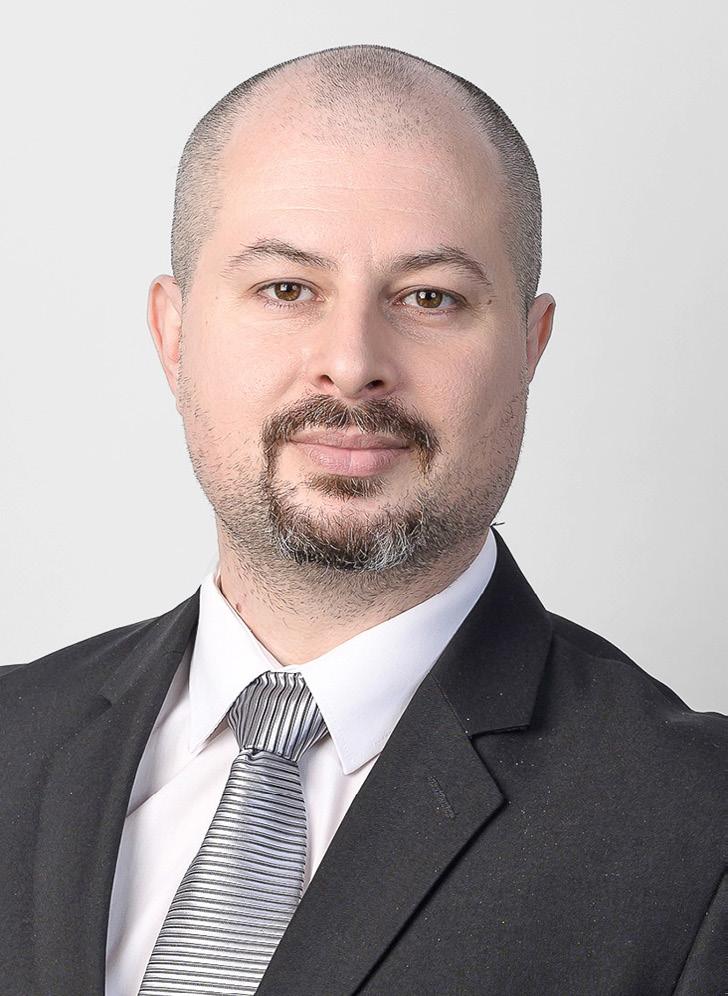
Furthermore, he is involved in bond issue transactions representing managers and issuers and acting for investment funds. He is an arbitrator at the Arbitration Court attached to the Hungarian Chamber of Commerce and Industry, as well as at the Vienna International Arbitral Center, in banking, finance and capital markets. The lawyer frequently publishes in business and academic journals and holds a teaching position at Eötvös Lóránd University, Budapest.
28 | 3 Special Report www.bbj.hu Budapest Business Journal | May 31 – June 13, 2024
INSIDE VIEW
www.
NOTE: ALL ARTICLES MARKED INSIDE VIEW ARE PAID PROMOTIONAL CONTENT FOR WHICH THE BUDAPEST BUSINESS JOURNAL DOES NOT TAKE RESPONSIBILITY WHO’S NEWS Do you know someone on the move? Send information to news@bbj.hu
Miklós Klenanc
Gergely Szalóki
Georgia (and Renewables) on Their Mind
Dentons Budapest, in cooperation with the Embassy of Georgia in Hungary and Enterprise Georgia, organized a roundtable discussion on April 18 for stakeholders interested in exploring investment opportunities in Georgia.
relations and creating opportunities for sustainable development,” she said.
After opening remarks by Gábor Király, managing officer at Dentons Budapest, Hungary’s Deputy State Secretary for External Economic Development Katalin Bihari, stressed the strategic importance of Hungary-Georgia bilateral relations.
“The close ties between Hungary and Georgia not only promote economic cooperation but also pave the way for mutually beneficial partnerships that drive growth and prosperity in both countries,” she said. It was a sentiment echoed by Tamara Liluashvili, Georgia’s ambassador in Budapest.
“Georgia and Hungary share a strong commitment to deepening economic ties and enhancing cooperation in various sectors. Events such as this roundtable play a crucial role in strengthening our bilateral
The discussion featured speakers who provided valuable insights into Georgia’s investment landscape.
“Georgia offers a variety of promising investment opportunities in various sectors, making it an attractive destination for international investors,” insisted Mikheil Khidureli, CEO of Enterprise Georgia.
Gábor Jenei, CEO of the Hungarian Export Promotion Agency, underscored the Hungarian government’s commitment to supporting foreign investment.
“We are committed to facilitating the expansion of Hungarian companies into foreign markets, including Georgia, through tailored support and incentives,” he said.
Dentons Tbilisi provided guidance on doing business in Georgia, highlighting, “Navigating the legal landscape in
NEW MANAGING PARTNER AT NAGY ÉS TRÓCSÁNYI
goals and addresses

Georgia with the right expertise and guidance, businesses can thrive and capitalize on the opportunities available in the country.”
Following the presentations, Theodore Boone, of counsel at Dentons Budapest, professor at Corvinus University, and a former chairman of AmCham Hungary, moderated a question and answer and discussion session.
10th CEE/SEE Renewables Guide
Wolf Theiss has released the 10th edition of its Guide to Generating Electricity from Renewable Sources in Central, Eastern, and Southeastern Europe for 2024.
What are the biggest internal challenges that lie ahead?
challenges
What are your goals as the new managing partner?
There are about 12,000 attorneys and 6000 law firms in Hungary, and our firm is ranked among the best in multiple practice areas. In other words, our colleagues belong to the top 1.5% of Hungarian attorneys. My main goal is not only to maintain this market position but to see it grow further
Our litigation and arbitration practice has an excellent reputation, acknowledged even by our competitors. We win most cases, both in Hungary and before international dispute resolution organizations, including cases where we protect the client from engaging in court battles that appear unreasonable, from either a legal or a business perspective.
One way to further strengthen a firm's practice is to improve talent and knowledge management. We put great effort into finding determined young talent, and our more experienced colleagues actively share their knowledge and experience with our new lawyers. We regularly hold practice group meetings where we discuss recent developments and best practices, which is also a great method for facilitating professional cohesion within the firm. In my experience, these efforts show their positive results not only internally but also in added value to clients.
We are also open to hiring lateral partners. Personally, I believe that our firm provides a superb platform to grow together. We have significant resources to do so, including our reputation, experienced legal and nonlegal personnel, impressive physical and electronic library, and great work environment.
The latest edition is an update to the previous guide published in 2022 and offers insights into the region’s evolving renewable energy sector. Against the backdrop of the EU’s ambitious 2030 targets, substantial investment into both renewable energy generation and storage capabilities has been observed across the CEE/SEE region over the past four years.
“With each edition of our guide, we aim to empower stakeholders by demystifying the legal landscape of renewable energy in the region. This comprehensive resource supports informed decision-making, fostering a sustainable and secure energy future,” says Bryan W. Jardine, partner and co-head of the energy industry group at Wolf Theiss.
The ongoing conflict in Ukraine emphasizes Europe’s imperative for energy security, prompting an accelerated shift from reliance on imported fossil fuels to a more sustainable dependence on renewable energy sources. The law firm says that the resulting geopolitical tensions have catalyzed governments and industries to expedite the adoption of renewable energy solutions, reinforcing the region’s commitment to a greener future.
The firm says the guide aims to support increased regional investment by providing a detailed overview of the pertinent laws and regulations.
One of the biggest challenges, at least from an internal management perspective, is the generational shift. In our profession, finding and maintaining a healthy work-life balance is difficult because the fluctuation of our workload is often determined by unforeseen developments coupled with short deadlines. One of my observations is that younger generations have higher expectations about work-life balance than older generations, which is quite understandable. Leadership must therefore go the extra mile to help young colleagues in managing their workload. At our firm, we try to do just that. We provide great flexibility in working hours and allow working from home tailored to the given colleague's specific needs to prevent burnout as much as we can.
At the same time, from a succession planning perspective, it is of paramount importance to guide younger colleagues through the various professional roles they undertake as they climb the career ladder Ultimately, they will be capable of doing the same for even younger generations. This is why we operate a mentoring program and have productive and regular discussions with younger colleagues, to jointly review their performance, their expectations towards the firm, and each other's experiences.
What about external challenges?
Adapting to new industries and technologies is certainly a challenge. There are several types of businesses that change and develop rapidly, just think of the discussions around crypto-assets and AI. These areas have their own unusual, nonconventional universe. Understanding the functioning, rationale, risks and language of these areas requires an open mind and a significant willingness to learn. This is also why keeping in touch with the newer generation of lawyers is particularly important. They think of new solutions, bring a fresh approach, and older generations of lawyers can help them to bring the best out of these while helping their legal thinking to evolve.

3 Special Report | 29 www.bbj.hu Budapest Business Journal | May 31 – June 13, 2024
Dr. Balázs Karsai outlines his
current
after taking over as Managing Partner at Nagy és Trócsányi
BBJ STAFF
ADVERTISEMENT Image by esfera / Shutterstock.com
Law Firms With International

30 | 3 Special Report www.bbj.hu Budapest Business Journal | May 31 – June 13, 2024
Affiliations Ranked by no. of attorneys with a license to practice law in Hungary on May 2, 2024 Integrated Advisory Solutions Legal | Tax | Business Advisory 35 years of local expertise 20 years of global impact RANK COMPANY WEBSITE NO. OF ATTORNEYS WITH LICENSE TO PRACTICE IN HUNGARY ON MAY 2, 2024 NO. OF TRAINEES IN HUNGARY ON MAY 2, 2024 NO. OF PARTNERS OF HUNGARIAN OFFICE ON MAY 2, 2024 LEGAL SPECIALITY AREAS NAME OF ASSOCIATE NON-HUNGARIAN LAW FIRM OR COOPERATION NETWORK WORLD HQ YEAR ESTABLISHED NO. OF OFFICES WORLDWIDE YEAR HUNGARIAN OFFICE ESTABLISHED TOP LOCAL EXECUTIVE ADDRESS PHONE EMAIL COMMERCIAL REAL ESTATE TAX BANKING AND FINANCE ENERGY COMPETITION EU EMPLOYMENT TMT ENVIRONMENT PROTECTION CORPORATE / M&A DISPUTE RESOLUTION INTELLECTUAL PROPERTY PUBLIC PROCUREMENT LIFE SCIENCES OTHER 1 CMS CAMERON MCKENNA NABARRO OLSWANG LLP MAGYARORSZÁGI FIÓKTELEPE cms.law 71 20 14 ✓ ✓ ✓ ✓ ✓ ✓ ✓ ✓ ✓ ✓ ✓ ✓ ✓ ✓ ✓ Data protection & cybersecurity, compliance & investigations, restructuring and insolvency, new technologies and AI, state aid, ESG, sanctions CMS Cameron McKenna Nabarro Olswang LLP London 1779 86 1989 Erika Papp 1053 Budapest, Károlyi utca 12. (1) 483-4800 budapest@cms-cmno.com
DLA PIPER HUNGARY www.dlapiper.com/hungary 60 20 14 ✓ ✓ ✓ ✓ ✓ ✓ ✓ ✓ ✓ ✓ ✓ ✓ ✓ ✓ ✓ Restructuring & insolvency, capital markets, data protection and privacy, film and media law, fintech, project finance, ESG, AI DLA Piper UK LLP London 2006 90+ 1988 András Posztl 1124 Budapest, Csörsz utca 49–51. (1) 510-1100 hungary@dlapiper.com
2

LAKATOS, KÖVES ÉS TÁRSAI ÜGYVÉDI IRODA www.lakatoskoves.hu
SZECSKAY ATTORNEYS AT LAW www.szecskay.com
Consumer protection, data protection & GDPR, aviation, investment protection, regulatory, compliance and investigations
Clifford Chance LLP, Multilaw, Interlaw, Association of European Lawyers, Global Leaders Forum
A 1991
István
1053 Budapest, Károlyi utca 12. (1) 486-2200 office@oppenheimlegal.com
Péter Lakatos
1075 Budapest, Madách Imre út 14. (1) 429-1300 info@lakatoskoves.hu mail@lakatoskoves.hu
Advertising law and consumer protection, capital markets, data protection, restructuring and insolvency, ESG / Sustainability
WSG – World Services Group, TerraLex, Legalink, EuroJuris, SCG –State Capital Group, DORDA Best Friends Network, Biolegis, Lexicom, LEGUS, INBLF
András Szecskay 1055 Budapest, Kossuth Lajos tér 16–17. (1) 472-3000 info@szecskay.com 6
RÉTI, VÁRSZEGI ÉS TÁRSAI
ÜGYVÉDI IRODA PWC LEGAL www.retivarszegipartners.hu

ÜGYVÉDI IRODA www.twobirds.com

–1992
PricewaterhouseCoopers Legal LLP London 2006 90 2000
Zoltán Várszegi 1055 Budapest, Bajcsy-Zsilinszky út 78. (1) 461-9888 hu_rvp.central@pwc.com
Bálint Halász, László Nanyista, Pál Szabó 1051 Budapest, Széchenyi István tér 7–8. (1) 301-8900 budapest@twobirds.com 7 KINSTELLAR ANDRÉKÓ FERENCZI & TÁRSAI ÜGYVÉDI IRODA www.kinstellar.com
Balázs Sepsey 1054 Budapest, Széchenyi rakpart 3. (1) 428-4400 budapest.reception@ kinstellar.com
László András Kelemen, Balázs Dominek, Domonkos Kiss, Péter Vincze

1016 Budapest, Mészáros utca 58/A (1) 288-8200 info@hu.andersenlegal.com
Zoltán Faludi
1085 Budapest, Kálvin tér 12–13. (1) 484-8800 budapest@ wien.wolftheiss.com
3 Special Report | 31 www.bbj.hu Budapest Business Journal | May 31 – June 13, 2024 RANK COMPANY WEBSITE NO. OF ATTORNEYS WITH LICENSE TO PRACTICE IN HUNGARY ON MAY 2, 2024 NO. OF TRAINEES IN HUNGARY ON MAY 2, 2024 NO. OF PARTNERS OF HUNGARIAN OFFICE ON MAY 2, 2024 LEGAL SPECIALITY AREAS NAME OF ASSOCIATE NON-HUNGARIAN LAW FIRM OR COOPERATION NETWORK WORLD HQ YEAR ESTABLISHED NO. OF OFFICES WORLDWIDE YEAR HUNGARIAN OFFICE ESTABLISHED TOP LOCAL EXECUTIVE ADDRESS PHONE EMAIL COMMERCIAL REAL ESTATE TAX BANKING AND FINANCE ENERGY COMPETITION EU EMPLOYMENT TMT ENVIRONMENT PROTECTION CORPORATE / M&A DISPUTE RESOLUTION INTELLECTUAL PROPERTY PUBLIC PROCUREMENT LIFE SCIENCES OTHER 3 DENTONS RÉCZICZA ÜGYVÉDI IRODA www.dentons.com 45 14 9 ✓ ✓ – ✓ ✓ ✓ ✓ ✓ ✓ ✓ ✓ ✓ ✓ ✓ ✓ Infrastructure and project finance, joint ventures and private equity, capital markets, financial restructuring and insolvency, data protection, media law, film finance, AI Dentons Europe LLP London 2015 160+ 2015(1)
1061 Budapest, Andrássy út 11. (1) 488-5200 –3 OPPENHEIM ÜGYVÉDI IRODA
45 14 17 ✓ ✓ – ✓ ✓ ✓ ✓ ✓ ✓ ✓ ✓ ✓ ✓ ✓ ✓ Regulated industries, IT, data, technology, cyber & AI, projects and infrastructure Freshfields Bruckhaus Deringer London 1743 29 2007
4
43 13 11 ✓ ✓ ✓ ✓ ✓ ✓ ✓ ✓ ✓ ✓ ✓ ✓ ✓ ✓ ✓
István Réczicza
www.oppenheimlegal.com
Szatmáry
–
–
5
19 ✓ ✓ ✓ ✓ ✓ ✓ ✓ ✓ ✓ ✓ ✓ ✓ ✓ ✓ ✓
36 4
––
✓ ✓ ✓ ✓ ✓ ✓ ✓ ✓ ✓ ✓ ✓ ✓ ✓ ✓ ✓ IT,
waste
34 12 1
IP and data protection, tax litigation, fiduciary asset management,
management, sport law, ESG and sustainablility regulations
6
SIEGLER BIRD & BIRD
34 11 5 ✓ ✓ ✓ ✓ ✓ ✓ ✓ ✓ ✓ ✓ ✓ ✓ ✓ ✓ ✓ Data protection, sport Bird & Bird LLP London 1846 32 2008
33 6 7 ✓ ✓ – ✓ ✓ ✓ ✓ ✓ ✓ ✓ ✓ ✓ ✓ ✓ ✓ Compliance, risk & sensitive investigations, infrastructure & projects, ESG, restructuring & insolvency Kinstellar –2008 12 2000
8 SZABÓ,
32 6 18 ✓ ✓ ✓ ✓ ✓ ✓ ✓ ✓ ✓ ✓ ✓ ✓ ✓ ✓ –Corporate restructuring and insolvency, gaming and betting, information technology, telecommunications and e-commerce Andersen Global San Francisco 2013 425 1996
KELEMEN ÉS TÁRSAI ANDERSEN ÜGYVÉDI IRODA hu.andersenlegal.com
8 WOLF THEISS
32 10 3 ✓ ✓ ✓ ✓ ✓ ✓ ✓ ✓ ✓ ✓ ✓ ✓ ✓ ✓ ✓ Acquisition and project finance, data protection, immigration law, restructuring and insolvency, compliance & investigations
1957
2007
FALUDI ÜGYVÉDI IRODA www.wolftheiss.com
Wolf Theiss Rechstanwälte GmbH Vienna
13
Fehérváry
Budapest, Dorottya utca 6. (1) 302-3330 budapest.reception@ bakermckenzie.com

Navigating the AI Landscape: Expert Insights for Business Leaders
The advent of artificial intelligence (AI) has transitioned from a silent revolution to a prominent force shaping our future. The public release of Chat GPT in late 2022 marked a significant milestone, propelling AI into the spotlight and sparking widespread discourse. This shift has not gone unnoticed in the corporate realm, where integrating AI has become a market imperative. At Baker McKenzie, we have witnessed a surge in client inquiries regarding AI adoption. They seek expertise on leveraging AI within the legal framework, and also interested in how we have implemented the technology in our own operation.
The European Union (EU) has taken proactive steps to navigate this new era by introducing the AI Act Regulation (AI Act), passed by the EU Parliament in March 2024. This groundbreaking legislation aims to protect public welfare and fundamental rights against AI’s potential risks while promoting innovation. It categorizes AI systems into four risk tiers, ranging from outright bans for unacceptable risks to voluntary ethical codes for minimal risks. The AI Act also addresses the challenges posed by general-purpose AI models, such as language generators, by implementing preventive measures against systemic risks and biases. As the first legislation of its kind, it has undergone significant refinement since its initial draft in 2021.
The AI Act’s reach is extensive, affecting all EU Member States and any providers placing on the market or putting into service AI systems or generalpurpose AI models, as well as any company deploying, importing, distributing AI within the EU. These entities must conduct thorough risk assessments, establish AI governance principles, and appoint dedicated personnel and departments to
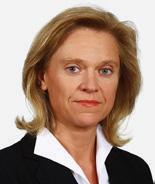
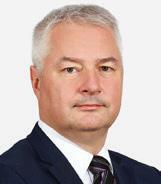
oversee AI operations as well as establish AI literacy within their organizations. High-risk system operators might further required to perform fundamental rights impact assessments. Set to be enforced in 2026, non-compliance carries severe penalties, including fines up to €35 million or 7% of the previous year’s global turnover.
Beyond the overall regulation, AI has showing its effects in the workplace, too, where AI is redefining roles, creating a symbiotic relationship between technology and human workers. It is reshaping job profiles and necessitating new skill sets. Business leaders must craft strategic AI roadmaps and engage employees in this transformation. Identifying automation opportunities and redefining job functions are critical steps in this journey. Establishing clear policies on AI usage is paramount before these tools are integrated into daily operations.
The essence of AI integration lies in its sustainable application, with a focus on enhancing human capabilities. AI has the potential to free individuals from repetitive tasks, enabling them to engage in more intellectually stimulating activities. As we embrace these technological advancements, the well-being of employees remains a priority.
To conclude, the EU’s AI Act sets a precedent for responsible, sustainable and transparent AI integration, emphasizing regulatory compliance and humancentric approaches. Businesses must tread carefully in this evolving landscape, ensuring that AI serves as a catalyst for productivity while safeguarding employee welfare and upholding fundamental rights.
32 | 3 Special Report www.bbj.hu Budapest Business Journal | May 31 – June 13, 2024 RANK COMPANY WEBSITE NO. OF ATTORNEYS WITH LICENSE TO PRACTICE IN HUNGARY ON MAY 2, 2024 NO. OF TRAINEES IN HUNGARY ON MAY 2, 2024 NO. OF PARTNERS OF HUNGARIAN OFFICE ON MAY 2, 2024 LEGAL SPECIALITY AREAS NAME OF ASSOCIATE NON-HUNGARIAN LAW FIRM OR COOPERATION NETWORK WORLD HQ YEAR ESTABLISHED NO. OF OFFICES WORLDWIDE YEAR HUNGARIAN OFFICE ESTABLISHED TOP LOCAL EXECUTIVE ADDRESS PHONE EMAIL COMMERCIAL REAL ESTATE TAX BANKING AND FINANCE ENERGY COMPETITION EU EMPLOYMENT TMT ENVIRONMENT PROTECTION CORPORATE / M&A DISPUTE RESOLUTION INTELLECTUAL PROPERTY PUBLIC PROCUREMENT LIFE SCIENCES OTHER 9 CERHA HEMPEL DEZSŐ ÉS TÁRSAI ÜGYVÉDI IRODA www.cerhahempel.com/hu/offices/ magyarorszag 29 9 8 ✓ ✓ ✓ ✓ ✓ ✓ ✓ ✓ ✓ ✓ ✓ ✓ ✓ ✓ ✓ State aid, data protection, project financing, restructuring and insolvency CERHA HEMPEL Rechtsanwälte GmbH Vienna 1921 7 1998 Tamás
Wilhelm
1011 Budapest, Fő utca 14–18. (1) 457-8040
10 HEGYMEGI-BARAKONYI
FEHÉRVÁRY
ATTORNEYS-AT-LAW
27 22 8 ✓ ✓ ✓ ✓ ✓ ✓ ✓ ✓ ✓ ✓ ✓ ✓ ✓ ✓ ✓ Data protection, cyber law, consumer protection, corporate compliance, capital markets, financial regulatory, project finance, restructuring and insolvency Baker & McKenzie LLP Chicago 1949 74 1987 Ákos
11 OPL gunnercooke www.opl.hu 26 3 3 ✓ ✓ ✓ ✓ ✓ ✓ ✓ ✓ ✓ ✓ ✓ ✓ ✓ – –Legal tech & AI, public policy, privacy gunnercooke LLP London 2010 13 2011 Miklós Orbán 1036 Budapest, Perc
12 DELOITTE LEGAL GÖNDÖCZ
www.deloittelegal.hu 25 5 3 ✓ ✓ ✓ ✓ ✓ ✓ ✓ ✓ ✓ – ✓ ✓ ✓ – ✓ –A A A 153 2009 Péter Göndöcz 1068 Budapest,
Polauf,
Stettner
office@cerhahempel.hu
AND
BAKER & MCKENZIE
www.bakermckenzie.com/en/ locations/emea/hungary
1051
utca 6. (1) 769-1163 office@opl.hu
ÉS TÁRSAI ÜGYVÉDI IRODA
Dózsa György út 84/C (1) 428-6800 cehudeloitteinhungary@ deloittece.com
Nóra Óváry-Papp Counsel, Employment & Compensation, Baker McKenzie
Csaba Vári Counsel, IPTech, Baker McKenzie
CASE3201254_Page setting - BBJ magazine article.indd 2 5/8/2024 11:28:49 AM
AUTHORS
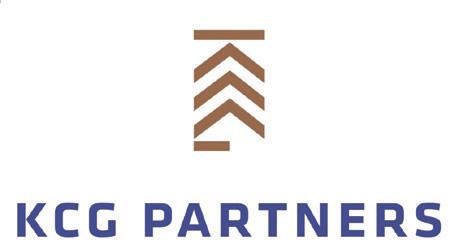

Schönherr Rechtsanwälte GmbH Vienna 1950 15+4 country desks 2008
KPMG Legal / KPMG Law
solutions, data privacy
81 2006
889-2800 office@jalsovszky.com
Iván Dávid Sefer 1132 Budapest, Váci út 20. (1) 451-8100 law@hu.ey.com
Eszter Kamocsay-Berta 1052 Budapest, Türr István utca 9. (1) 301-3130 reception@kcgpartners.com info@kcgpartners.com
Dániel Gera 1133 Budapest, Váci út 76. (1) 870-0700 office.hungary@schoenherr.eu
Bálint Tóásó 1134 Budapest, Váci út 31. (1) 887-7100 info@kpmg.hu 17 bnt ÜGYVÉDI IRODA www.bnt.eu
bpv JÁDI NÉMETH ÜGYVÉDI IRODA www.bpv-jadi.com

13 2003
bpv LEGAL, bpv BRAUN PARTNERS, bpv GRIGORESCU STEFANICA, bpv HUEGEL Vienna, Brussels, Prague, Bratislava, Bucharest 2007 8 2000
International Beijing, China 2001 83 1991

BÁN, S. SZABÓ, RAUSCH & PARTNERS ÜGYVÉDI IRODA www.bansszabo.hu

Eversheds Sutherland London (UK), Atlanta (USA) 1988 (UK), 1924 (USA) 70+ 1987/ 1999
IBLC (International Business Law Consortium) Salzburg
Éva Ratatics, Rainer Tom 1143 Budapest, Stefánia út 101–103. (1) 413-3400 info.hu@bnt.eu
Andrea Jádi Németh 1051 Budapest, Szent István tér 11. (1) 429-4000 budapest@bpv-jadi.com
Balázs Karsai
1126 Budapest, Ugocsa utca 4/B (1) 487-8700 budapest_office@nt.hu
Ágnes Szent-Ivány
1037 Budapest, Montevideo utca 10. (1) 394-3121 office@ eversheds-sutherland.hu
János Rausch
1051 Budapest, József nádor tér 5–6. (1) 266-3522 office@bansszabo.hu
3 Special Report | 33 www.bbj.hu Budapest Business Journal | May 31 – June 13, 2024 RANK COMPANY WEBSITE NO. OF ATTORNEYS WITH LICENSE TO PRACTICE IN HUNGARY ON MAY 2, 2024 NO. OF TRAINEES IN HUNGARY ON MAY 2, 2024 NO. OF PARTNERS OF HUNGARIAN OFFICE ON MAY 2, 2024 LEGAL SPECIALITY AREAS NAME OF ASSOCIATE NON-HUNGARIAN LAW FIRM OR COOPERATION NETWORK WORLD HQ YEAR ESTABLISHED NO. OF OFFICES WORLDWIDE YEAR HUNGARIAN OFFICE ESTABLISHED TOP LOCAL EXECUTIVE ADDRESS PHONE EMAIL COMMERCIAL REAL ESTATE TAX BANKING AND FINANCE ENERGY COMPETITION EU EMPLOYMENT TMT ENVIRONMENT PROTECTION CORPORATE / M&A DISPUTE RESOLUTION INTELLECTUAL PROPERTY PUBLIC PROCUREMENT LIFE SCIENCES OTHER 13 JALSOVSZKY www.jalsovszky.com 22 12 4 ✓ ✓ ✓ ✓ ✓ – – ✓ – – ✓ ✓ ✓ – – –International Lawyers Network Westwood, USA 1988 91 2005 Pál Jalsovszky 1124 Budapest, Csörsz utca 41. (1)
14 VÁMOSI-NAGY ERNST & YOUNG ÜGYVÉDI IRODA www.eylaw.hu 20 17 3 ✓ ✓ ✓ ✓ – ✓ – ✓ – – ✓ – – – – –Ernst & Young Law GmbH Stuttgart, Germany 2002
2010
90
15 KCG PARTNERS ÜGYVÉDI TÁRSULÁS www.kcgpartners.com 19 9 5 ✓ ✓ ✓ ✓ ✓ ✓ ✓ ✓ ✓ ✓ ✓ ✓ ✓ ✓ ✓ MRP/ESOP, ESG, data privacy Ally Law London 1990 80 2014
15 SCHÖNHERR HETÉNYI ÜGYVÉDI
19 9 4 ✓ ✓ – ✓ ✓ ✓ ✓ ✓ ✓ ✓ ✓ ✓ ✓ ✓ ✓ Compliance, white collar crime, regulatory, data protection, insolvency and restructuring, insurance
IRODA www.schoenherr.eu
16 KPMG LEGAL TÓÁSÓ ÜGYVÉDI IRODA
18 10 3 ✓ ✓ – ✓ – ✓ ✓ ✓ – ✓ ✓ ✓ ✓ – ✓ Joint venture dispute resolution, compliance, bankruptcy and liquidation procedures, solving complex problems, legal application of innovative technology
https://kpmg.com/hu/hu/home/ services/tax/legal-services.html
––
16 – 9 ✓ ✓ – ✓ ✓ – ✓ ✓ – ✓ ✓ ✓ ✓ ✓ ✓
––
Data processing & privacy, compliance, immigration law, insolvency and restructuring bnt
18
15 4 5 ✓ ✓ ✓ ✓ ✓ ✓ ✓ ✓ ✓ ✓ ✓ ✓ ✓ ✓ ✓
private wealth,
finance
Data protection,
project
18 NAGY ÉS TRÓCSÁNYI ÜGYVÉDI IRODA www.nt.hu 15 3 6 ✓ ✓ ✓ ✓ ✓ ✓ ✓ ✓ ✓ ✓ ✓ ✓ ✓ ✓ ✓ –Yingke
18
KOMÁROMI EVERSHEDS SUTHERLAND
www.eversheds-sutherland.hu 15 3 8 ✓ ✓ ✓ ✓ ✓ ✓ ✓ ✓ ✓ ✓ ✓ ✓ ✓ ✓ ✓ Immigration,
regulatory compliance,
law, ESG
SÁNDOR SZEGEDI SZENT-IVÁNY
ÜGYVÉDI IRODA
data protection,
administrative
19
14 2 9 ✓ ✓ – ✓ ✓ ✓ ✓ ✓ ✓ ✓ ✓ ✓ ✓ ✓ ✓ –
1998 86 1997


94 1992
Kornélia Nagy-Koppány László Lencs
1011 Budapest, Hunyadi János út 20. (1) 302-9050 knplaw@knplaw.com
Katalin Szamosi 1062 Budapest, Andrássy út 113. (1) 461-1000 mailbox@sbgk.hu
Balázs Lohn 1053 Budapest, Károlyi utca 12. (1) 999-1233 info@lohn.hu
Erika Tomori 1056 Budapest, Váci utca 81. (1) 327-7560 postmaster@gmtlegal.hu
9 2005
Csaba Polgár 1011 Budapest, Szilágyi Dezső tér 1. (1) 799-8330 admin@hunlaw.hu
Bálint Szűcs 1139 Budapest, Lomb utca 30–32. (1) 576-1234 info@rsmlegal.hu
Sándor Sárközy, Stefan Sieferer 1062 Budapest, Andrássy út 121. (1) 814-9880 budapest@roedl.com

Miklós Kádár 1123 Budapest, Alkotás utca 55–61. (1) 429-6000 MarketingBDCommsHungary@aoshearman.com
József Kapolyi 1051 Budapest, József nádor tér 5–6. (1) 267-3975 info@kapolyi.com
34 | 3 Special Report www.bbj.hu Budapest Business Journal | May 31 – June 13, 2024 RANK COMPANY WEBSITE NO. OF ATTORNEYS WITH LICENSE TO PRACTICE IN HUNGARY ON MAY 2, 2024 NO. OF TRAINEES IN HUNGARY ON MAY 2, 2024 NO. OF PARTNERS OF HUNGARIAN OFFICE ON MAY 2, 2024 LEGAL SPECIALITY AREAS NAME OF ASSOCIATE NON-HUNGARIAN LAW FIRM OR COOPERATION NETWORK WORLD HQ YEAR ESTABLISHED NO. OF OFFICES WORLDWIDE YEAR HUNGARIAN OFFICE ESTABLISHED TOP LOCAL EXECUTIVE ADDRESS PHONE EMAIL COMMERCIAL REAL ESTATE TAX BANKING AND FINANCE ENERGY COMPETITION EU EMPLOYMENT TMT ENVIRONMENT PROTECTION CORPORATE / M&A DISPUTE RESOLUTION INTELLECTUAL PROPERTY PUBLIC PROCUREMENT LIFE SCIENCES OTHER 19 BSLAW BUDAPEST – SZUCHY ÜGYVÉDI IRODA www.bslaw.hu 14 3 2 ✓ ✓ – – ✓ ✓ ✓ ✓ ✓ ✓ ✓ ✓ ✓ ✓ – –BSLAW Brussels Brussels 2021 2 A Róbert
1054 Budapest,
8.
700-1035 office@bslaw.hu 19 KNP LAW NAGY-KOPPÁNY ÉS LENCS ÜGYVÉDI IRODA www.knplaw.com 14 6 5 ✓ ✓ ✓ ✓ ✓ ✓ ✓ ✓ ✓ ✓ ✓ ✓ – – –Pharmaceutical law, data protection and privacy, cyber security, crypto currency law and regulations Conference Bleue / Global Business Lawyers Alliance Brussels / Paris 1996/2016 28 / 39 2007
Szuchy
Aulich utca
(1)
19 SBGK ÜGYVÉDI IRODA www.sbgk.hu 14 6 12 ✓ ✓ – ✓ – ✓ ✓ ✓ ✓ – ✓ ✓ ✓ ✓ ✓ Data protection AIPEX the Netherlands 2010 A 1969
19 LOHN ÜGYVÉDI IRODA www.lohn.hu 14 8 4 ✓ ✓ ✓ ✓ ✓ ✓ ✓ ✓ ✓ ✓ ✓ ✓ ✓ ✓ ✓ Forensic, white collar crime. hotels&leisure, solar projects, industrial property, zoning, data protection, sports and arbitration World Link for Law Zurich 1989
2008
80
20 GÁRDOS MOSONYI TOMORI ÜGYVÉDI IRODA www.gmtlegal.hu 12 2 8 ✓ ✓ – ✓ ✓ ✓ ✓ ✓ – – ✓ ✓ ✓ – –Insurance law, transportation law, capital markets ADVOC London 1990
20 PONTES BUDAPEST
IRODA www.ponteslegal.hu 12 3 2 ✓ ✓ – ✓ ✓ ✓ ✓ ✓ ✓ ✓ ✓ ✓ ✓ ✓ – –PONTES:
–2005
ÜGYVÉDI
The CEE lawyers
20 RSM | SZŰCS & PARTNERS ATTORNEYS AT LAW www.rsmlegal.hu/hu 12 3 4 ✓ ✓ ✓ ✓ ✓ ✓ – ✓ ✓ ✓ ✓ ✓ ✓ – – Wealth planning RSM Legal Group London 2018
17 2006
20 SÁRKÖZY RÖDL & PARTNER ÜGYVÉDI IRODA, RÖDL & PARTNER ÜGYVÉDI TÁRSULÁS www.roedl.de 12 3 2 ✓ ✓ ✓ ✓ ✓ ✓ ✓ ✓ ✓ ✓ ✓ ✓ ✓ – –Compliance, data protection, IT, greenfield investments, corporate acquisition Rödl & Partner GbR Wirtschaftsprüfer, Steuerberater, Rechtsanwälte Nuremberg 1977 110 1992
21 A&O SHEARMAN KÁDÁR ÜGYVÉDI IRODA www.aoshearman.com 11 4 1 ✓ ✓ – ✓ ✓ ✓ ✓ ✓ ✓ – ✓ ✓ ✓ ✓ ✓ International capital markets, regulatory, English law banking and finance A&O Shearman London 2024
1993
48
21 KAPOLYI LAW FIRM www.kapolyi.com 11 4 3 ✓ ✓ ✓ ✓ ✓ ✓ ✓ ✓ – – ✓ ✓ ✓ – –Capital markets, global immigration and mobility, law of information technology, data protection My Legal Network Warsaw 2021 5 1999

22 FORGÓ, DAMJANOVIC ÉS TÁRSAI ÜGYVÉDI IRODA www.fdlaw.hu
22
20 2014 Attila Fest
1054 Budapest, Báthory utca 8. 1/6 (1) 791-7060 office@festandpartner.hu
The Harmonie Group, World IT Lawyers, ICC FraudNet Minneapolis, USA (The Harmonie Group) 1992
92 (The Harmonie Group) 2000
Conybeare Solicitors, Gowling WLG, Berwin Leighton Paisner London 1997/2016/ 2001 1/20/31 2008
Hogan Lovells International LLP London, Washington Legacy Lovells: 1899 / Legacy Hogan & Hartson: 1904
48 2006
Zoltán Forgó, Gábor Damjanovic 1123 Budapest, Alkotás utca 17–19. (1) 214-0080 office@fdlaw.hu
László Hajdu 1013 Budapest, Pauler utca 11. (1) 799-8230 office@hplegal.eu
László Partos jnr. 1051 Budapest, Vörösmarty tér 7/8. (1) 505-4480 office@hoganlovellls.co.hu 23 act BÁN & PARTNERS www.banpartners.hu

ÜGYVÉDI IRODA www.dessewffy.com

12 2010
13 1992
Gergely Bán 1117 Budapest, Alíz utca 1. A ép. 5. em. (1) 501-5360 budapest@actlegal-bk.com
Alice Dessewffy 1125 Budapest, Lóránt út 1/B (70) 558-8720 budapest@ceeattorneys.com 24 BPSS ÜGYVÉDI IRODA www.bpss.hu
Gergely Szikla
1013 Budapest, Pauler utca 11. (1) 354-4300 office@bpss.hu
Levente Antal Szabó 1026 Budapest, Kapás utca 6.12/B épület 4. emelet (1) 796-3600 budapest.office@leitnerlaw.eu
Ádám Illés, József Németh 1052 Budapest, Galamb utca 3. (1) 792-6744 office@visegradlegal.hu
3 Special Report | 35 www.bbj.hu Budapest Business Journal | May 31 – June 13, 2024 RANK COMPANY WEBSITE NO. OF ATTORNEYS WITH LICENSE TO PRACTICE IN HUNGARY ON MAY 2, 2024 NO. OF TRAINEES IN HUNGARY ON MAY 2, 2024 NO. OF PARTNERS OF HUNGARIAN OFFICE ON MAY 2, 2024 LEGAL SPECIALITY AREAS NAME OF ASSOCIATE NON-HUNGARIAN LAW FIRM OR COOPERATION NETWORK WORLD HQ YEAR ESTABLISHED NO. OF OFFICES WORLDWIDE YEAR HUNGARIAN OFFICE ESTABLISHED TOP LOCAL EXECUTIVE ADDRESS PHONE EMAIL COMMERCIAL REAL ESTATE TAX BANKING AND FINANCE ENERGY COMPETITION EU EMPLOYMENT TMT ENVIRONMENT PROTECTION CORPORATE / M&A DISPUTE RESOLUTION INTELLECTUAL PROPERTY PUBLIC PROCUREMENT LIFE SCIENCES OTHER 21 LFB - LÁSZLÓ FEKETE BAGAMÉRY www.lfblegal.hu 11 1 3 – – ✓ – – – – – – – ✓ ✓ – – – –Globalaw UK 1994 130 2018 András Dániel László 1065 Budapest, Nagymező utca 7. (1) 616-5655 info@lfblegal.hu Tax Corporate / M&A Dispute resolution The power of specialization lfblegal.hu 22 FEST ÉS TÁRSA ÜGYVÉDI IRODA www.festandpartner.hu 9 2 2 ✓ ✓ – ✓ ✓ ✓ ✓ ✓ ✓ ✓ ✓ ✓ ✓ ✓ ✓ Aviation law, data protection, compliance, consumer protection, immigration law LUTHER Rechtsanwaltsgesellschaft
Cologne 1992
mbH
9 4 6 ✓ ✓ – ✓ ✓ ✓ ✓ ✓ ✓ – ✓ ✓ ✓ – ✓ –
HP LEGAL
HAJDU & PARTNERS | LAW FIRM
9 2 3 ✓ ✓ – ✓ – – ✓ ✓ – – ✓ ✓ – ✓ – –
|
www.hplegal.eu
22 PARTOS & NOBLET ÜGYVÉDI IRODA www.hoganlovells.com 9 6 4 ✓ ✓ – ✓ ✓ ✓ ✓ ✓ ✓ ✓ ✓ ✓ ✓ ✓ ✓ Capital markets, data protection, compliance
8 3 2 ✓ ✓ – – ✓ ✓ ✓ ✓ ✓ – ✓ ✓ ✓ – –ESG, data protection and GDPR, compliance act legal Frankfurt 2017
23 DESSEWFFY, DÁVID, FELSMANN VALAMINT
ATTORNEYS
8 – 3 ✓ ✓ ✓ – ✓ ✓ – ✓ – – ✓ ✓ ✓ ✓ –Data protection & GDPR, transportation law, E-commerce, family law, public law CEE Attorneys Prague 2015
TÁRSAIK CEE
7 – 7 ✓ ✓ ✓ ✓ ✓ ✓ ✓ ✓ – – ✓ ✓ ✓ – –Bankruptcy, telecommunication, sports, pharma and health Norton Rose Fulbright LLP London 1794 More than 50 1989
25 LEITNERLAW SZABÓ ÉS TÁRSAI ÜGYVÉDI IRODA www.leitnerlaw.hu 6 5 2 ✓ ✓ ✓ ✓ – ✓ – ✓ – – ✓ ✓ ✓ – – –LeitnerLaw Vienna and Linz 2017 7 2014
25 VISEGRAD LEGAL ILLÉS & NÉMETH ÜGYVÉDI TÁRSULÁS www.visegradlegal.hu 6 1 2 ✓ ✓ ✓ – – ✓ ✓ ✓ ✓ – ✓ ✓ ✓ – ✓ GDPR, immigration Visegrad + Legal Budapest 2017 9 2017
Cooperation Leusden, the Netherlands 2013 18 2013
Tibor Bihary 1121 Budapest, Zugligeti út 3. (1) 391-4491 office@biharybalassa.hu
Anna Katalin Papp 1133 Budapest, Váci út 76. (1) 300-9307 info@clvpartners.com
Zsolt Lajer 1024 Budapest, Lövőház utca 30. (1) 354-3640 titkarsag@lajer.net
Csaba Nyiri 1126 Budapest, Kiss János altábornagy utca 11. (1) 397-7447 info@nyirilaw.hu
Zoltán Rácz
32 2008
immigration services Cyrus Ross Bodegraven, the Netherlands 1992 17 2015

/ WIRAS Verbund International / European Employment Lawyers Association (EELA), DACH_RA, EUROPÄISCHE ANWALTSVEREINIGUNG e.V.
2010 / 1989 / 1996 / 1989
1,000+ /197/A 2003
1051 Budapest, Arany János utca 16. (1) 792-2274 office@raczlawfirm.hu
Levente Rövid 1055 Budapest, Honvéd utca 18. (1) 700-4750 hello@rvdpartners.com
Jesszika Udvari 1016 Budapest, Szirtes út 6/B (30) 868-1297 office@bud-legal.hu
Levente Lajos 1056 Budapest, Váci utca 81. (1) 331-6171 office@llf.hu

Tamás Halmos 1037 Budapest, Montevideo utca 9. (20) 316-6750 legal@niveus.hu
36 | 3 Special Report www.bbj.hu Budapest Business Journal | May 31 – June 13, 2024 RANK COMPANY WEBSITE NO. OF ATTORNEYS WITH LICENSE TO PRACTICE IN HUNGARY ON MAY 2, 2024 NO. OF TRAINEES IN HUNGARY ON MAY 2, 2024 NO. OF PARTNERS OF HUNGARIAN OFFICE ON MAY 2, 2024 LEGAL SPECIALITY AREAS NAME OF ASSOCIATE NON-HUNGARIAN LAW FIRM OR COOPERATION NETWORK WORLD HQ YEAR ESTABLISHED NO. OF OFFICES WORLDWIDE YEAR HUNGARIAN OFFICE ESTABLISHED TOP LOCAL EXECUTIVE ADDRESS PHONE EMAIL COMMERCIAL REAL ESTATE TAX BANKING AND FINANCE ENERGY COMPETITION EU EMPLOYMENT TMT ENVIRONMENT PROTECTION CORPORATE / M&A DISPUTE RESOLUTION INTELLECTUAL PROPERTY PUBLIC PROCUREMENT LIFE SCIENCES OTHER 26 BIHARY BALASSA ÜGYVÉDI IRODA www.biharybalassa.hu 5 – 5 ✓ ✓ – ✓ – ✓ ✓ ✓ – – ✓ ✓ – ✓ – –TELFA (Trans European Law Firms Alliance) Brussels 1990 25 2002
26 CLV PARTNERS
ÉS PAPP
5 – 2 ✓ – – – – ✓ – ✓ – – ✓ – ✓ – ✓ –Alfa International Chicago 1980
CSABAI
ÜGYVÉDI IRODA www.clvpartners.com
140 2003
26 LAJER LEGAL
LAJER
5 1 1 ✓ ✓ – ✓ – – ✓ ✓ – – ✓ ✓ – – –Data Protection, insolvency, tort law Euconnex Hamburg 2009
/
ÜGYVÉDI IRODA www.lajer.net
10 1997
26 NYIRI ÜGYVÉDI IRODA www.nyirilaw.hu 5 3 1 ✓ ✓ ✓ ✓ ✓ – – ✓ – – ✓ ✓ ✓ ✓ – –Lawyers
26 RÁCZ LAW FIRM
1 ✓ ✓ – ✓ ✓ ✓ – ✓ ✓ ✓ ✓ ✓ ✓ – ✓
www.raczlawfirm.hu 5 1
Joint ventures and private equity, fintech, insurance law, data protection & GDPR, restructuring and insolvency LEInterrnational London 1997
26 RVD PARTNERS
DR.
5
4 ✓ ✓ – – ✓ ✓ ✓ ✓ ✓ ✓ ✓ ✓ ✓ – –
-
RÖVID ÜGYVÉDI IRODA www.rvdpartners.com
1
State aid,
27 budlegal ÜGYVÉDI TÁRSULÁS www.bud-legal.hu 4 1 4 ✓ ✓ ✓ – – ✓ ✓ ✓ – – ✓ ✓ ✓ – –ESG advising, data protection, inheritance law, whistleblowing IR
–
Global
27 LAJOS ÜGYVÉDI IRODA www.studiolegale.hu 4 2 4 ✓ ✓ ✓ – – ✓ ✓ ✓ – – ✓ ✓ ✓ – –Agricultural law, administrative law, civil law, bankruptcy law, criminal law BGS - Berkeley Global Society –2021 –
1997
28 NIVEUS LEGAL | HALMOS ÉS JÁNOSI ÜGYVÉDI IRODA www.niveuslegal.hu 3 – 2 ✓ ✓ ✓ – – – – ✓ – – ✓ ✓ ✓ ✓ –Data protection and privacy, insolvency and restructuring, trust structuring DFK International London 1962 208 2023
A = would not disclose, NR = not ranked, NA = not appliacable This list was compiled from responses to questionnaires received by May 29, 2024, and publicly available data. To the best of the Budapest Business Journal’s knowledge, the information is accurate as of press time. The list is based on companies’ voluntary data submissions. While every effort is made to ensure accuracy and thoroughness, omissions and typographical errors may occur. Additions or corrections to the list should be sent on letterhead to the research department, Budapest Business Journal, 1075 Budapest, Madách Imre út 13–14, or faxed to (1) 398-0345. The research department can be contacted at research@bbj.hu NOTE: (1) Dentons (formerly Salans) has been present in Hungary since 2006.
4 Socialite
Hungarian Photographers in America at the Museum of Fine Arts
If you’re interested in Hungarian photography, you’ll probably be familiar with the names of André Kertész or Robert Capa. But you may not have heard of Anna Barna, László Kondor, György Lőrinczy, Nickolas Muray or André de Dienes. These are some of the more than 30 photographers whose work is featured in the “Hungarian Photographers in America (1914-1989)” exhibition at Budapest’s Museum of Fine Arts.
DAVID HOLZER
Covering the period from the beginning of World War I to the collapse of the Soviet Union, the exhibition displays more than 170 works by 32 Hungarian émigré photographers who settled in America. Famous or obscure, all helped advance the genres in which they worked.
I’ve yet to figure out why so many great 20th-century photographers are Hungarian. With tongue hopefully firmly in cheek, Capa said, “It is not enough to have talent; you also have to be a Hungarian.”
(The Budapest-born British movie mogul Sir Alexander Korda is said to have put a twist on this, saying: “It is not enough to be Hungarian; you also have to have talent.”)
While it can’t hurt to be reminded of Capa’s greatness, it’s the lesserknown figures who intrigue the most, for their remarkable lives as much as their work. In some cases, we know a fair amount about a photographer; in others, very little.

Not much is known about pioneering woman photographer Anna Barna, for example. Born in 1901, she arrived in Paris from Budapest in the 1930s.
In the French capital, she worked as a reporter and photographer.
Barna met the great André Kertész, who had moved to Paris in 1925, and they became friends. Fearing the coming storm, Kertész and his wife Elizabeth emigrated to New York in 1936. Nothing is known of how Barna survived after the Germans invaded Paris in 1940. In 1946, she, too, sailed to New York on a stateless person’s visa, which she had acquired in Zurich.
Box of Photos
According to the Magyar Fotográfiai Múzeum, Barna was murdered in New York, and a box of her photographs and a document ended up in Kertész’s possession. If that hadn’t turned up,
György Lőrinczy, born in Budapest in 1935, began his career in Hungary. Around 1958, he discovered American magazines and fell in love with the realism of the photography, which he preferred to the more aesthetic European approach. Invited to visit New York with his wife in 1968, Lőrinczy made an album of what he modestly called “snapshot” photos of a New York that captivated him. In 1973, the couple moved permanently to the city they’d fallen in love with. I’d got it into my head that Hungarian photographers only made art, war or reportage photography, so it was a revelation to discover the work of Nikolas Muray, born the humble Miklós Mandl in Szeged in 1892.
The Fencing Photographer
Muray sailed for New York in 1913. By 1926, he was working for “Vanity Fair” and photographing the celebrities of the day. Between 1920 and 1940, he made more than 10,000 portraits. These include several of the Mexican painter Frida Kahlo, his lover throughout the 1930s. Close your eyes and conjure up Kahlo, and you may well be recalling one of Muray’s intensely colorful photos. Because Muray was also a champion fencer who competed for the United States in the 1928 and 1932 Summer Olympics and won over 60 medals throughout his life, I’d like to think he cut a dashing figure. In 1965, aged 73, he died of a heart attack while fencing at the New York Athletic Club. A somewhat more glamorous way to go than taking photos. André de Dienes was another Hungarian photographer linked to a female icon. He was born Andor György IkafalviDienes in Târgu Secuiesc, Romania, in
1913.
it’s doubtful that anything would have been known of Barna. Her somewhat spooky photographs of dolls and doll parts dating from her time in Paris in the 1930s are impressive.
Primarily a reportage photographer, László Kondor escaped Hungary after the 1956 Uprising, arriving in Chicago in
1961.
At the University of Chicago, he trained as a political scientist before becoming a photographer in the mid-’60s. Kondor is best known for his photographs of the Vietnam War. Wearing a uniform and carrying a gun, he embodied another of Capa’s dictums: “If your pictures aren’t good enough, you’re not close enough.” Unlike other photographers who worked for services such as Reuters or the Associated Press, Korda was able to take his time and get the shot. His “Old Man in Quang Ngai Market, 1969” is incredibly evocative of the impact of war on the Vietnamese people.
In 1928, after his mother’s suicide, he journeyed across Europe, mostly on foot, to Tunisia, where he bought his first camera. Why Tunisia, nobody knows. In any case, he traveled to Paris in 1933 to study art. After working as a fashion photographer in Paris for a time, in 1938, Dienes’ work was spotted by legendary “Esquire” magazine editor Arnold Gingrich, who paid for his passage to the States. Dienes also went on to work for “Vogue” and “Life.” Tiring of life as a fashion photographer, Dienes moved to California in 1944 and began specializing in landscapes and nudes. He first photographed Marilyn Monroe in 1945 when she was 19 and would shoot her twice more in the 1950s. He last saw her in 1961 when, he said, she was “Smiling, radiant – utterly misleading. I little guessed that this was our last goodbye.”
In 2002, art publishers Taschen published an 848 two-volume collection of photos of Monroe by Dienes.
Hungarian Photographers in America (1914–1989) is curated by Alex Nyerges, director of the Virginia Museum of Fine Arts, and Péter Baki, director of the Museum of Hungarian Photography, and runs until Aug. 25 at the Museum of Fine Arts.
www.bbj.hu Budapest Business Journal | May 31 – June 13, 2024
Marilyn Monroe 1949, Photo © Virginia Museum of Fine Arts, Richmond, Diénes Andor / André De Dienes (1913–1985)
The Dual-Voiced Singer and the Crossover Folk Dance Troupe
The renowned Filipino singer Marcelito Pomoy, known as the “dual-voiced genius,” has made his debut performance in Hungary with a genre-crossing show.
agreed to work on his upcoming albums. Notably, a Hungarian businessman manages the singer’s career.
The Ultimate Show, featuring world hits, a unique visual spectacle, and choreography, took place on May 24 at the Tüskecsarnok indoor arena in District XI. The event included international guest stars and the crossover folk dance troupe, Urban Verbunk. The show also featured reimagined renditions of songs from “The Phantom of the Opera” musical, complete with new choreography. Pomoy is a unique talent, apparently effortlessly able to switch between a deep male baritone and a high mezzo-soprano within a single song. He captivated the judges of “America’s Got Talent” by performing both parts of a duet from “Beauty and the Beast.”
A Filipino singer who rose from extreme poverty to stardom, Pomoy now has millions of followers, and Andrea Bocelli’s music producer has
“I started singing in a female voice on a poultry farm. I would sing while spraying the chicken coop,” recalled the now-global star. Reflecting on his singing career, he said, “I entered a talent show but didn’t succeed there. However, I didn’t give up and eventually won the second season of ‘Pilipinas Got Talent.’ I performed ‘The Prayer’ by Céline Dion and Andrea Bocelli, and the audience, along with all three judges, gave me a standing ovation. It was the first time in my life I saw all my family members together and whole.”
In September 2018, he performed at the Wish 107.5 radio station, catching the attention of American TV host Ellen DeGeneres, who invited him on to “The Ellen Show,” granting him international attention. He later competed in “America’s Got Talent: The Champions,” where he finished fourth. The momentum
Culture Matters
A regular look at culture issues in Hungary and the region

of his career was temporarily halted by COVID, but post-pandemic, he resumed performing worldwide, from America to Asia and the Middle East.
“In 2023, I was approached by BRICS Entertainment management and booking company, with which I signed a comprehensive management contract. Roland Horváth, the company’s owner, saw great potential in my
St. George Party Raises HUF 1 mln for UNICEF
The third celebration of St. George organized by XpatLoop.com attracted a full house to the Premium Level at Etele Cinema on Wednesday, April 24, raising nearly HUF 1 million to help needy children, according to the count by UNICEF Hungary.









































 BBJ STAFF
BBJ STAFF
“Thank you ever so much for supporting UNICEF’s work for children through this wonderful event! It was great being part of the evening, and we’re very grateful for all the funds raised,” Antónia Mészáros, executive director of UNICEF Hungary, told guests.
The annual fundraiser brought together expats and locals from Hungary’s business, diplomatic and cultural circles, including










































several ambassadors, the country director of the British Council, and several top people from the British Embassy.
An extensive cheese and wine tasting reception included English and local cheeses paired with wine from St George Hill near Balaton, along with whites, rosés and reds from other regions around the country.
After a welcome from MC Peter Linka that included a Shakespeare recital (St. George’s Day was both the birthday and the date of death of the playwright),



































talent, having worked with Andrea Bocelli on several projects, and secured a three-album deal with Bocelli’s producer Pierpaolo Guerrini. The first album will be released in 2024.”
Setting the tone for the Ultimate Show is Urban Verbunk, a group that combines Hungarian folk dance traditions with acrobatic elements. The group blends their progressive, unique dance technique with a dynamic stage presentation.
The show will also feature violinist Petar Markoski, known for his renditions of classical, pop, and rock music, covering artists such as Frank Sinatra, Elvis Presley, and Ed Sheeran, and opera singer Elina Nechayeva, who represented Estonia at the 2018 Eurovision Song Contest in Lisbon.
“The reinterpretation of Webber’s music is thanks to Andrea Bocelli’s music producer, Pierpaolo Guerrini, who will also produce Marcelito’s upcoming albums,” explained Horváth, head of Koncertpromo, the organizer of the Ultimate Show. “In the recently released video, Elina Nechayeva sings, Pierpaolo plays the piano, and Petar Markoski plays the violin, while Urban Verbunk has created a choreography. We will see this production live in May,” added Horváth, speaking at the dress rehearsal.
Matthew Kirlew, head of policy at the British Embassy, highlighted the international background of the patron saint of England (and many other places), who is known as Szent György in Hungarian.
Next, Mészáros talked about the work and challenges the United Nations Children’s Fund faces, highlighting that it relies on donations. As usual, TV star Zsuzsa Demcsák hosted the live charity auction, with all funds raised going to UNICEF.
The evening also included a VIP screening of the Amy Winehouse biopic “Back to Black” and later dancing to popular English music.








































38 | 4 Socialite www.bbj.hu Budapest Business Journal | May 31 – June 13, 2024
GERGELY HERPAI
NOW OPEN KOMPLEX I BUDAPEST
utca 26. www. theworldofbanksy .hu BOOK NOW: ADVERTISEMENT
Király
Filipino singer Marcelito Pomoy’s debut show in Hungary was a great success, the organizers say.
Chamber of Commerce Corner
Canadian Chamber of Commerce in Hungary (CCCH)

The CCCH celebrated a successful Canadian BBQ event at the ÖbölHáz at Kopaszi-gát on May 29. The event provided a delightful fusion of Canadian flavors and Hungarian hospitality, all within a stunning outdoor setting by the Danube. The evening featured an array of traditional Canadian dishes, showcasing the country’s rich culinary heritage. Attendees included notable business people from various sectors across Hungary, making it an excellent opportunity for networking and fostering business relations in a casual yet professional atmosphere. This event is part of the CCCH’s ongoing efforts to promote cultural exchange and business collaboration between the two countries.
British Chamber of Commerce in Hungary (BCCH)
The BCCH invites guests to the fourth CEO Dinner of the year on June 11 at the Párisi Udvar with Julianna Kulczycki, country head at BP. The firm is a long-standing chamber member. During the event, guests will enjoy a luxurious three-course dinner with wine and welcome drinks while hearing from one of the energy industry’s foremost professionals her views on recent developments and current industry affairs. Paul Fox, British Ambassador to Hungary and BCCH chairman Duncan Graham will give opening remarks at the event. • When: June 11, 6-8 p.m. • Where: Párisi Udvar Hotel, Petőfi Sándor u. 2-4, 1052 Budapest • Fee: Members HUF 28,000 (plus VAT); non-members HUF 38,000 (plus VAT)
German Hungarian Chamber of Industry and Commerce (DUIHK)
The DUIHK held its annual meeting on May 16, this time at the HQ of Deutsche Telekom TSI Hungary Kft., thanks to the hospitality of managing director László Kónya! DUIHK president András Sávos gave an overview of the external environment in which the chamber and its member companies operate. The reports of the various committees were then presented. Managing director Barbara Zollmann presented the report of the executive board, Roland Felkai, president of the supervisory board, presented his assessment, and Gyöngyi Ferencz gave the report of the auditing company. Treasurer Armin Krug explained the financial results. The results of the elections, which had taken place electronically prior to the AGM, were also announced. Radovan Jelasity, Robert Keszte, András Kozma and Nóra Rácz were elected members of the executive board, and Mihály Jankovich was elected for a further term as a member of the supervisory board. Departing Board members Alfons Dintner, Gábor Katona and Thomas Narbeshuber were thanked for their service. The “Reliable Employer” award was presented for the eighth time at the meeting: this year, the expert jury honored 37 companies. Photos, a press release and more information can be found on the chamber website.
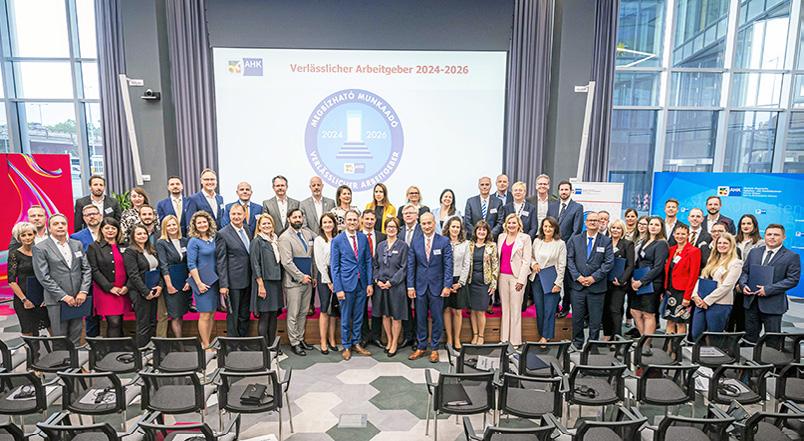
This regular section of the Budapest Business Journal features news and events from various international business chambers. For further information and to register for specific events, visit the organizing chamber’s website. If you have information for inclusion on this page, send an email in English to Annamária Bálint at annamaria.balint@bbj.hu
The CCIU invites guests to celebrate “The 4 Seasons: Italian Wine & Beverage,” a series of four events created in collaboration with Italian Excellence to enhance Italian food, wine and artistic culture. Each event highlights the peculiarities of one of the four designated regions. The first stage of this culinary journey, which highlighted Puglia, was held on April 18. The journey will continue on June 13, promoting the regions of Emilia Romagna, Lombardy and Veneto. Iconic dishes such as risotto
On May 22, Swisscham held its annual meeting at the Raiffeisen Bank HQ. Before the formal agenda, Swiss Ambassador JeanFrancois Paroz summarized Swiss-Hungarian diplomatic relations, the current situation and this year’s high-level state visits to Switzerland. Following the adoption of the annual reports for 2023, four new members of the board and one member of the supervisory board were elected to the 15-member panel: Miklós Andorka (Mapi), Gábor Briglovics (Alpiq Csepel Kft.), Tibor Kovács (Ringier Hungary), Colette Matz (Novartis Hungary), and Nóra Rácz (LeitnerLeitner).
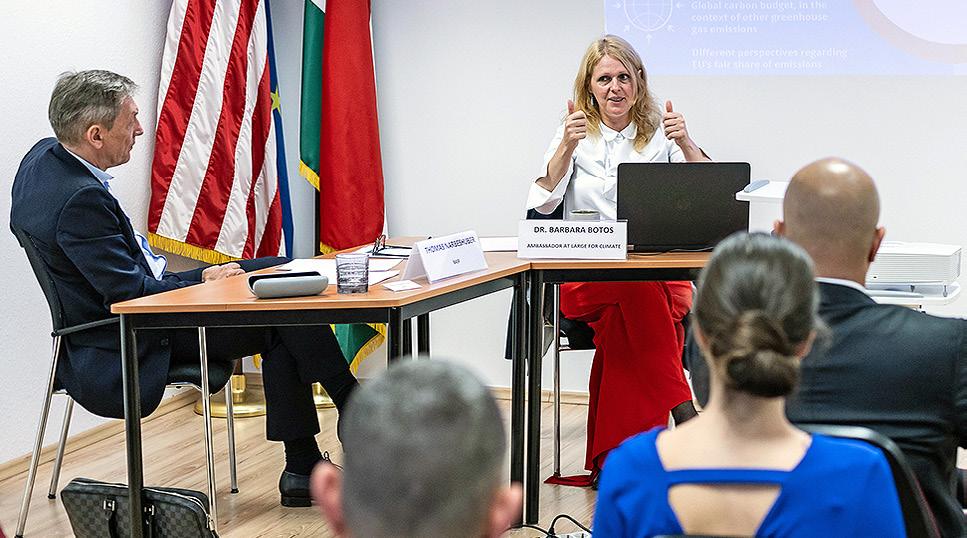
American Chamber of Commerce in Hungary (AmCham)
On May 17, AmCham Hungary hosted Barbara Botos, Hungary’s Ambassador-at-large for Climate, at a Policy Forum discussing recent global and European developments in climate policy. Botos started her presentation by introducing COP 28 results, emphasizing the importance of the crucial and collective pledge by the states to transition away from fossil fuels toward green investments. Additional critical points included the UAE consensus on the Global Stocktake (a comprehensive assessment of global progress towards climate goals) and new funding arrangements to respond to Loss and Damage, promoting nature-based solutions. She also addressed the central questions of the Carbon Border Adjustment Mechanism (CBAM) and EU regulation on deforestation. Regarding CBAM, she noted that we are now in the transitional phase, which will last until December 2025. This was designed to collect data and serve as a learning period for all stakeholders. Concerning the Antwerp Declaration for a European Industrial Deal, the ambassador stressed the need for complementary deals, confidence, and legal predictability. She also highlighted the importance of Europe remaining a continent of innovation. The discussion was hosted by Thomas Narbeshuber, vice president and head of Central & South East Europe for BASF and the chair of AmCham’s Sustainable Growth Committee.
allo zafferano, polenta, tortellini, piadine, bigoli and sardines in saor, are only a tiny part of the country’s gastronomic heritage. Typical products of Northern Italy, such as Parmigiano Reggiano, Parma ham and Lambrusco, Prosecco and Franciacorta wines, are symbols of craftsmanship that respect traditional production methods handed down through the generations.
• When: June 13, 7 p.m. • Where: Mixat Udvar, Krúdy Gy. utca 7, 1088 Budapest • Fee: Non-members HUF 12,000 (plus VAT)
Former board members Mária Szmodis, Balázs Bene, and László Deák were thanked for their service. The formal AGM was closed by a comprehensive economic presentation by Zoltán Török.
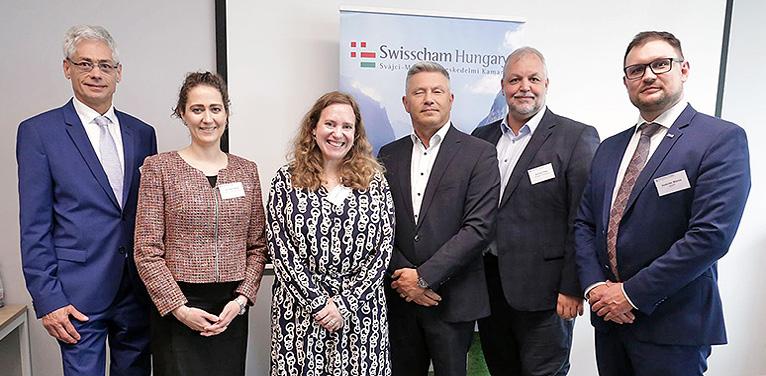
Hungarian-French Chamber of Commerce and Industry (CCIFH)
The CCIFH invites guests to celebrate “La vie en Rose” in a very French way at its garden party on Buda Hill, surrounded by nature, lanterns and chansons.
• When: Friday, June 14, 5- 10 p.m.
• Where: Normafa Síház, Eötvös út 59, Budapest 1121. • Fee: Members HUF 36,000 (+ VAT); non-members HUF 54,000 (+ VAT).
To take action and build solutions, first, we need to understand the problem. The CCIFH “Klimate Fresc” workshop is available to anyone within member organizations. The workshop animators are from Air France-KLM, Decathlon and Michelin, the professional event partners.
• When: Tuesday, June 4, 9 a.m.-1 p.m.
• Where: Milestone Intézet W17, Wesselényi u. 17, Budapest, 1077 • Fee: Members HUF 14,900 (+ VAT); non-members HUF 19,400 (+ VAT).
Belgian Business Club In Hungary (Belgabiz)
Belgabiz will hold its yearly Belgian Dinner this year at the W Hotel Budapest. This prominent event celebrates Belgian-Hungarian relations and the EU leadership transition in a glamorous ambiance as we bid farewell to Belgium’s tenure and welcome Hungary to the helm of the Presidency of the Council of the European Union. Besides the fine social and gastronomic experience with a Belgian touch, the evening promises excellent fun in an international surrounding with a tombola. Company tables are available. • When: Friday, June 14, 6-11 p.m.
• Where: W Hotel Budapest, Andrássy út 25, Budapest 1061 • Fee: Members HUF 55,000; non-members HUF 65,000.
4 Socialite | 39 www.bbj.hu Budapest Business Journal | May 31 – June 13, 2024
The Swiss-Hungarian Chamber of Commerce (Swisscham)
Italian Chamber of Commerce for Hungary (CCIU)







































 Dr. Róbert Szuchy Managing Partner
Dr. Róbert Szuchy Managing Partner




 Dr. Edina Nagy Lawyer, Director
Ügyvédi Iroda
Dr. Edina Nagy Lawyer, Director
Ügyvédi Iroda







 Ádám Lukonits
Virág Lőcsei Senior Associate Associate
Ádám Lukonits
Virág Lőcsei Senior Associate Associate







 Judit Budai Senior Partner
Szecskay Attorneys at Law
Judit Budai Senior Partner
Szecskay Attorneys at Law





































































 BBJ STAFF
BBJ STAFF























































































































